|
| Mostra collettiva “Identità” - Venezia 18. ottobre 2023, alle ore 18:00 |
|
Mostra collettiva “Identità”
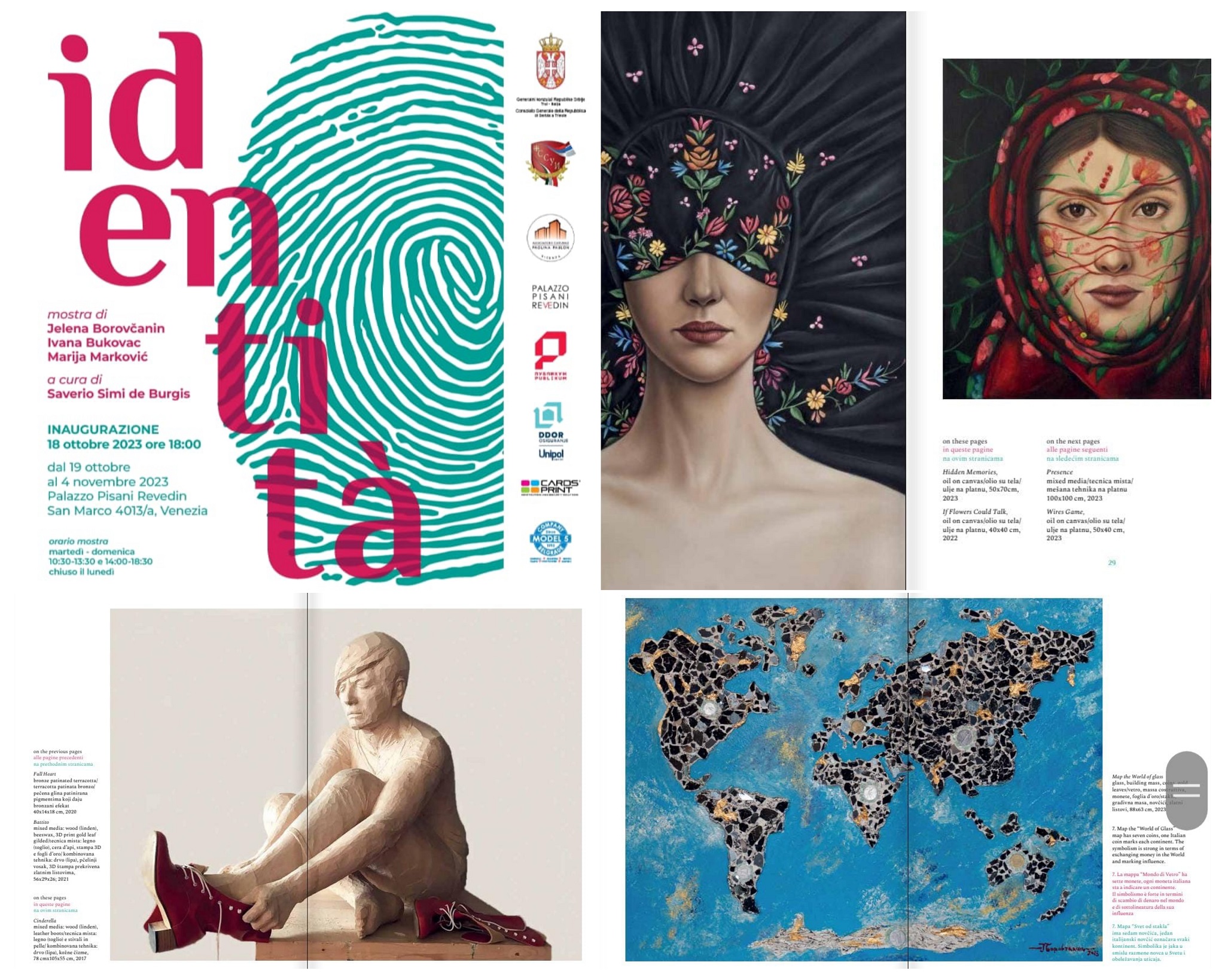
INAUGURAZIONE
18 ottobre 2023 ore 18.00
Palazzo Pisani Revedin
San Marco 4013/a, Venezia
La mostra è aperta dal mercoledì 19/10 fino al sabato 04/11/2023
Orari della mostra: Da martedì a domenica: 10.30 – 13.30 e 14.00 -18.30 Chiuso il lunedì – Ingresso libero
Si tratta di una mostra che ha come soggetto l’identità. Partecipano all’evento tre artiste che sono Jelena Borovčanin, Ivana Bukovac e Marija Marković, con la stessa origine di provenienza Serba ma con percorsi culturali e pertinenti le arti figurative, diversi.
Jelena Borovčanin più vicina all’utilizzo di materiali multimediali in tal senso più vicina alla decorazione, Ivana Bukovac con un linguaggio legato al segno e alla pittura, Marija Marković totalmente dedita alla ricerca scultorea. La mostra e il catalogo è a cura di Saverio Simi de Burgis.
La mostra è sostenuta di varie istituzioni, organizzazioni e sponsor. Il Consolato Generale della Repubblica di Serbia a Trieste, rappresentato dal Console Generale Ivana Stojiljković, ha gentilmente patrocinato questa mostra. Inoltre, l’Associazione Culturale “Paolina Paulon” di Vicenza ha riunito queste tre artiste eccezionali. L’Unione dei Serbi in Italia e diversi sponsor, tra cui Publikum doo, DDOR assicurazione-parte del Gruppo Unipol, Cards Print doo e Model 5, hanno generosamente contribuito a rendere questa mostra una realtà. |
|
|
| NUOVA PREMIÈRE PER L’ARTISTA SERBA A TRIESTE : Jadranka Jovanović nell’opera “Colloquio con il Tango” |
|

NUOVA PREMIÈRE PER L’ARTISTA SERBA A TRIESTE
Jadranka Jovanović nell’opera “Colloquio con il Tango”
In occasione del centenario dalla nascita del compositore italiano Raffaello de Banfield Tripcovich, nella première della rappresentazione della sua opera “Colloquio con il Tango”, è la primadonna del Teatro Nazionale dell’Opera di Belgrado, Jadranka Jovanović a interpretare il ruolo principale.
La rassegna musicale “RdB 100, Raffaello de Banfield” si articola nell’esecuzione di quattro concerti, una mostra e una tavola rotonda in onore del compositore a cui partecipa anche il soprano di fama mondiale, Raina Kabaivanska. Il momento centrale della celebrazione è la rappresentazione dell’opera “Colloquio con il Tango” con Jadranka Jovanović nel ruolo principale. Gli incassi degli ingressi per la première di “Colloquio con il Tango” del 1 giugno 2022 a Palazzo Mittelcult di Trieste, saranno devoluti agli anziani sostenuti dall’Associazione de Banfield.
Il barone Raffaello de Banfield Tripcovich, di origine britannica e illustre personaggio al centro della storia culturale triestina e italiana, è stato un imprenditore, cosmopolita e uomo di cultura, poliglotta, compositore ed ex presidente di quello che fu il Gruppo Tripcovich.
Nutriva particolare ammirazione per gli artisti e la cultura serbi e per un ramo della sua famiglia vanta origini balcaniche.
“Sono davvero onorata ed è con grande gioia che ho incluso nella mia ricca biografia il personaggio di Carmen Gloria dello straordinario compositore Raffaello de Banfield, che ho avuto il piacere di conoscere all’inizio della mia carriera esibendomi al teatro Verdi, di cui lui è stato direttore per molti anni”, afferma Jadranka Jovanović in occasione dell’imminente première.
“Colloquio con il Tango” è il ritratto lirico dell’attrice Carmen Gloria, su testo di Carlo Terron e musica di Raffaello de Banfield, nella versione per pianoforte e due voci, regia di Tommaso Tuzzoli, scene di Pier Paolo Bisleri, costumi di Chiara Barichello, con la partecipazione del ballerino di tango Samuele Fragiacomo, il tenore Andrea Binetti, il mezzo-soprano Jadranka Jovanović nel ruolo principale, al pianoforte Elia Macri, una produzione di Golden Show il cui direttore artistico è Alessandro Gilleri. |
|
|
| Foreign Minister Selaković meeting with the Head of the EU Delegation and the Ambassadors of the EU Member States |
|
02. Mar 2022.
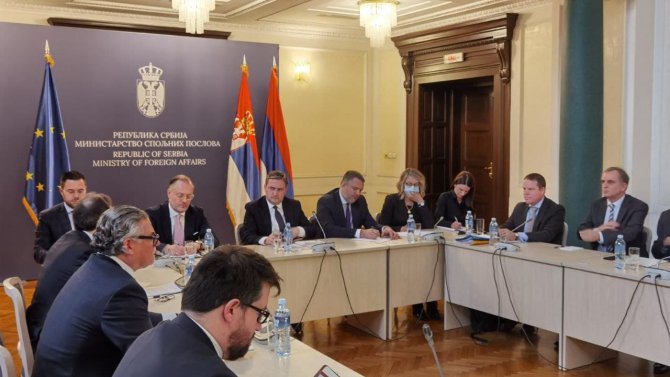
The Minister of Foreign Affairs Nikola Selaković met today with the Head of the EU Delegation Emanuel Giofre and the Ambassadors of the EU Member States accredited to Serbia.
Minister Selaković informed the ambassadors present about the Conclusion of the National Security Council, which was adopted by the Government of Serbia on February 27 - regarding the situation in Ukraine.
The Serbian Foreign Minister said that Serbia deems the outbreak of the crisis and conflict in Ukraine deeply regretful, emphasizing that Serbia considers it very wrong to violate the territorial integrity and sovereignty of any state, as in the case of Ukraine. In this regard, Foreign Minister Selaković reiterated that Serbia very clearly insists on the respect for the principles of international law, pointing out that this is the foundation of the Serbian foreign policy.
FM Selaković underscored that Serbia gives fully supports the negotiations between the two sides and all credible international efforts to find a peaceful and political solution to the crisis in Ukraine.
Mr. Selaković pointed out that Serbia will continue to consistently maintain peace and stability in Southeast Europe in these challenging times, emphasizing that modern challenges also show that all disagreements on our continent must be resolved by peaceful means and dialogue.
|
|
|
| Belgrade to get Centre for Fourth Industrial Revolution |
|
7 February 2022
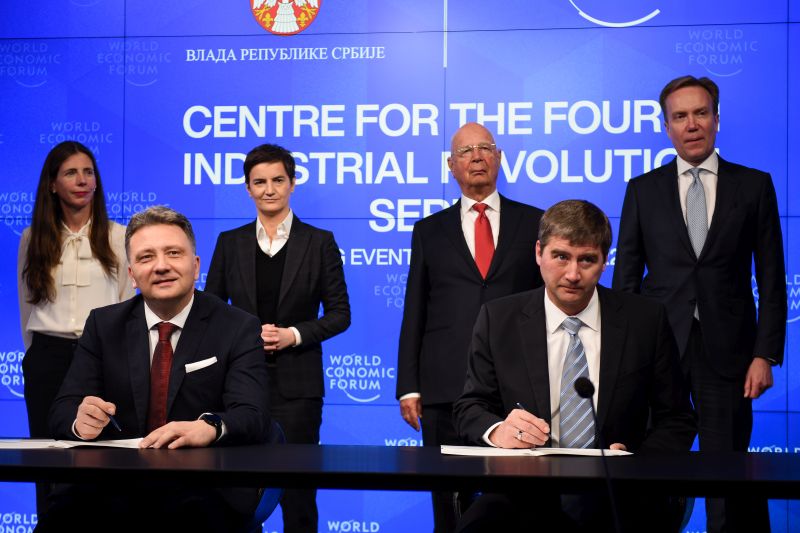
Prime Minister Ana Brnabic attended today in Geneva the signing of the Agreement on the Establishment of the World Economic Forum Centre for the Fourth Industrial Revolution in Serbia, the first of its kind in the Western Balkans.
The agreement was signed at the headquarters of that forum by Director of the Office for Information Technologies and eGovernment Mihailo Jovanovic and Managing Director and Head of the Forum's Centre for the Fourth Industrial Revolution Jeremy Jurgens.
The centre in Serbia will be the 16th in the network of centres of the World Economic Forum in the world and the first in the region of the Western Balkans.
The new centre will start operating on 1 March and will function as a non-profit organisation and a platform for public-private partnership and cooperation for the Fourth Industrial Revolution, while the focus of work will be on artificial intelligence and bioengineering.
This centre will work within the Serbian government’s Office for Information Technologies and eGovernment and will cooperate with scientific institutes, state institutions and the private sector.
The signing of this document was also attended by founder and Executive Director of the World Economic Forum Klaus Schwab and President of the World Economic Forum Borge Brende, with whom Brnabic had previously met.
Addressing the press, Brnabic pointed out that this agreement is the result of many years of joint work between Serbia and the World Economic Forum.
We started talking in 2018, signed a Memorandum of Understanding, then 2020 hampered us a bit, but we continued to plan in 2021 and here we are today, she said.
According to her, the centre will be focused on the development of artificial intelligence, biomedicine and biotechnology, and on the ways in which digitalisation can raise the productivity of companies and the entire economy.
This is what further leads to higher salaries, a better standard of living, as well as to an economy that is mainly based on knowledge, creativity and innovation, Brnabic emphasised.
Today, we have received great recognition for everything that Serbia has done in the field of digitalisation, development of high technologies and paradigm shift – from an economy that was based on labour-intensive investments to digital development.
That is why this agreement shows that Serbia has been recognised as one of the leaders in the economy and IT industry in the last six years, the Prime Minister pointed out and assessed that this is the announcement of the beginning of an even closer cooperation between Serbia and WEF.
She added that they will have a joint meeting with the 16 WEF centres for the fourth industrial revolution in the world every month, at which they will talk about what each of them is doing, since each has a different focus.
That is how we will hear what everyone is doing every month, learn from each other and I am sure that the centre in Belgrade will be one of the best, the Prime Minister said.
According to her, this gives us visibility, the opportunity to further establish Serbia as an investment destination, a country good for living and investing in new technologies and knowledge.
Jovanovic said that the ecosystem formed around the centre will use the infrastructure of the National Platform for the Development of Artificial Intelligence, the Centre for Genome Sequencing and the future bioeconomic centre – BIO4 Campus.
Izvor/Foto: Tanjug |
|
|
| Serbian Office in Valletta to open soon |
|
21. Jan 2022.
The Ministry of Foreign Affairs of Serbia informs that the Office of the Republic of Serbia in Valletta, in the Republic of Malta, will open on 31 January.
The opening of the Office of the Serbian Embassy in Italy, with a seat in Valletta, is in the interest of further development of inter-state relations with the Republic of Malta, and in addition to providing consular and legal protection to Serbian nationals, the Office will work to promote the bilateral and economic relations, as well as cultural-educational, scientific-technical and other types of cooperation between the two countries.
The Office, which is being opened owing to the Memorandum on co-location signed with Hungary, is located at the following address: Europa Centre, Level 3, Office 18/a, Triq Sant` Anna 58, Floriаna, FRN,1400 Malta.
Contact details of the Office are as follows: phone +35627037921 and +35627023539, e-mail: srb.office.valletta@mfa.rs.
The Office in Valletta will be open for clients on Tuesdays, Thursdays and Fridays from 10 am to 2 pm.
The jurisdiction of the Office in Valletta covers the territory of the Republic of Malta.
|
|
|
| Opening of cluster 4 important turning point for Serbia |
|
14 December 2021
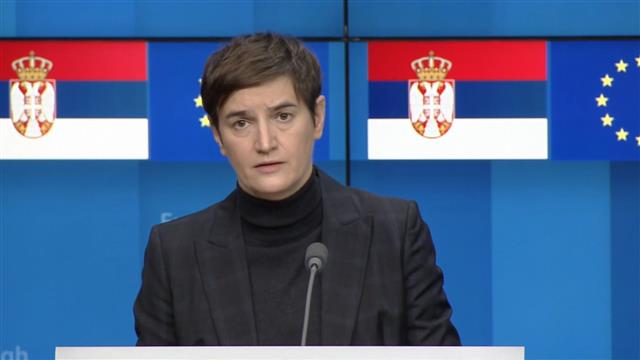
Prime Minister Ana Brnabic stated in Brussels today after the Intergovernmental conference on the accession of the Republic of Serbia to the European Union (EU) that today is a very important date and a turning point for Serbia.
Brnabic said that in line with the new methodology, Serbia has opened cluster 4 – Green Agenda and Sustainable Connectivity, and within cluster 4, four chapters have been opened.
The Prime Minister underlined that this is a great success on which she wants to congratulate all citizens of Serbia and she thanked President of Serbia Aleksandar Vucic on the support and understanding he showed.
An important segment of the new methodology is political management of integrations. What we have done in the mandate of the new government is that we manage, together with Minister of European Integration Jadranka Joksimovic, the integration process and all reforms, first and foremost in the field of the rule of law, politically in full, and that yielded results, the Prime Minister said.
She said that the opening of the chapters is a huge motivation for further reforms in the field of the rule of law, public administration and the economy.
I would like to thank all EU Member States, as well as the European Commission, for their support and understanding. They have shown that they are open, that they are ready to see, to listen, to reward everything we have done and therefore this is a great motivation to continue, not even in the same way we have worked so far, but to go faster and to work better, she noted.
Brnabic voiced hope that Serbia will open cluster 3 in 2022, which is ready, and that preparations for the opening of cluster 5 are on the agenda.
The Prime Minister underlined that environmental protection is gaining importance and that this topic is increasingly present and important in Serbia.
Regional stability, dialogue with Pristina and the economy also remain our priorities. I am satisfied, and we talked about that today, about economic results Serbia is achieving. I expect our growth this year to be 7.5 percent, the Prime Minister pointed out.
She said that the degree of harmonisation of Serbia with the foreign and security policy of the EU currently stands at 65.55 percent.
Brnabic also thanked Slovenia for the successful EU presidency, she thanked EU Member States on their support, as well as the European Commission, European Commissioner for Neighbourhood and Enlargement Oliver Varhelyi and European Commission President Ursula von der Leyen.
Source: www.srbija.gov.rs
Photo: Tanjug
|
|
|
| Serbia expects support for opening clusters by end year |
|
12 November 2021
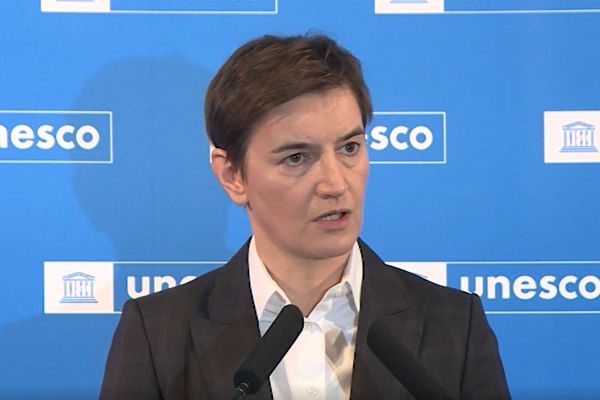
Prime Minister Ana Brnabic stated today in Paris that she expects positive news and support from France for opening one or two clusters at the intergovernmental conference to be held in December.
At the press conference, Brnabic stated that she talked with French President Emanuel Macron about the situation in Serbia, primarily in the context of European integration, i.e., whether we can count on the country's support for opening a cluster at the December intergovernmental conference.
We have two clusters ready for opening, so I expect positive news and support from France for one or both clusters, but certainly significant support, the Prime Minister said.
She pointed out that Macron told her to convey greetings to the President of the Republic, Aleksandar Vucic, and the whole of Serbia, as well as that he remembers his visit to Belgrade with great joy.
Today, I had good talks with the President of Cyprus, but also with the President of Slovenia, with whom I also talked about European integration, i.e., the country's support, which is clear and unambiguous for opening a cluster and further progress of Serbia towards full EU membership, regional relations and regional cooperation, said Brnabic.
She stated that she also talked with EU High Representative Josep Borrell in Paris.
There were interesting and good talks, it seems to me that we have done good things for our country and I expect it to continue today, the Prime Minister concluded.
Source/Photo: www.srbija.gov.rs |
|
|
| Address of the President of the Republic of Serbia at the United Nations climate change conference COP26 held in Glasgow |
|
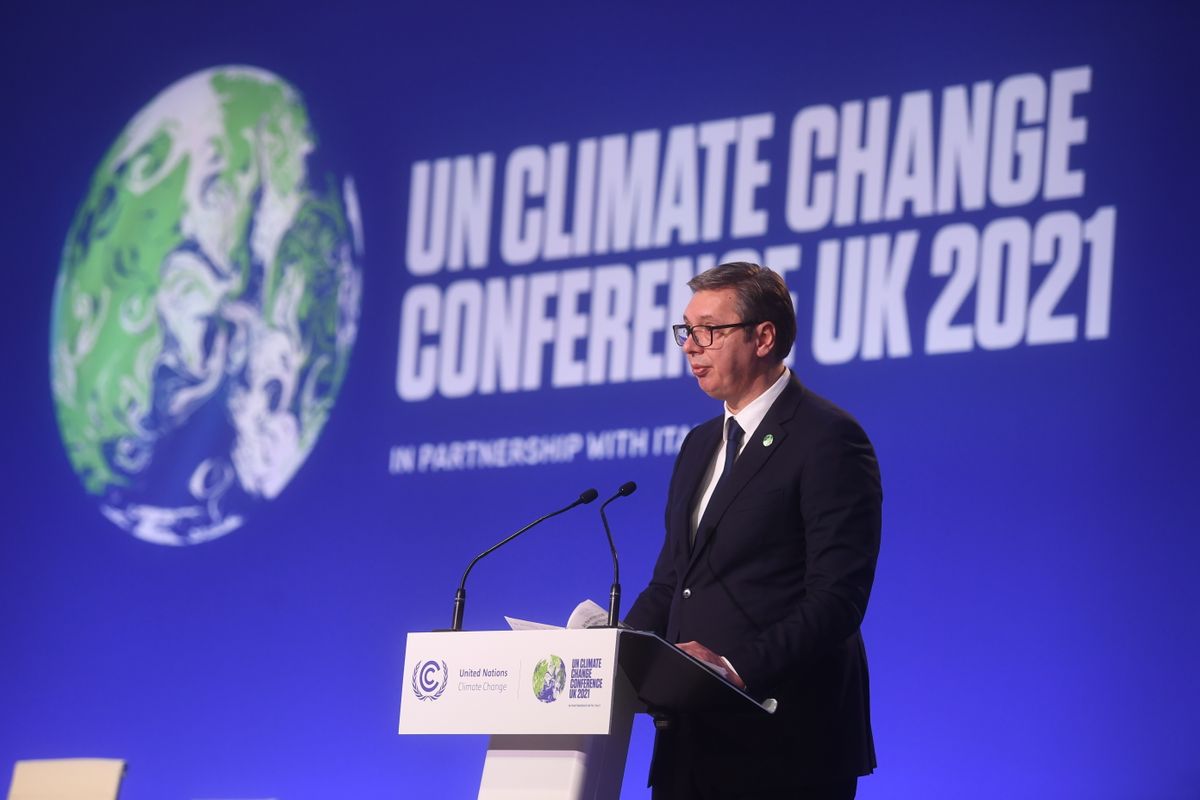
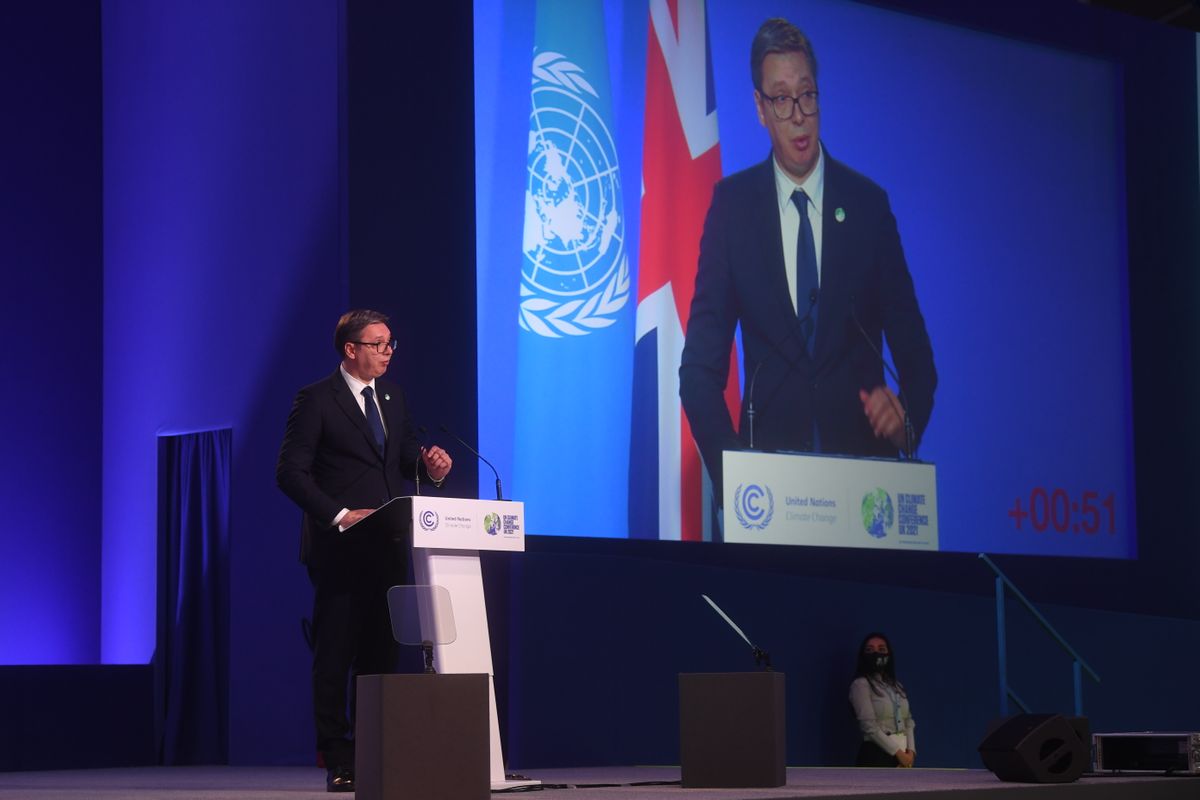
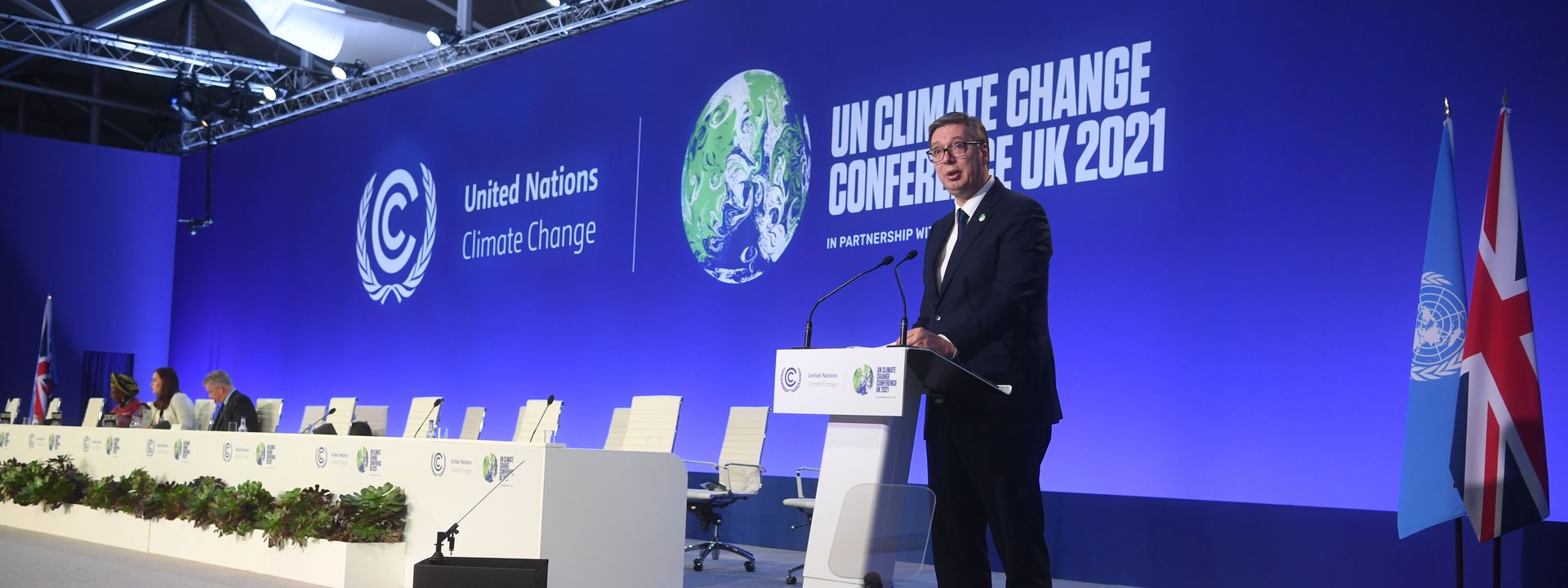
2nd November 2021
"Your Excellences,
distinguished delegates,
dear Sarah,
At the very beginning, I feel obliged to thank Prime Minister Boris Johnson and Her Majesty’s Government for exceptional hospitality.
I feel privileged to represent the Republic of Serbia at this important place and at the highest-level world forum, in working on the most important topic of today – promoting climate awareness.
We all agree that we must make investment into climate and environment.
We all, likewise agree, that future generations must be educated in order not to repeat the mistakes we made, by hurting the only Planet that makes life possible.
I am very honoured that the Republic of Serbia is co-chairing this year’s Conference as a Non-EU representative of the Eastern Europe Group.
In concrete terms, we see the special contribution of our expert team in finalising negotiations on the implementation of Article 6 of the Paris Agreement, which refers to the establishment of the global market and non-market mechanisms for reducing greenhouse gas emissions, as well as to remaining provisions referring to advanced transparency framework and common timeframes for Nationally Determined Contributions, which are the key provisions of the Agreement that have not yet been covered by the decision that is to be adopted by the Conference, i.e. all member states.
We, therefore, believe that this is an exceptional opportunity for Serbia to give its full contribution to the finalization of negotiations, which, we hope, will secure full implementation of the Paris Agreement.
As a result of strong economic development, modelled for Serbia by 2050, the impact of the implementation of climate measures to employment will be optimal, through new jobs creation and creation of new industries which have not existed so far.
One billion euros was raised at the first green bonds auction in Serbia, which clearly confirms the trust of international investors in our green agenda, but also to the economic and political stability of our country.
Incomes from green bonds issuance will be used for financing renewables, energy efficiency, sustainable water management, prevention of pollution and circular economy development and biodiversity preservation.
And as you can see, dear friends, my people made a terrific speech for me, but I am going to add a few more words and a few more questions for those that are coming from big powers and that haven’t answered yet several questions:
Number one is: how are we going to finance all these activities?
We’ve heard the story of trillions of dollars that are at our disposal. My question would be: what would be the interest rate, what would be the terms for taking these amounts of money, and actually how are we going to tackle that issue?
Number two: how are we going to treat the nuclear power plants? Are we going to shut them all or are we going to build them more?
Then, how are we going to build more renewables if we already started endorsing populist movements against wind parks, new hydropower plants, and are we going to put in jeopardy the level of our public debt to GDP ratio if we raise huge amounts of money?
How are we going to treat natural gas, and how are we going to secure decent prices of natural gas and electricity power as well?
And, I came here using an electric car from Edinburgh to Glasgow. But, how are we going to do mining and refining of lithium, nickel, cobalt and many other very important minerals?
In the end, we all know what is our final aim, what is our final target. But, it’s not a fairytale – we’ll have to work a lot, we’ll have to be 100 per cent dedicated, and we’ll have to be more honest with each other.
The health of people living in Serbia depends directly on the implementation of this Agenda, just like the health and life of each living being on Earth depends on arrangements that will be reached here and on national implementation of the respective arrangements.
Perhaps it is the right time to listen and hear the cry of Mother Earth because if we lose this race against time, our children will inherit an irreparably polluted Planet.
Thank you very much for listening to me."
Source: www.predsednik.rs
Photo: Dimitrije Goll |
|
|
| Continuous communication with EU on further reforms |
|
22 October 2021
Prime Minister Ana Brnabic, together with Minister of European Integration and Chief Negotiator Jadranka Joksimovic, met today with Head of the EU Delegation to Serbia Emanuele Giaufret and the ambassadors of the EU Member States.
The topics of the meeting were 2021 EU Enlargement Package and in particular the Report of the European Commission on Serbia for this year, as well as the next steps in the process of accession to the EU.
She underlined that Serbia has continuous communication with the Delegation of the EU and all Member States and that it speaks openly about further reforms, first and foremost in the field of the rule of law.
The Prime Minister assessed that this year’s Report on the progress of Serbia gives an objective evaluation of everything the Serbian government has achieved on speeding up the political and economic reforms, by which one of the strategic priorities has been fulfilled.
According to Brnabic, it is of particular importance that the European Commission has given a clear recommendation that Serbia reached the criteria necessary for opening two clusters of chapters.
Today we have an opportunity to present to you, as representatives of the EU and EU Member States, additional information on the adoption and implementation of all necessary reforms, the Prime Minister stated.
For this reason, it is important that this meeting is being held immediately after the release of the European Commission’s Report and before the final decision of the Member States on whether they will support the opening of clusters, she said.
Brnabic voiced her hope that these additional explanations will contribute to Serbia obtaining consent for the formal continuation of negotiations by the end of this year.
She also underlined that the European Commission’s recommendation for the further opening of clusters is very important politically, not only as an incentive to the government to continue implementing its reform plans with motivation and responsibility, but also to the citizens of Serbia and all in the region, who in this way receive once more a clear confirmation on the perspective of membership in the EU.
The Prime Minister pointed out that Serbia wishes to make additional progress in all areas, especially in the field of the rule of law and that continuous communication with the Delegation of the EU in Serbia and all Member States is of particular importance to that end.
Joksimovic stated that the Report provides the necessary balance in the evaluation of everything Serbia has achieved in the previous period.
According to her, in some segments the implementation of reforms is faster, in some other somewhat slower, but progress has been noticed in all areas and is noted down in the Report itself.
She voiced hope that the general assessments from the European Commission, which speak in favour of honesty, dedication and capability of the Serbian government to implement policies which are important for the accession process in time of pandemic, will be a sufficient orientation for the Member States to agree on the further opening of clusters.
Ambassador Giaufret expressed gratitude to the Serbian government for convening this meeting with ambassadors of the EU Member States, describing it as a positive indication of Serbia’s dedication to strengthening dialogue on reforms for the sake of solving priorities and necessary activities identified in the yearly Report of the European Commission.
Source/Photo: www.srbija.gov.rs
|
|
|
| New investments of Italian businessmen in Serbia considered |
|
21 October 2021
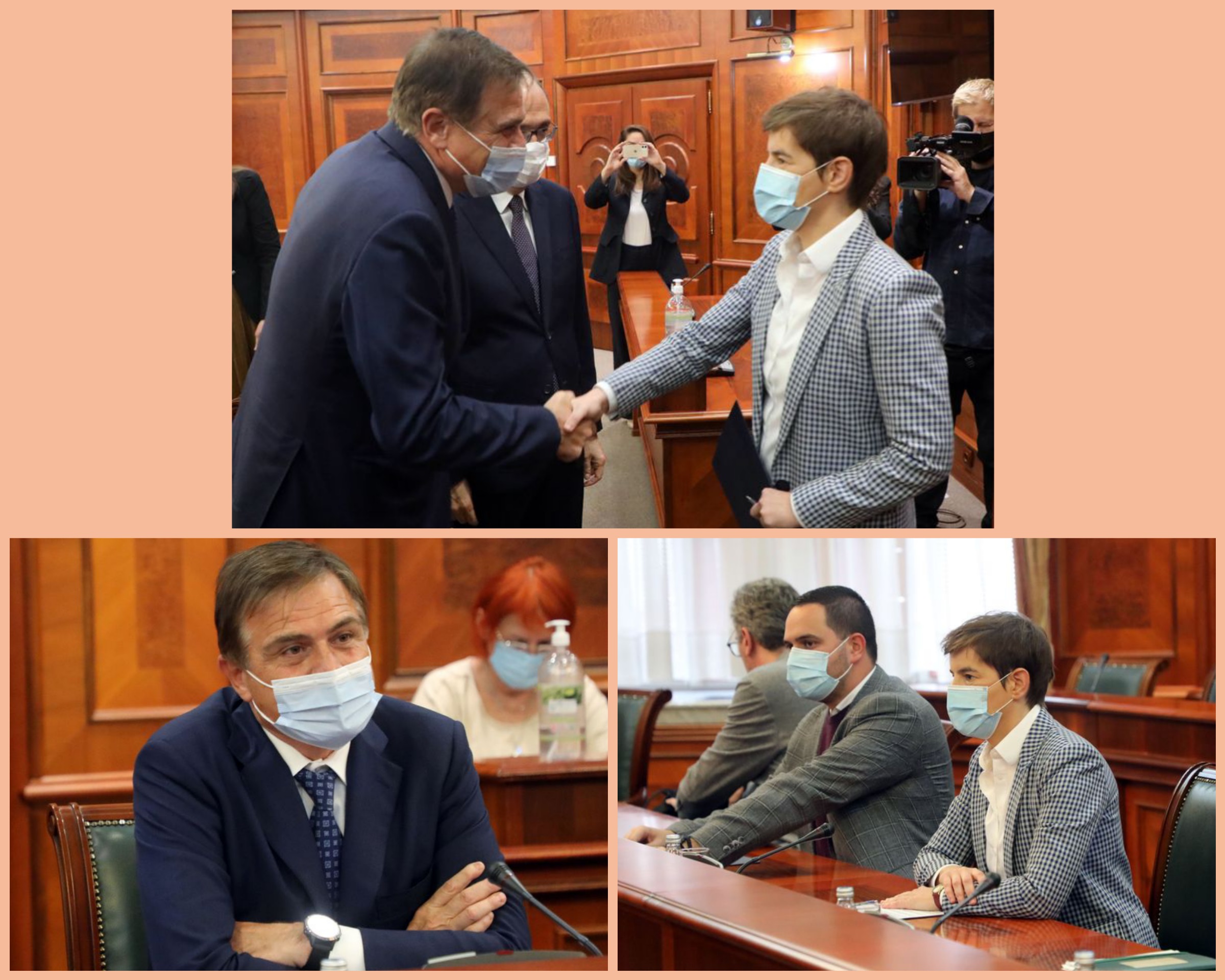
Prime Minister Ana Brnabic talked today with President of Confindustria Serbia Patrizio Dei Tos about the business of Italian companies and the business climate in Serbia, their new investments in our country and bilateral relations.
Brnabic pointed out the exceptionally good bilateral relations in the field of economy, which was contributed by the strategic partnership between the two countries, and added that solving the problems that appear in Serbia, as well as in every other market economy in the world, is of great importance.
According to her, the Serbian Chamber of Commerce is the address that Italian businessmen can turn to regarding any specific problem, while on the other hand, they encourage the announcements of small and medium-sized enterprises from that country to come to our country.
Confindustria Serbia brings together 160 Italian companies operating in our country, Dei Tos said noting that Italy was among the first to invest in Serbia not only because of the friendship and similar mentality of its citizens, but also because it recognised all investment opportunities such as quality and accessible workforce, institutions that do their job efficiently and government support.
The Prime Minister told Italian investors that there is no reason for concern when it comes to energy sources, considering that Serbia has no problems with the production of electricity and gas supply.
Source/Photo: www.srbija.gov.rs
|
|
|
| Selaković in UNSC: Dialogue and the implementation of the agreements reached are the only right way to resolve all open issues |
|
15th October 2021
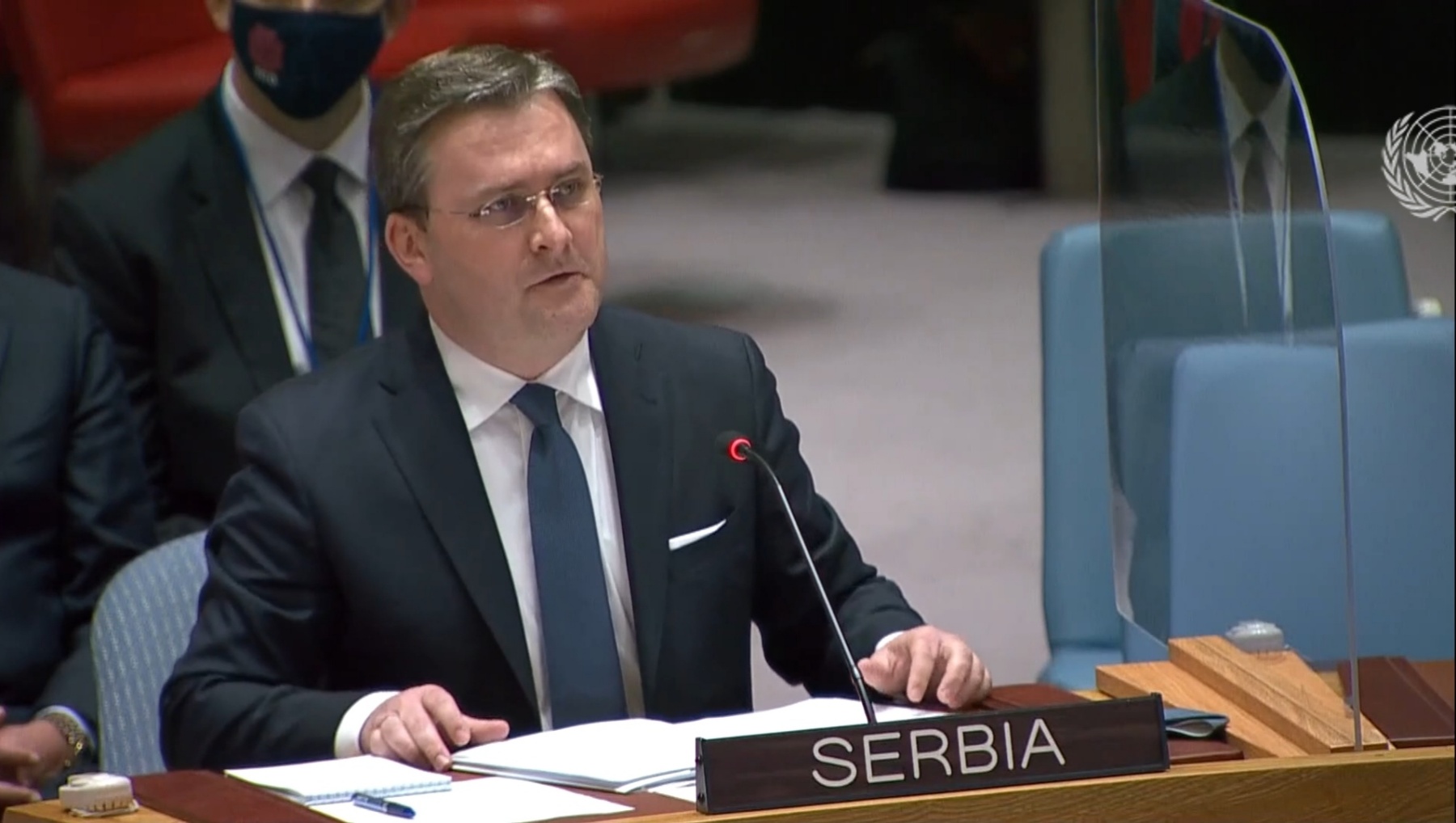
Distinguished President of the Security Council,
Esteemed members of the Security Council,
Distinguished Special Representative,
I would like to thank Secretary-General of the United Nations Mr. Guterres and Special Representative of the Secretary-General and Head of UNMIK Mr. Tanin for the report submitted and for their efforts made towards the implementation of the UNMIK mandate. I would also like to thank the members of the Security Council for the continued attention they have devoted to the issue of Kosovo and Metohija. The Republic of Serbia highly values the activities of the Mission of the United Nations in Kosovo and Metohija and supports it in carrying out its work as efficiently as possible, pursuant to the UN Security Council Resolution 1244, and undiminished in scope, aiming to build and preserve lasting peace, stability and security in the Province.
Mr. Tanin,
Please accept the expressions of our gratitude for your engagement and the cooperation we achieved during your term of office.
Mr. President,
Deep regret and concerns are raised by the fact that the security situation in Kosovo and Metohija in the past period has been marked by an increasing number of various ethnically motivated attacks and incidents targeting Serbs, which was also stated in the Report; that the provisional institutions of self-government (PISG) in Pristina continue to take unilateral steps and refuse to implement the agreements reached in the Brussels dialogue; and that institutional discrimination against Serbs, attacks on the sites of the Serbian Orthodox Church and the undermining of the economic sustainability of Serb communities in the Province have continued.
We are witnessing that dangerous provocations by Pristina are taking place every day, at an accelerated pace, thus seriously threatening the safety of Serbs in Kosovo and Metohija and directly violating the agreements and arrangements reached within the Brussels dialogue.
The latest violent incursion of the so-called ROSU units into the northern part of Kosovska Mitrovica, on 13 October, is the ninth incursion of its kind. Tear gas, shock bombs and unbridled violence are becoming a matter of everyday life for Serbs in the north of Kosovo and Metohija, and that must be stopped immediately.
In the last attack with firearms and chemicals used by Pristina special forces, 71-year-old Verica Djelic died as a result of chemicals used in the intervention, 10 unarmed civilians were wounded, one of them 36 years old Srećko Sofronijević was critically wounded in the back with of an automatic rifle. A three-month-old baby, who miraculously remained unharmed, was also the target of the shooting.
The false excuse for the latest unilateral action, as EU High Representative for Foreign Affairs and Security Policy Josep Borrell called it, was the fight against organized crime and smuggling. Ladies and gentlemen, Serbia is strongly against organized crime and smuggling, but the members of the UNSC should know that such an important and general global goal, which we all share, was cynically used for an armed attack on unarmed civilians, which began with an automatic rifle raid of pharmacies in which patients of Serbian and other nationalities are supplied with vitally important medicines. Four days before the local elections in Kosovo and Metohija, in order to gain votes in an irresponsible and inhumane way, fully motivated by separatist goals, the current PISG regime used medicines on which people’s lives depend to prove its position on the status contrary to UNSCR 1244.
Only a few days earlier, another provocation on the part of Pristina led to a dangerous crisis, when personnel of the so-called ROSU unit, armed with long firearms and reinforced with armoured vehicles, were deployed to administrative crossings between central Serbia and Kosovo and Metohija - Brnjak and Jarinje – in order to remove Serbian license plates and replace them with temporary ones, thus violently preventing the free movement of citizens.
These events do not fall within the reporting period covered by the latest Report of the UN Secretary General on the work of UNMIK, but it is incumbent upon us to address them on this occasion, in order to have everyone understand how dramatic the situation on the ground has been and how serious the consequences of Pristina's unilateral actions can be.
The incursions of heavily armed Pristina police formations, composed exclusively of Albanians, into the north of Kosovo and Metohija, under various pretexts and motives, with the use of excessive force, are provocations that have an extremely dangerous potential to destabilize the already sensitive security situation on the ground. The goal of the latest incursions of Pristina’s special force personnel into the north of the province was to provoke the Serbs and additionally intimidate them with a demonstration of force, as well as to provoke Belgrade to react hastily in some way.
It is obvious that with such moves Pristina aims to erase the 10 years of dialogue, which is the only way to resolve open issues. These provocations once again demonstrate that the provisional institutions of self-government in Pristina, not only do not intend to implement everything agreed in the Brussels dialogue, but that their goal is to completely deny dialogue as a means of resolving problems. An effective response to Pristina's lack of credibility and their dangerous play with fire, which could have unforeseeable consequences, cannot be provided by calling on "both sides" for constructiveness and restraint, which has long been a manner in public communication of some important factors in the international community. There is only one source of destabilization, it has a name – and that is the provisional institutions of self-government in Pristina - and after the events of 13 October, it is clear that it can and needs to be stopped by urgent and decisive action of the international community. It is now quite obvious that these are no longer sporadic and isolated provocations by Pristina, but that this is an organized campaign of ethnically motivated violence and discrimination against Serbs.
We also express our concern over the latest imposition of tariffs by Pristina on certain products originating from central Serbia, which was made public on 8 October. We remind you that the unilateral decision of Pristina to impose duties on products from central Serbia in November 2018 resulted in a de facto complete trade blockade and a long-term stalemate in the dialogue between Belgrade and Pristina. In contrast to Pristina, which persistently seeks to raise barriers towards central Serbia through unilateral acts, Belgrade is persistently and consistently working to liberalize the flow of people, goods, services and capital, which is the basic goal of our "Open Balkan" initiative. North Macedonia and Albania joined this initiative, but Pristina did not.
Distinguished members of the Security Council,
In the period from March to September this year, which is covered in the latest Report, close to 100 ethnically motivated attacks were carried out against Serbs, their private property, religious and cultural heritage sites. The increase in the frequency of attacks was accompanied by the strengthening of the intensity of ethnically motivated violence, which more and more often targets children, the elderly, women, the few returnees present there, as well as churches and other property of the Serbian Orthodox Church.
This systematically intensifies the ubiquitous sense of insecurity of the remaining Serbs, but also deters potential returnees, who are in fact being told that local Albanian communities can attack them with impunity and prevent them from returning to live in their own homes.
The most striking example of the position of Serbs in Kosovo and Metohija is the case of the displaced person Dragica Gašić, who moved into her apartment in the municipality of Djakovica again in early June. In that town – to which local Albanians proudly refer as a place forbidden to Serbs - Ms. Gašić, on her return, first faced physical and verbal attacks by citizens of Albanian nationality living there. Instead of being provided protection, that seriously ill woman then became a victim of institutional persecution as well, that the local self-government bodies and the police unleashed against her. Since this is a person who is the first and only Serb returnee to Đakovica after more than twenty years, it was to be expected that, at that moment, at least civil society organizations would attempt to protect her rights. However, NGOs from Djakovica soon joined the activities aimed at the expulsion Ms. Gašić, including those receiving funding from international donors for projects related to strengthening democracy and the rule of law.
I must also mention the latest attack on the house of the only remaining Serbian woman in the center of Pec, retired teacher Rumena Ljubić, whose windows were stoned twice in just 24 hours on 13 October.
Dragica's and Rumena’s fate is a frightening reflection of the real situation of human rights that almost every one of over 200,000 displaced Serbs and non-Albanians would face in Kosovo and Metohija - provided that they gather the courage to return to their homes in the Province after more than twenty years. I would like to remind you again that since 1999, only around 1.9% of internally displaced Serbs and other non-Albanians have achieved a sustainable return to Kosovo and Metohija.
Therefore, I believe that the aforementioned will encourage the members of the Security Council and the international presence on the ground to devote priority attention in the future
to the issue of the return of displaced persons, which is an important part of the UNMIK mandate under UN Security Council Resolution 1244.
I therefore thank the Secretary-General in particular for keeping this extremely important issue in focus and for calling again, in the conclusions of his Report, for the creation of conditions for the sustainable return of internally displaced persons and the sustainable reintegration of returnees.
Distinguished members of the Security Council,
Serbian medieval monuments in Kosovo and Metohija, including monuments that, due to their exceptional value but also constantly being subject to threats are inscribed on the UNESCO List of World Heritage in Danger, are still among the most endangered cultural heritage in Europe.
I wish to recall that there are over 1,300 Serbian churches and monasteries in Kosovo and Metohija. Attacks on Serbian cultural and religious heritage are at the same time attacks on the identity of Serbs in the Province and directly affect their sense of safety.
A striking example of disrespect for Serbian cultural and religious monuments in the Province is the case of the Visoki Decani monastery. The monastery, which has been the target of attacks and shelling several times since 2000, is still secured by KFOR forces due to being under a threat. It is faced with a series of hostile actions, and the perpetrators are not deterred by the fact that this is a World Heritage Site. Despite frequent declaratory statements, even the decision of the so-called "constitutional court" of the PISG in Pristina five years ago confirming ownership of Visoki Decani Monastery over 24 hectares, is not respected. We welcome the assessment made by the UN Secretary General in his Report.
Dear Mr. President,
The Republic of Serbia remains committed to finding a compromise political solution, as prescribed under Resolution 1244, which will ensure lasting peace and stability. We firmly believe that dialogue and the implementation of the agreements reached are the only right way to resolve all open issues.
As a state committed to the respect for international law and a member of the United Nations, Serbia opposes any attempt at establishing an artificial balance between the parties in the dialogue, as well as the relativization of responsibility for unilateral acts.
We note with concern that not even eight years after reaching the Brussels Agreement, the establishment of the Community of Serb Municipalities has not been initiated, although Belgrade has fulfilled all its obligations under that agreement.
There are also numerous and repeated examples of Pristina violating or obstructing agreements reached in dialogue, in the areas of energy, justice, freedom of movement and visits by officials.
One such example is the verdict sentencing Ivan Todosijevic to two years in prison, which is also pointed out in the Secretary General's Report. The Brussels Agreement was directly breached, which was also stated by the representatives of the European Union. With its conduct Pristina caused immeasurable damage to the reconciliation process in Kosovo and Metohija.
Despite the interpretation from the European Commission that this is a violation of the Brussels Agreement, because Todosijevic had to be sentenced by a panel consisting of the majority of judges of Serbian ethnicity, Pristina still does not take any action in this regard.
Pristina also continued with the practice of banning Serbian officials from entering the territory of the Autonomous Province of Kosovo and Metohija.
We believe that it is important that the international community, and especially the European Union, as the guarantor of the agreement, firmly insists that the provisional institutions of self-government in Pristina start implementing all the agreements reached.
Distinguished members of the Security Council,
As before, the Republic of Serbia remains fully committed to resolving the issue of missing persons, as also demonstrated through full cooperation with relevant international mechanisms as well as participation in the work of the Working Group on Missing Persons. We expect that the representatives of the provisional institutions of self-government in Pristina will fulfill their obligations.
Bearing in mind everything I delivered here today in my address, we hold the position that the international presence in Kosovo and Metohija, pursuant to UN Security Council Resolution 1244, is still necessary. In addition to UNMIK, the presence of KFOR as the main guarantor of security and EULEX, due to its engagement in the field of the rule of law, is also important. I would like to emphasize once again that Serbia fully supports respect for international law, comprehensive implementation of UN Security Council Resolution 1244 and activities of UNMIK in an undiminished scope and with adequate financial resources, so that the Mission fulfills the mandate entrusted to it under the Resolution.
Thank you.
|
|
|
| High Level Commemorative Meeting to mark the 60th anniversary of the First NAM Conference / #NAM60Belgrade |
|
11th october 2021.
You can watch the High Level Commemorative Meeting to mark the 60th anniversary of the First NAM Conference / #NAM60Belgrade here (click on the image):
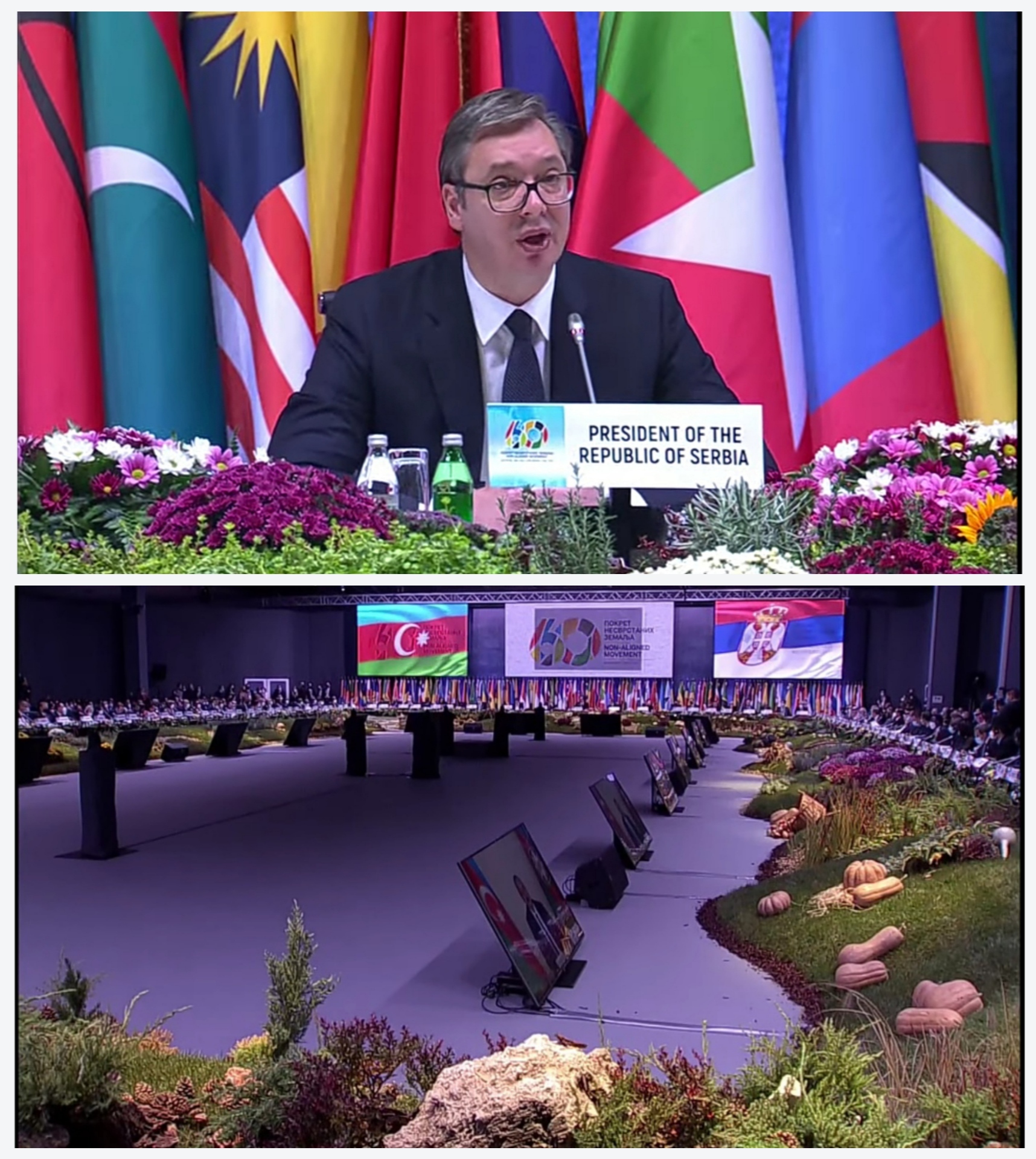 |
|
|
| President Vučić attended ceremony of the beginning of works on the modernization and rehabilitation of the Niš-Brestovac railway |
|
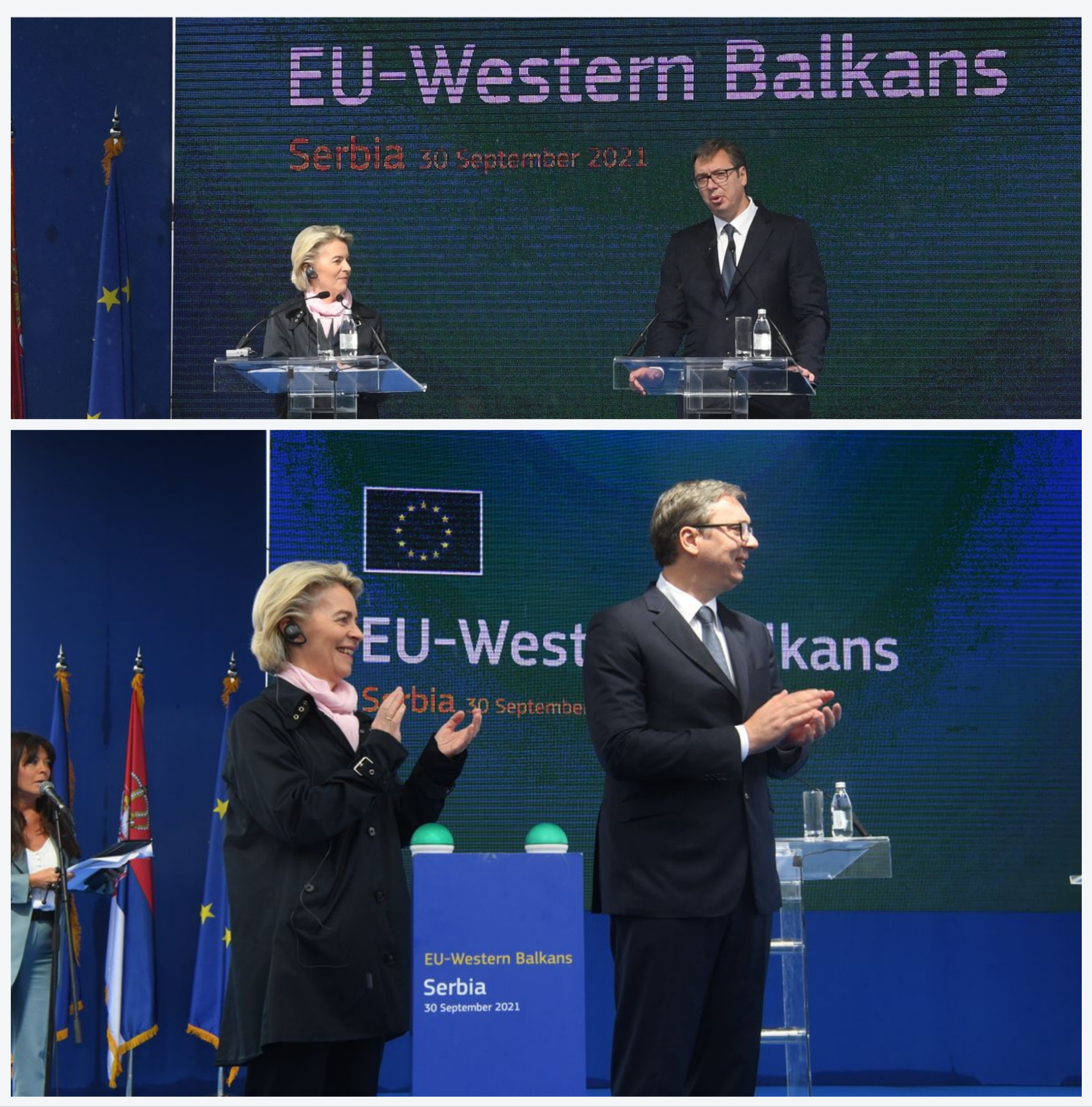
The President of the Republic of Serbia, Aleksandar Vučić and President of the European Commission, Ursula von der Leyen, have attended today the ceremony of the beginning of works on the modernization and rehabilitation of Niš-Brestovac railway at the international Corridor 10 as well as signing of the agreement between the Public Company Koridori Srbije and Consortium STRABAG AG and STRABAG d.o.o. Beograd on the construction of the first phase of the Highway of peace in the section Merošina – Merošina 1.
“In Donje Međurovo the 23km long railway is build and 75 percent of it will be financed by the European Union. It is enormous money for us, great encouragement and respect. This railway and highway are important both for us and Europe. I am very grateful to Mrs Von der Leyen for coming to Niš today and Niš becomes the center of all Balkan corridors, it becomes the Balkan crossroads”, said President Vučić adding that Serbia was entirely committed to the implementation of the agreements signed so far under the auspices of the EU.
“We will do our best not only to preserve peace, but also to reach more agreements which would mean security of everyone in the Balkans and better life and economy for all of us. We know what our job is. As much as we can, taking into account the difficulties due to the relation with Priština, we will do everything to make progress on the European path”, said President Vučić and thanked the President of the European Commission for kind words and wish to see Serbia in the EU.
The President of the European Commission, Ursula von der Leyen, emphasized that today Serbia had already gone a long way to the EU membership, it had made an incredible progress and efforts in the past years and improved conditions in different sectors. She said that she strongly supports the European integrations of Serbia.
“This is a very special moment. Signing of this agreement is a symbol of our great cooperation and projects of connections through which we jointly build our European future, because the future of Serbia in the European Union is better. The corridor connects Serbia to Austria and Greece and is really the driving force of economy. It is the driving force for the Serbian economy, investments, the economic plan which already functions in Serbia”, said the President of the European Commission.
Source: www.predsednik.rs
Photo: Dimitrije Gol
|
|
|
| President Vučić met Ambassadors of Quinta countries |
|
27 September 2021
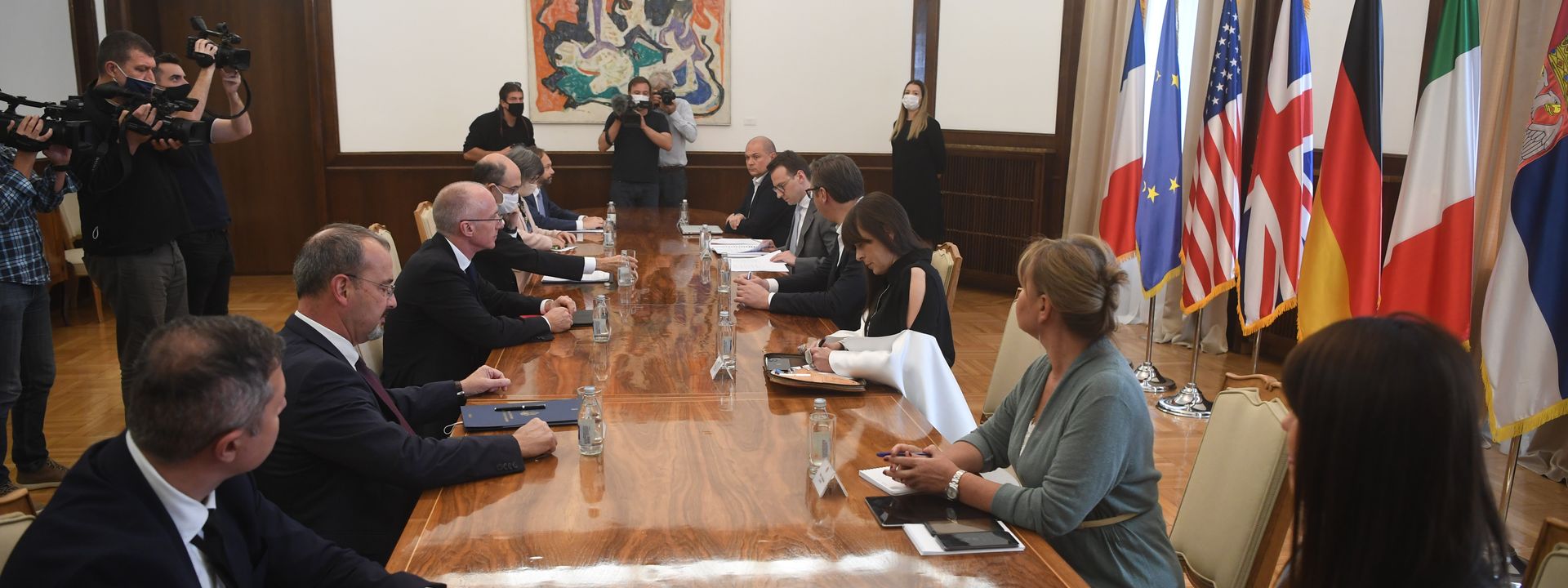
The President of the Republic of Serbia, Aleksandar Vučić has received today ambassadors of the Quinta member countries - the USA, Great Britain, France, Italy and Germany as well as the Head of the European Union Delegation who asked for the de-escalation of the crisis in the north of Kosovo and Methoija.
President Vučić explained the position of Serbia on this occasion. “We are dedicated to the preservation of peace and observance of the Brussels Agreement but under no circumstance shall we allow the humiliation of Serbia or its citizens”, said President Vučić.
Source/Photo: www.predsednik.rs
|
|
|
| Selaković in New York with 28 foreign ministers on economic successes of Serbia and K&M situation |
|
25 September 2021
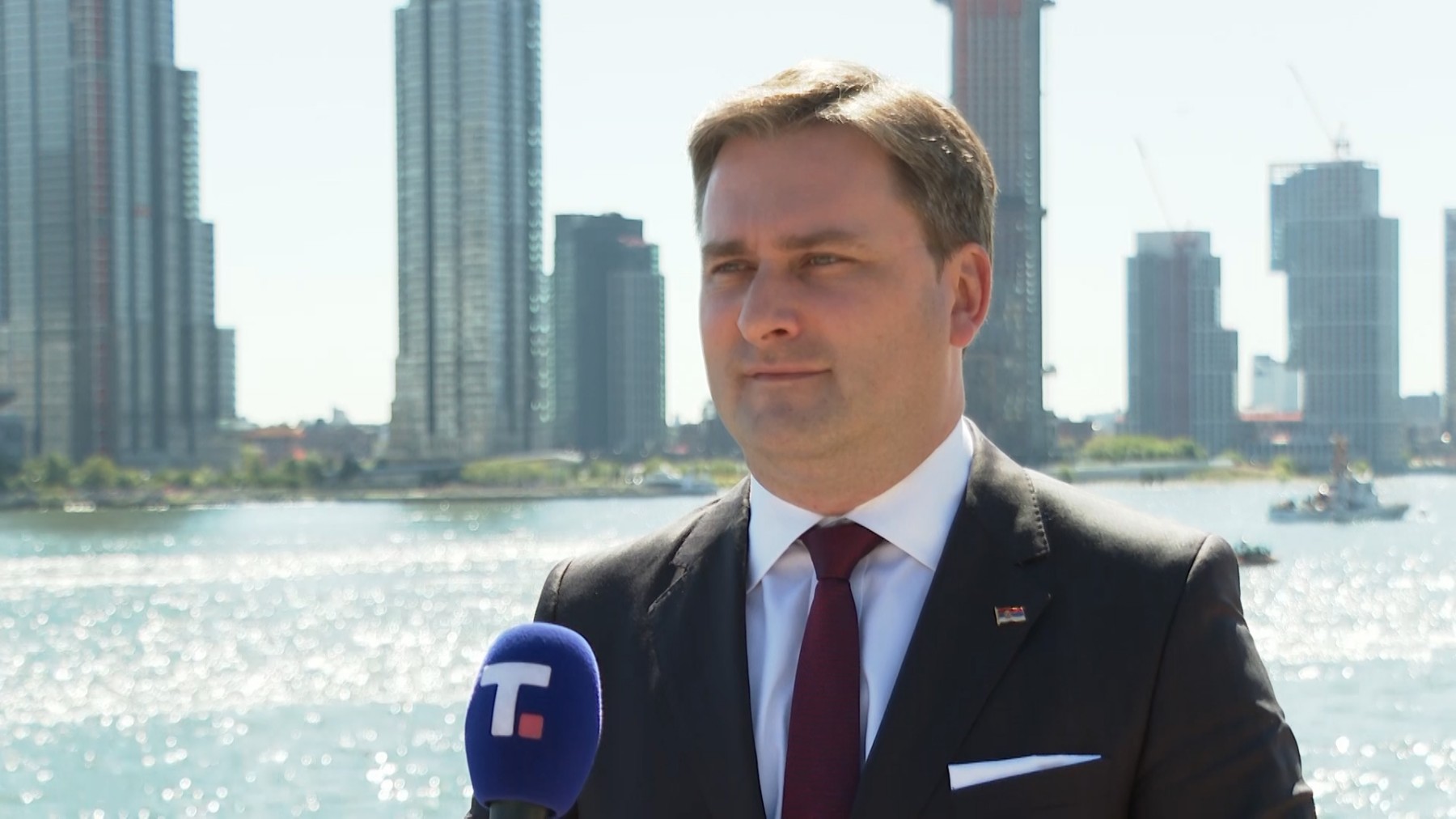
The Minister of Foreign Affairs of Serbia, Nikola Selaković, has stated that in New York he introduced foreign ministers of 28 countries to economic success of Serbia but also to the situation in Kosovo and Metohija, which he also discussed with the Russian Minister of Foreign Affairs, Sergey Lavrov, who told him that we could count on the support of the Russian Federation, with regards to Serbian interests in K&M.
Summarizing results of his visit to New York within the session of the UN General Assembly, Minister Selaković says that one of the last meetings was with Minister Lavrov, which was their third meeting in the previous nine months.
The Serbian Foreign Minister says that he surely used this opportunity, too, to introduce Minister Lavrov to the latest events in northern Kosovo and Metohija, the situation of the dialog between Belgrade and Priština and very clear and unambiguous attitude of President Aleksandar Vučić regarding the continuation of the dialog and subsequent events in K&M.
“We discussed the principled support of the Russian Federation, which is constantly present not just in Moscow, Belgrade, in the field, but also here in the East River, by the delegation of the Russian Federation as the permanent member of the UN Security Council. Of course, we will continue to maintain this type of dialog. What Minister Lavrov said was that we could count on the support of the Russian Federation in future with regards to our interests in K&M”, highlighted Minister Selaković.
He said that he had had the opportunity in New York to hold 33 meetings, of which 28 with ministers of foreign affairs, whom he had introduced also to topicalities related to the latest events in Kosovo and Metohija, but also to our principled position regarding the observance of the international public law, territorial integrity and sovereignty.
Minister Selaković said that his colleagues at the meetings had praised the substantial and fantastic success of Serbia in the consolidation of the economic sphere and transformation of what had been on the edge of collapse and economic disaster seven years before to the fastest growing economy in Europe, which Serbia was in the past two years.
He said that most of his interlocutors had supported our reforms and expressed great respect toward what President Aleksandar Vučić and Serbia had done in the previous period.
Many of them, says the Serbian Foreign Minister, showed great interest in the manner in which Serbia organized the figth against Covid 19.
“It was a great pleasure and pride to represent the Republic of Serbia in all these meetings. Many of my colleagues confirmed their arrival to Belgrade to the Conference on 11th and 12th October, which is dedicated to the 60th anniversary of the foundation of the Non-Allied Movement”, said Minister Selaković.
He emphasized that it was not just the evidence of how much they had cared to come to Belgrade to the conference, but also to see and witness the Serbia which after several decades of attempts to fight different challenges rose to its feed, was economically consolidated and turned towards its traditional friends.
“That is a great deal and our country will surely during October be one of the spots on Earth of greatest importance for multilateralism, for cooperation among the countries which share the same values, the values entered into the UN Charter and which are based on the promotion and fight for peace, equality, observance of the international public law and rights of every country to pursue its path to happiness and better and more ordered society in compliance with the wishes of its population”, said Minister Selaković.
He said that the Minister of Foreign Affairs of Azerbaijan, Jeyhun Bayramov, would come to Belgrade to the conference on the occasion of the Non-Allied Movement adding that we had strategic cooperation with Azerbaijan and frequent contacts.
“We agreed to realize as soon as possible after the Belgrade conference his bilateral visit to Serbia”, added Minister Selaković.
He said that it had been agreed to intensify the cooperation and finalize the agreements which should be signed and after that realized when the meeting of Serbian President Aleksandar Vučić and Azerbaijan President Ilham Aliyev took place.
Minister Selaković says that the Ministry of Foreign Affairs had recently received its sector for economic diplomacy and there were great expectations from it and one of the tasks was to deepen the cooperation with Azerbaijan. |
|
|
| Telephone conversation of President Vučić and General Secretary of NATO |
|
26 September 2021
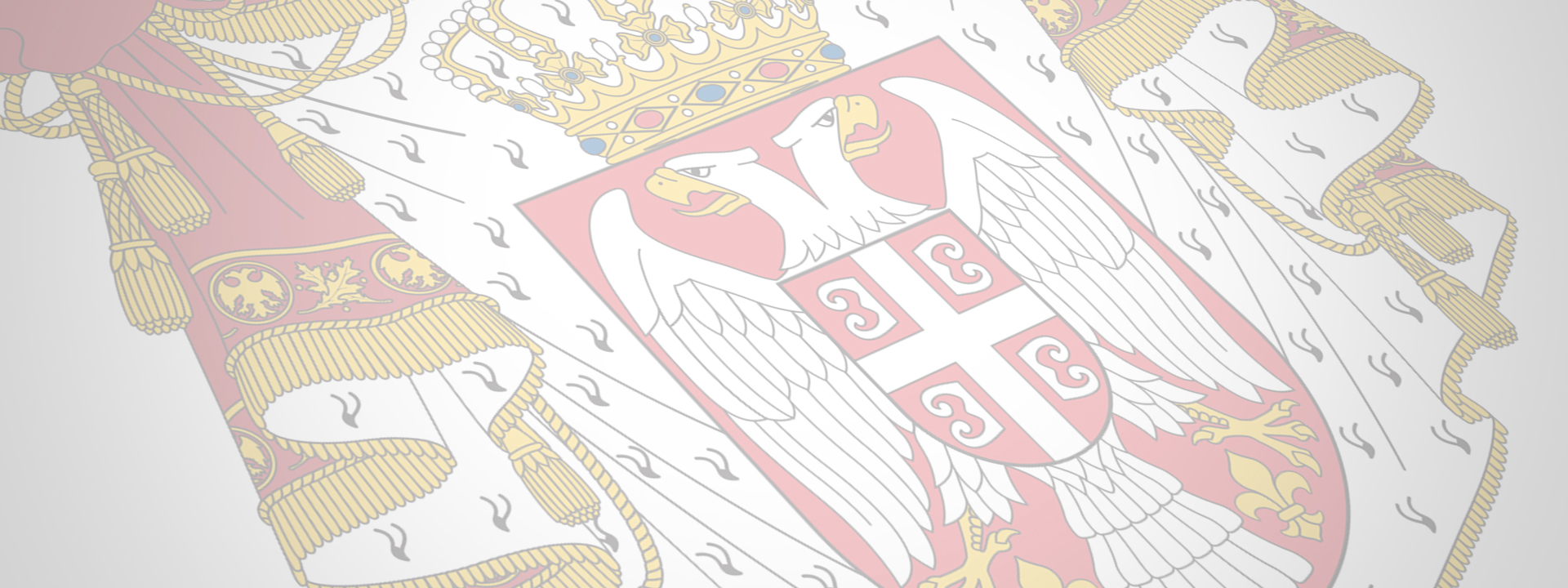
The President of the Republic of Serbia, Aleksandar Vučić, has discussed today by phone with the General Secretary of NATO, Jens Stoltenberg about, as the General Secretary said, worrisome situation in northern Kosovo and Metohija.
President Vučić said that Serbia had not violated either Brussels Agreement or Resolution 1244 by anything, by any single move or in any manner jeopardized peace preservation.
“The complete occupation by armored vehicles of northern Kosovo and Metohija has lasted for seven days and it is conducted by Priština and everyone in the international community “are thunderously silent”, said Serbian President. “However, everyone is worried all of a sudden when they spot Serbian helicopters and airplanes at the territory of central Serbia, because apparently they should not exist, or should not take off until they receive the approval from Kurti or someone from the international community”, says President Vučić.
Serbia observes all international agreements it signed, Serbia will always conduct responsibly and seriously, but Serbia is still asking when the formation of SMC will start and when Kurti’s armored units will be withdrawn from northern Kosovo and Metohija.
Finally, with the gratitude to General Secretary Stoltenberg for the fair relation and wish to listen to the Serbian side, President Vučić asked about the norm and international regulation violated by Serbia? Today, yesterday or any time?
The two interlocutors agreed to stay in constant touch due to necessity of the preservation of peace and stability in the entire region.
Source/Photo: www.predsednik.rs |
|
|
| Pristina seriously jeopardised regional stability |
|
25 September 2021
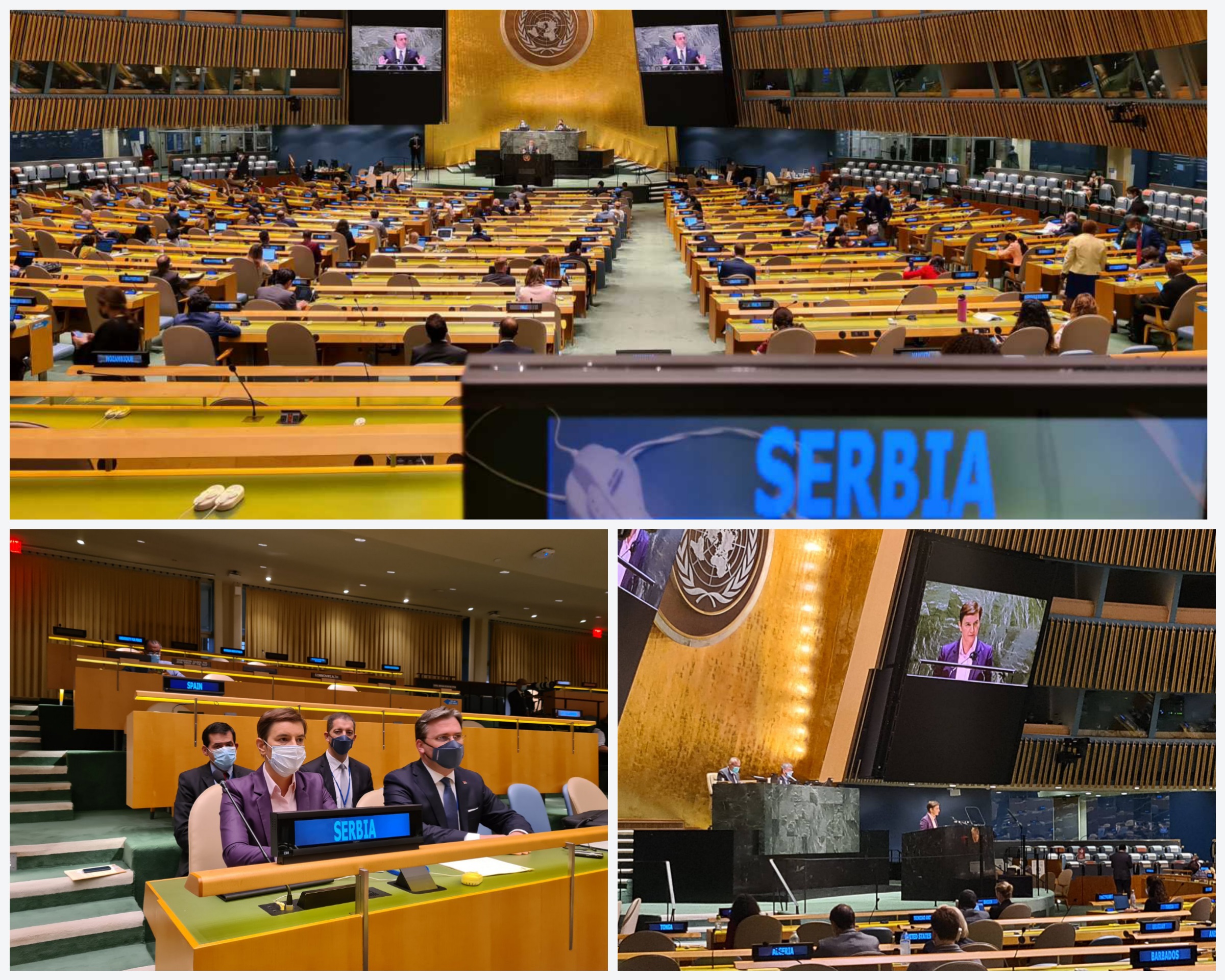
Prime Minister Ana Brnabic warned today that Pristina has seriously jeopardised local and regional stability after sending heavily armed special units to the north of Kosovo who are exerting ` against the peaceful Serbian population.
Brnabic spoke at the general debate of world leaders, as part of the 76th session of the UN General Assembly in New York.
We bring the Prime Minister's speech in its entirety:
Mr. President,
Mr. Secretary General,
Excellencies,
Ladies and gentlemen,
I have the great honor to address you today on behalf of the citizens of the Republic of Serbia.
Esteemed Excellencies Mr. Abdulla Shahid, Mr. Volkan Bozkir and Mr. António Guterres, I would like thank you for the active engagement, dedication, and leadership you have shown during these difficult times for the United Nations and all of humanity.
Serbia shares your conviction and we remain fully committed to supporting your efforts.
This year, we come together at a decisive moment in our history.
Covid-19 has shaken our foundations to the core.
At the same time, we are increasingly witnessing and experiencing effects of climate change.
And, finally, we are seeing significant shifts in global partnerships and alliances, trade wars between traditional partners and allies, protectionism instead of openness and free market, and overall uncertainty at an unprecedented scale.
Some of the pressing and extremely emotional issues that we have locally, in the Balkans, are still unresolved and while we are trying – and Serbia is especially dedicated to this – to change the future by working together and creating alliances, through initiatives such as the Berlin process or Open Balkan, others are trying to disrupt these processes, and instead of focusing on the future, they want to recreate the past – whatever the cost of that may be.
But, let me start with COVID:
COVID-19 pandemic has exposed critical weaknesses in the architecture of global governance. It has threatened to erase the progress many nations have achieved in recent years.
It has placed nations at a junction between isolation and collaboration, between panic and hope, between chaos and order.
The pandemic questioned some of the basic tenets of the open and cooperative international order.
Global exchanges, international communication, cross-border trade have all seen a vast decrease.
Curfews, restrictions on freedom and lockdowns of entire societies have created uncertainty in many segments of the individual lives of our citizens or – for that matter – our own individual perception of what freedom in today’s world even means.
For Serbia, this pandemic threatened to undermine everything we have been doing for the past 7 years, to crush all of the results and accomplishments of difficult reforms we initiated in 2014, and to propel us back to the times of high unemployment, rising public debt, uncontrollable deficit, and overall desperation.
Much as in any other country, COVID-19 has tested our nations’ resiliency and, this time, unlike during the global financial crisis – which was of much more limited scope and incomparable in consequences to COVID-19 pandemic – Serbia stood strong.
The reforms we undertook in the pre-COVID times made us more resilient than ever.
The fiscal consolidation, the budget surplus we had, efficient and predictable investment environment, became a lifeline that saved us from a recession during the pandemic and one that ensured we could support our citizens and our economy during these, most difficult of times.
Despite the effects of the crisis, Serbia has managed to preserve financial and economic stability. In 2020, we recorded a decline in GDP of only 0.9% – one of the best results in Europe. Our public debt remained below 60% of our GDP, average salary continued to grow by almost 10%, while despite the pandemic the number of people employed increased by over 3%.
The recovery in this year has been stronger than expected – our GDP will grow approximately 7%, and perhaps even stronger.
Prior to the pandemic, we have opened our borders to investment, technology, and ideas, and we managed to create peaceful and stable environment that allowed us to pursue rapid domestic transformation, with innovation and knowledge-based economy as the foundation.
The innovative advances we had made allowed us to diversify our capabilities when the virus hit – through e-Government, online education and digital textbooks, or central software system for a successful vaccination rollout.
We invested heavily in health infrastructure and strengthened the health system in order to respond to the current crisis, eternally grateful to the health care workers for their dedicated struggle.
Our decision to put geopolitics aside, and people at the center of our policies, is the reason we were able to acquire vaccines quicker than most other nations.
We did not discriminate between manufacturers, did not care whether vaccines are from the East or from the West, but chose to negotiate with all vaccine manufacturers deemed safe by regulators. This openness gave us the ability to purchase vaccines from around the world, giving our citizens the unique freedom to choose which vaccine they prefer.
Excellencies,
Serbia believes in solidarity between nations, multilateralism and helping others when in need.
Since the beginning of this year, we have made it our mission to support our neighbors, and all those in need, with COVID-19 vaccines and we have also allowed foreign nationals to come to Serbia to receive the vaccine which will protect their lives.
In total, Serbia has donated or allocated over a million doses of vaccines – of which 230.000 doses to the region; 300.000 doses for foreign nationals which came to Serbia to get vaccinated; and additional 570.000 doses to countries of Africa and Asia.
We will keep doing so, to the greatest extent possible, and until COVID-19 is behind all of us.
That is why we have also taken steps to acquire the technology to produce at least two types of COVID-19 vaccines to help improve global access so we can all be safe and victorious.
However, as stated by dignitaries of some of the largest nations during this General Assembly, there are other pressing issues that all of us need to keep addressing without any delay and in a bold manner – and that is climate change.
Serbia has redoubled its efforts to make our country safer and cleaner for its citizens, and by doing so, contribute to the fight against climate change and for environmental protection.
We are strongly committed to the implementation of the sustainable development goals and the Paris Agreement on Climate Change. We are committed to global efforts and will continue to work actively to meet our obligations under the UN Framework Convention on Climate Change.
We are about to submit our revised Nationally Determined Contributions to contribute to this critical global effort. We have already announced our intention to reduce greenhouse gasses for at least 33.3% compared to 1990, and 13.2% compared to 2010, which we are currently incorporating into our energy and climate strategic documents.
We work strategically on planning and investments in this sector. These investments are extremely expensive, requiring years and decades of commitment and a systemic approach - but we are clearly set on the path of this transformation.
Ladies and gentlemen,
Of all the challenges we face, the most worrisome for Serbia is the maintenance of peace and stability in the southern Serbian province of Kosovo and Metohija.
For more than two decades, we have been constantly drawing international attention to the problems that non-Albanian population is facing in Kosovo and Metohija. Physical safety, respect for and protection of human rights, especially of minority communities, are far from satisfactory.
We are now witnessing a constant increase in the number of attacks targeting Serbs, their property and religious heritage in Kosovo and Metohija.
To illustrate, there were 55 such incidents in 2014, 62 in 2016, 71 in 2020, and 100 since the beginning of this year. The total number of attacks in 2020 has already been surpassed by June of this year.
According to the UN, Kosovo and Metohija is still the territory with the least number of returnees (internally displaced Serbs) of all post-conflict areas in the entire world!
I will give you just a few examples to depict how life of Serbs in Kosovo and Metohija looks like.
On the 11th of May the house of Radoje Pumpalović, 81-years old returnee to Kosovo in the village of Dubrava, in Istok municipality, was attacked. This was the 5th attack on him in the same year. Again… he is 81 years old.
Since June 2021, multiple attacks were carried out against Dragica Gašić, 59-years old woman, the first Serb returnee in Đakovica after 22 years since the end of the conflict. Attacks include stoning of her apartment, banning her from shopping for food in the local store and petitions by civil society organization demanding her eviction from the city.
On 2nd of July, in the village of Gobulji near Vučitrn, a group of Albanians attacked 13-year old Nikola Perić. The attack occurred when he was returning home from the school playground with three friends.
Attacks on Serbian medieval churches, monasteries and monuments in Kosovo and Metohija, make them some of the most endangered cultural heritage sites in Europe.
Monastery Visoki Dečani was recently listed, by Europa Nostra, as one of the 7 Most Endangered Heritage Sites in Europe in 2021. The Advisory Panel of Europa Nostra noted that Dečani is the only monument in Europe under robust military protection for a continuous period of 20 years, although it constitutes a monument of ultimate historical and cultural importance for Europe and the world.
This spiral of violence occurring in Kosovo and Metohija culminated at the beginning of this week. On the pretext of enforcing new license plate rules, Priština dispatched heavily armed special units to the north of the province. This is yet another brutal violation of the Brussels Agreement, and this irrational show of force has ignited a major crisis. It disrupted the supply of food and medication to Serb communities in the north of the province. Local Serbs who peacefully gathered to protest this measure were met with tear gas and police brutality, thus seriously threatening local and regional stability.
Despite of all the challenges and daily provocations, Serbia remains strongly committed to finding a compromise-based solution that will ensure lasting peace and stability.
Dialogue and the implementation of the agreements reached – are the only proper way to resolve all open issues.
However, almost 9 years after reaching the Brussels Agreement, as the 1st agreement on normalization between Belgrade and Priština, the establishment of the Community of Serb Municipalities – the backbone of this agreement – has not yet even begun.
I would like to appeal, once again, to the international community, and especially the European Union, as the guarantor of the Brussels Agreement, to firmly insist that the Provisional Institutions of Self-Government in Priština start implementing all of the agreements reached.
The Republic of Serbia, by defending its sovereignty and territorial integrity, at the same time defends international law, the UN Charter, legally binding UN Security Council Resolution 1244, and the supreme authority of the Security Council when it comes to the preservation of international peace and security.
We attach special importance to the activity of the UN mission in Kosovo and Metohija and expect it to continue to implement its mandate in the Province in accordance with this resolution.
Dear friends,
Our generation shares the common destiny of the modern world, which is becoming increasingly complex in terms of geopolitics, technology, health, climate. In the face of these challenges, Serbia will continue nurturing international partnerships, on a predictable and transparent basis.
We will continue pursuing the rule of law reforms on our EU path, which is our strategic foreign policy goal. We see this as inseparable from achieving sustainable peace, stability and prosperity.
We will host, together with the Republic of Azerbaijan as the current chair of the Non-Aligned Movement, a commemorative high-level event marking the 60th anniversary of the First Non-Aligned Movement Conference, which was held in Belgrade in 1961. We are very much looking forward to hosting our friends from all parts of the world in Belgrade in October this year.
We will further enhance cooperation across the Balkans, through the Open Balkan initiative and Berlin process, by opening borders, harmonizing differences, and further integrating our region.
In conclusion,
Over the past 7 years, Serbia has been transformed: we sparked an economic revival, created opportunities for young people, cultivated a tech boom, and improved Serbia’s position abroad. The progress we have made has allowed Serbia to better face and survive the pandemic.
The world now faces a turning point. The recovery from COVID-19 and sustainable reconstruction will not proceed if issues, new and old, are not handled by joint forces and collaborative international actions.
This pandemic taught us one important lesson: unless all of us are safe, no one is safe – so we can either win together, all of us – regardless of how rich or poor, large or small, from Europe, Asia, Africa, America or Australia, or fail together.
But, if anything, the COVID-19 pandemic, as well as the issue of climate change, should have taught us to stand together.
Thank you.
Source: www.srbija.gov.rs |
|
|
| Prime Minister Brnabic at Global COVID-19 summit organised by White House |
|
22 September 2021
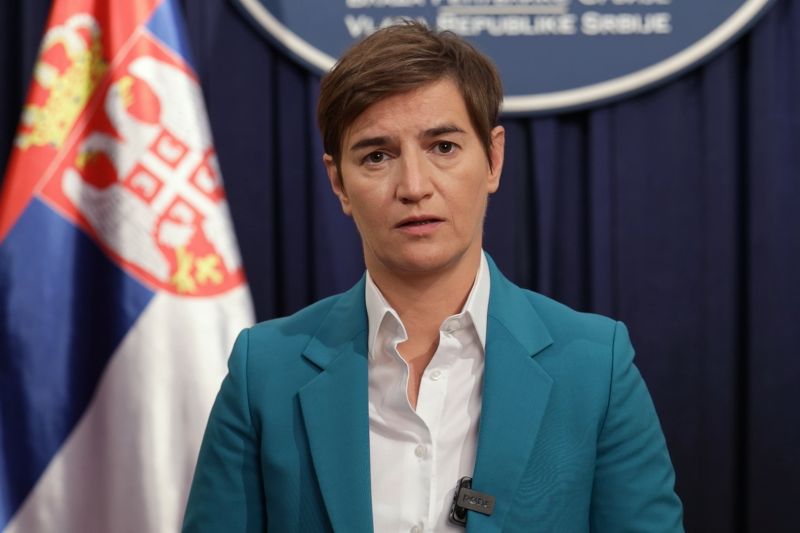
Prime Minister Ana Brnabic participated today at the Global COVID-19 summit, organised by the White House, which was opened by US President Joseph Biden.
The video messages are attended by a large number of world leaders and officials of international organizations, including UN Secretary General Antonio Guterres, European Commission President Ursula von der Leyen, British and Canadian Prime Ministers, Boris Johnson and Justin Trudeau, German Chancellor Angela Merkel and many others.
In the message, the Prime Minister pointed out that Serbia was among the first European countries to procure a covid vaccine, and that she was the first European Prime Minister to receive the vaccine.
Thanks to years of investment in digitalisation and development of eGovernment, we have managed to organise a complicated and complex vaccination process very efficiently and in a way that it is focused on citizens, she explained.
However, as she added, from the very beginning we were aware that this is not just a matter of our citizens and only our struggle. In the fight against the COVID-19 pandemic, we are all safe or no one is safe.
That is why, in addition to procuring vaccines for our citizens, we donated vaccines to the citizens of the Western Balkans, but also to other countries, she reminded and specified that Serbia donated 230,000 doses of vaccines to the region, we vaccinated foreign citizens in Serbia with approximately 300,000 doses and set aside we have 570,000 doses of vaccines for countries in Africa and Asia.
Brnabic mentioned that Serbia has already started the production of covid vaccine from one manufacturer, and that it will start production from another by the end of the year, because in that way we want to help and support all people and countries that need vaccines.
This is a pandemic in which we will either win together or lose together, but we must fight together, the Prime Minister repeated.
That is why Serbia supports the goals of this global summit, she emphasised, and expressed her gratitude to the United States of America and President Biden for organising the summit and supporting joint efforts in the fight against the COVID-19 pandemic.
Vaccines are the only way out in the fight against the pandemic, concluded Brnabic.
|
|
|
| Cipriani company interested in investing in Serbia |
|
23 August 2021
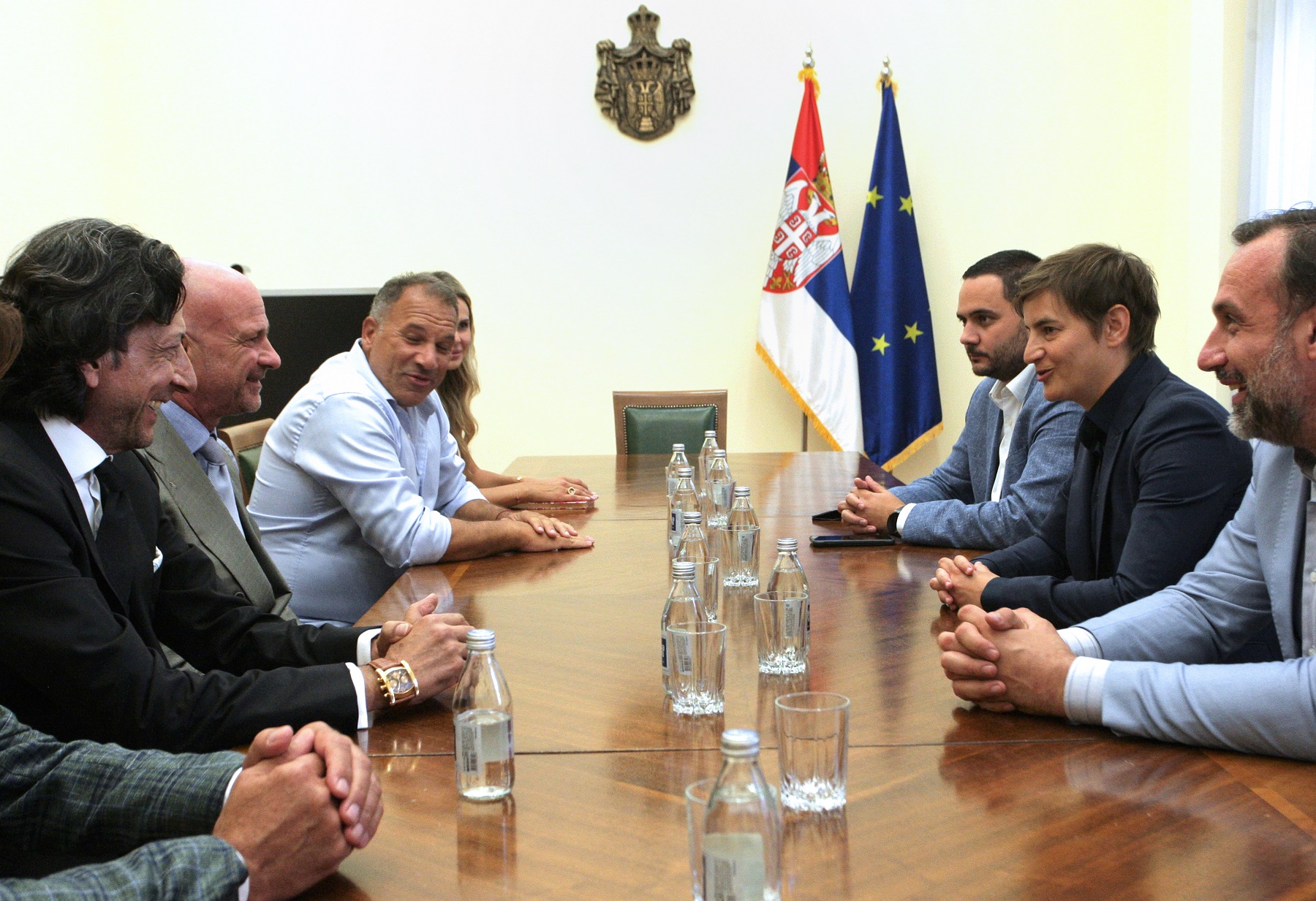
The Prime Minister of the Republic of Serbia, Ana Brnabić, talked today with the director of the Italian company Cipriani, Giuseppe Cipriani, about potential investments in Serbia.
Brnabić informed her interlocutor about the most important economic indicators and investment opportunities in our country, emphasizing that Serbia has been continuously working on improving business and investment conditions since 2014, and that both Serbia and Belgrade have great potential for new investments.
She talked with Cipriani about the possibilities for cooperation and potential investments of the company, which is one of the leaders in the field of catering and hotel management.
Cipriani said he would be happy to visit Belgrade again to continue the talks about investments.
Source: www.srbija.gov.rs
Photo: Tanjug |
|
|
| Marking the Remembrance Day of all Serbs who died and were expelled in the armed operation "Storm" |
|
5 August 2021
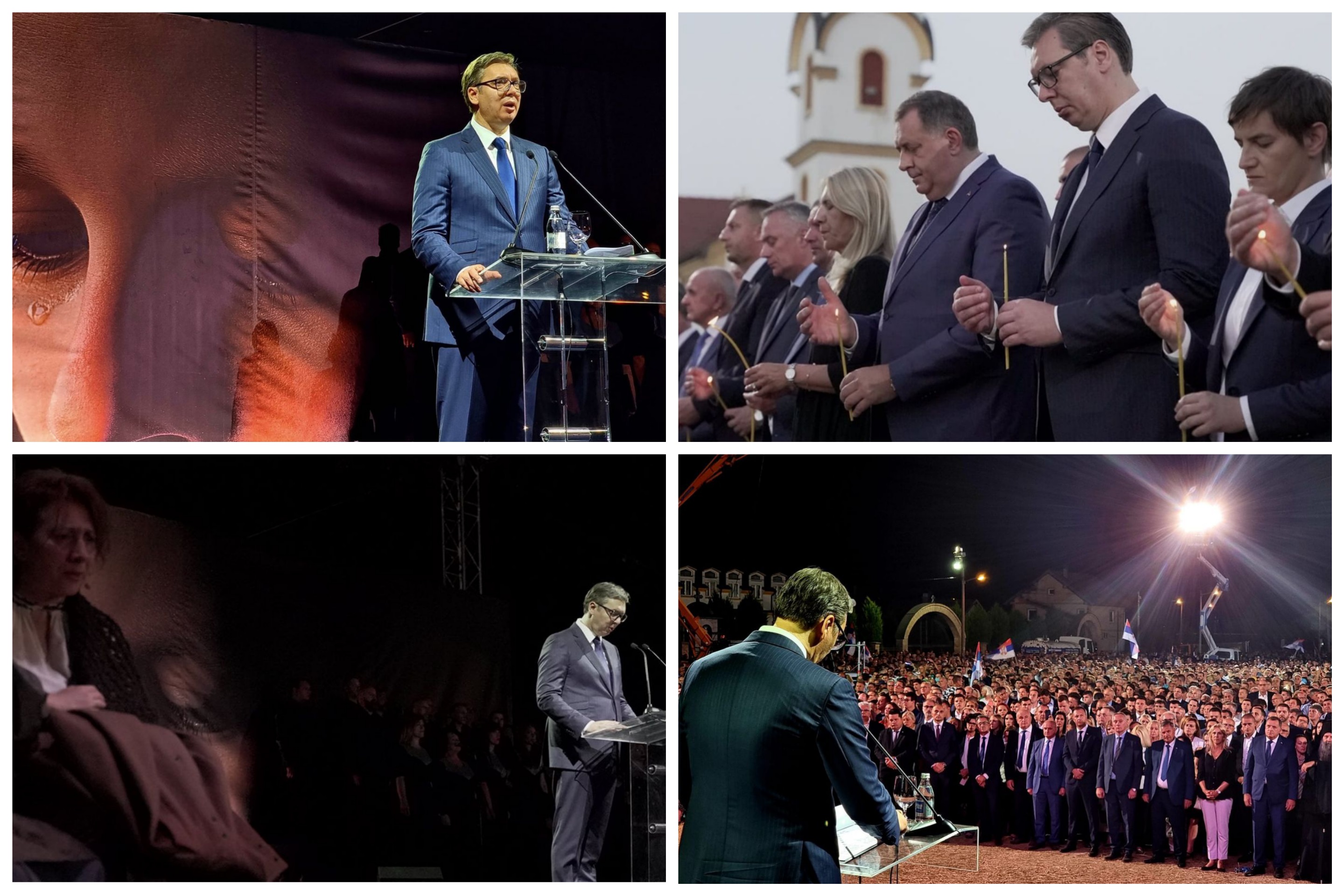
The President of the Republic of Serbia, Aleksandar Vučić, attended the marking of the Remembrance Day of all the victims and expelled Serbs in the armed operation "Storm" and said that Serbia remembers!
"Today, when we remind ourselves again of what happened in August 1995, the terrible pogrom, the expulsion of more than 250,000 Serbs, the exodus and ethnic cleansing, we, at the same time, and finally, remind ourselves of who we are, what we are, where we come from and where we are going. Thank you all for being here together tonight and for showing how much we love our people", said President Vučić, adding that we will not forget any of the things that the Krajina people had to go through.
"For us, these are not just terrible numbers of victims", said President Vučić and emphasized that Serbia will not forget.
"History has never been rewritten like today. That is why I want to remind us all not only of what others have done to us, not wanting us to exist, but also of what we have done to ourselves, just as if we ourselves did not want to exist", said the President, noting that we must never again allow Serbia to forget its silent heroes.
President Vučić emphasized that we must never again cover our eyes, ears, and mouths in front of something that truly was a pogrom and the downfall of all humanity.
"Pretending that this is not true, avoiding saying it, is a crime not only against the victims, but also against ourselves, every living Serb, people from Krajina, as well as Serbia and its future", said President Vučić and underlined that people can stand up straight and live with themselves and the others without hesitation, fear and doubt, only if they remember.
President Vučić pointed out that Serbia must fight for peace and cradles with children, as well as that not remembering annuls and erases us from the history and the future, depriving us of the right to tomorrow.
"Our mission is a happy future for us and for the new generations! Today's Serbia is based on a clear identity and a culture of remembrance", said President Vučić and reminded that everything that had been neglected for decades had been done, and that a strong Serbia has become the master of its own destiny.
"Eternal glory to you, Serbian martyrs who perished in the "Storm" and all other pogroms. Your children are in their Serbia, taken care of, loved and successful. Sleep peacefully, Serbian falcons, the future of your children is our vow", concluded President Vučić and thanked everyone who showed that night how much they love their country and that Serbia remembers.
Source: www.predsednik.rs
Photo: www.predsednik.rs |
|
|
| President Vučić: We have decided – our goal is the EU, but China is an important partner |
|
22 July 2021
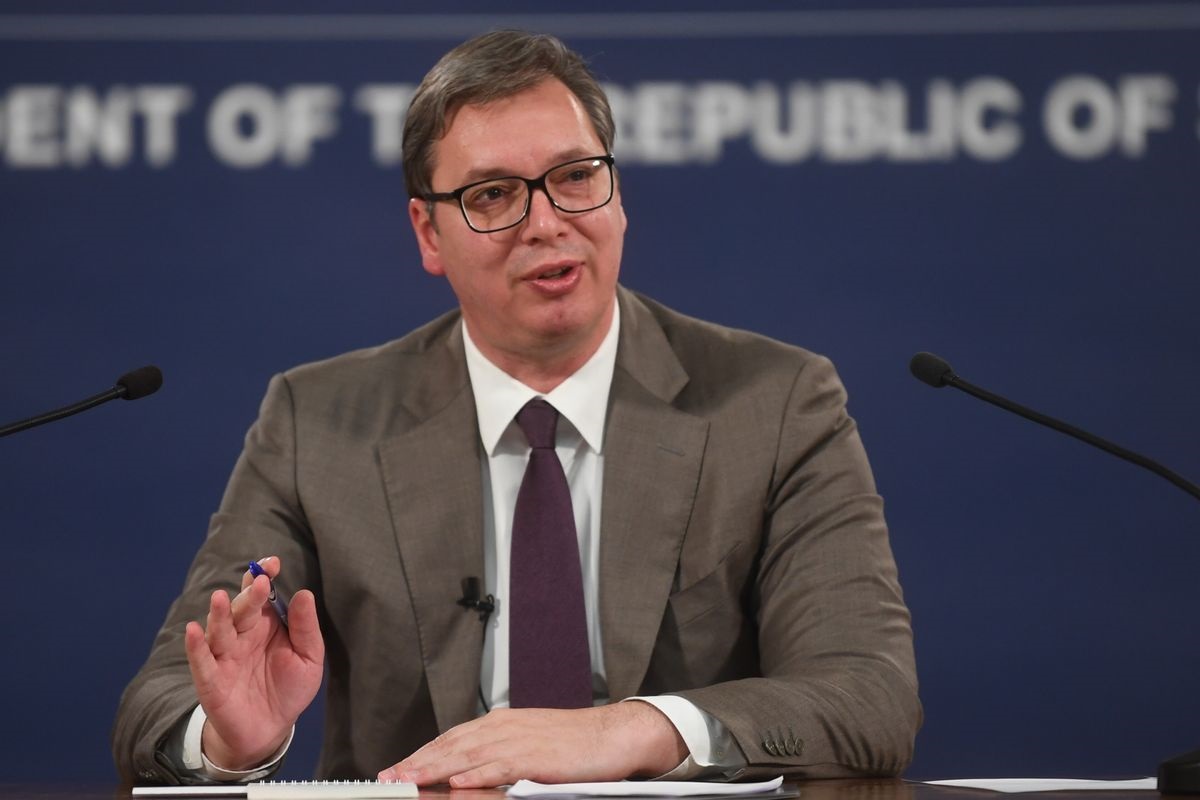
We have decided – our goal was and remains the EU, Serbian President Aleksandar Vučić said in an interview with the German daily "Handelsblatt", adding that there is no alternative for Serbia, but also stressing that China is an important partner for Serbia, and that the task of the state is to take care about the interests of its citizens.
He thus answered the question of what Serbia will choose once it has to choose between close relations with Beijing or the EU. Vučić emphasized that Serbia wants to become a full member of the EU.
"We are connected by history, common culture, EU members are already undoubtedly our most important partners", he explained and added that the trade exchange between Germany and China is 3,000 times higher than between Serbia and China, and, as he noted, even despite that, Serbia's business operations with China are portrayed as a problem.
To the statement that the German Chancellor Angela Merkel did not congratulate the 100th anniversary of the Communist Party of China, and that he did so, he replied that Serbia is not Germany, but a small country. On additional insistence on what Serbia will do if it has to choose between the EU and China, he underlined that Serbia has already decided, that its goal was and remains the EU membership.
"Our biggest investors are from the EU. The EU accounts for 67% of our trade while 17 percent of the trade is with countries of the region that are all on the way to the EU. We cannot survive without the EU", he added.
"But can we do a lot of good things with China – of course. And we do that, just like Germany does", Vučić pointed out, and to the remark that the quality of the Silk Road projects was being criticized, primarily because of Chinese workers, he answered that the quality of roads or bridges, which Serbia is building with China, is excellent.
"We give jobs to those who submit the best offer to us. That is why I tell Europeans who criticize Chinese projects in our country – offer us a project for one euro more and you will get it", he emphasized.
In that regard, he pointed out that Serbia is building a railway to Northern Macedonia with 600 million euros of EU aid, stating that that offer was better than China's.
"There is often talk of a 180-kilometer railway to Budapest through the territory of Serbia, which is financed by China. But the railway that is being built with the help of the EU from Belgrade to the northern Macedonian border is twice as long and no one is talking about it. It is all too political", he stated.
Asked whether he welcomes the plans of the EU and the USA regarding an alternative initiative to the Silk Road, Vučić said that he supports everything that brings advantages to our region.
"The Chinese want to expand their presence everywhere, but many processes in the West are, frankly, more efficient and without problems. We still have a lot to learn from the West, but we are getting there", Vučić said.
He pointed out that China was an important partner for Serbia and added that when the consolidation of state finances began in 2014, our country received good conditions from China for development projects.
He also stated that a competition for a copper mine was announced in eastern Serbia, at the request of the EU, that no European company had made an offer for six months, and that it had then been taken over by the Chinese.
"Our job is to take care of our people", he said.
He reminded that the Serbian economy grew by 52% in eight and a half years, which for the EU means that Serbia could be a strong member and engine for the entire region.
Explaining how Serbia is developing so well economically, he pointed out that Serbia has an excellent workforce, which speaks English, that society and administration are digitalized, and that it has the most flexible labor law in Europe, as well as consolidated public finances.
He reminded that previously the public debt was at 78% of GDP, and that today it has been reduced, thanks to the strong growth of the economy, to 52%.
"We can afford to give investors an incentive to come", he added, emphasizing that Serbia offers investment assistance, but that, for example, subsidies were not the motive for the arrival of the development center of the company Continental.
He pointed out that, five or six years ago, only Serbia started using the dual education system in this region, which Germany, Switzerland and Austria also use, that tens of thousands of people are in dual education, and that this is appreciated by foreign investors, who, in addition, can work closely with universities as well.
Germany, he stated, is the most important trade partner and the largest investor.
We started with the arrival of small textile companies from Turkey, and now primarily large German companies are coming. Today, 71,000 people work in German companies in Serbia", he explained.
Vučić said that the European perspective is very important for investors, stating that Nidek, Toyo Tires or Mitsubishi are coming from Japan to Serbia because our country is on a stable European path.
Asked if he believes that Serbia will become an EU member in the foreseeable future, he said that he does not complain.
"It is certain that if we had received 45 billion euros of EU aid, we would have been much further economically. Instead, we received 1.6 billion euros from the EU. We are used to achieving our successes on our own", said Vučić.
The President of Serbia reminded that in Croatia, salaries used to be 2.2 times higher than in Serbia, and today they are only 1.7 times higher.
"We are closing the gap with our own efforts. If we were to become a member of the EU, then we would certainly not ask for the biggest subsidies", he assures.
He said that the Serbian path follows the German path to Europe, and that Serbia wants a fair chance.
"I believe Merkel's words. She is at the end of her term and I would not have to praise her anymore. But she gave us stability, freedom of travel to the EU, helped us with the migrant crisis in 2015, and asked the Minister of Economy Altmeier and others to work closely with us", he reminded.
Asked if there were any indications that the new German government would support Serbia in the same way, Vučić expressed confidence that it would be the same.
"I know Armin Laschet, I talked to him while he was the Minister-President of North Rhine-Westphalia. He is very smart and understands the situation in the Balkans, and he will certainly continue Merkel's policy towards our region as the new chancellor", he added.
Vučić also expressed his belief that Russia, if Serbia's accession to the EU were concretized, would not react similarly as in the case of Ukraine, as this is a sovereign decision of Serbia.
To an additional question in this regard, Vučić pointed out that whenever he met with Vladimir Putin, and there were 18 or 19 meetings, he told him that he was grateful for the traditionally close friendship with Russia, but also that Serbia is on a clear course towards the EU.
"He asked if it was our choice and I answered that EU membership is indeed our goal", he added.
When it comes to "Kosovo", Vučić emphasized that a compromise is needed regarding this issue.
"Only in this way can there be sustainable peace. Serbia wants peace, me as well. Let's stop with the madness of the past. Only then can the whole region become the engine of new growth for Europe", said Vučić.
Source: Tanjug
|
|
|
| Serbia has achieved great success in the field of digitalization |
|
20 July 2021
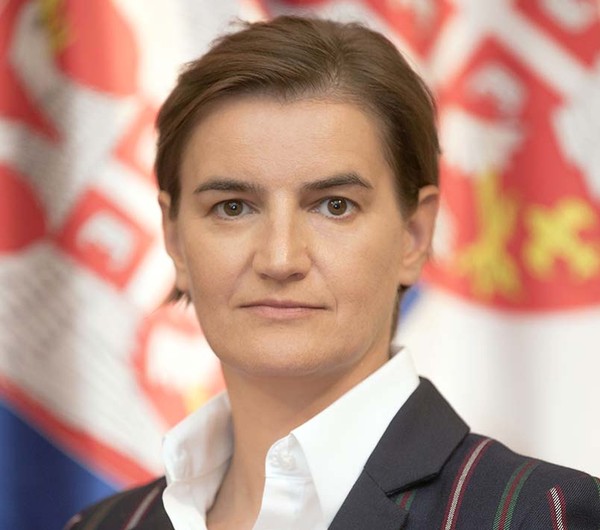
The Prime Minister of the Republic of Serbia, Ana Brnabić, stated at a gathering dedicated to digitalization and the IT sector, which was held in New York, that since she became Prime Minister, she is most proud of Serbia's success in the field of digitalization.
Brnabić, who is on a two-day visit to the United States, said that when she was elected Minister of Public Administration and Local Self-Government in August 2016, she wanted to do everything to change the public administration and what bothered her as a citizen.
She stated that, when she took office as Prime Minister, she knew what her priorities were and that first of all, digitalization needed to be raised to a higher level, that the education reform was supposed to begin, as well as work on strengthening the economy.
I believed in a country that believes in its people, because the Serbian people are creative. From 1 June 2017, we started working as an e-Government, i.e. we started exchanging data electronically, said the Prime Minister.
According to her, our citizens no longer had to go to, say, the Tax Administration, and since then, the public administration has exchanged 50 million documents, which means that citizens did not have to go from office to office for 50 million papers.
Brnabić pointed out that she is proud of what has been done in the field of education since she became the head of the Government, specifying that in September 2017, programming was introduced as a compulsory subject in primary schools.
Nobody believed that we could do that, but we cooperated with the private sector and some social organizations and we succeeded. At the moment, we are far ahead of numerous countries in Europe and the world, said the Prime Minister.
The Prime Minister pointed out that she was most proud when the cornerstone was laid for the science and technology park in southern Serbia, noting that so far, our country has four science and technology parks.
She pointed out that Serbia has since become one of the most successful countries in the world in the field of technology, and that according to some parameters, it is among the ten countries in the world, or among the five, assessing that this is proof that the country can change quickly.
Answering the question about vaccination, the Prime Minister emphasized that our country has never seen it as a geopolitical issue, but as a health issue.
According to her, Serbia talked with producers from both the East and the West and was among the first European countries to sign agreements with the company Pfizer-BioNTech and Sinopharm.
Unfortunately, many countries have viewed this issue as geopolitical. It did not matter to us, as long as the vaccines were safe, the Prime Minister emphasized and added that this was not the end of Serbia's success, because good organization was also needed.
Brnabić explained that the organization is another important thing in vaccination, because it is a logistically very difficult process, adding that, with the help of digitalization, success has been achieved and that everything we did in the previous years has paid off.
She stated that Serbia quickly established a system through which citizens could express interest in vaccination against the coronavirus and choose which vaccine they wanted to receive, as well as to be informed by a message when to go and get vaccinated.
Now I can log in on my phone, to see how many people have received the vaccine, how many more have registered, so that the effects of digitalization are obvious. We have made everything very efficient and easy for our citizens, the Prime Minister explained.
Answering the question of what she can tell other countries of the world about how to progress faster, Brnabić said that it is important to invest as much as possible in digitalization and education.
You need to teach children how to think, not what to think. Not all children will become IT experts, but what they can learn is an algorithmic way of thinking and how to make decisions, she said.
The Prime Minister mentioned investing in high-speed internet and providing infrastructure for start-ups as an important thing for progress, because more and more economies will be based on start-ups and innovations, emphasizing that people should be helped to start companies and implement their ideas.
Speaking about social networks, she pointed out that fake news has become the biggest problem on these networks and that it will remain so for some time.
This is the biggest challenge I face as Prime Minister, especially during the corona virus pandemic, she said, adding that social networks are also a great opportunity for politicians to communicate with citizens.
Source: www.srbija.gov.rs
Photo: www.srbija.gov.rs |
|
|
| Serbia strongly supports Berlin Process |
|
5 July 2021
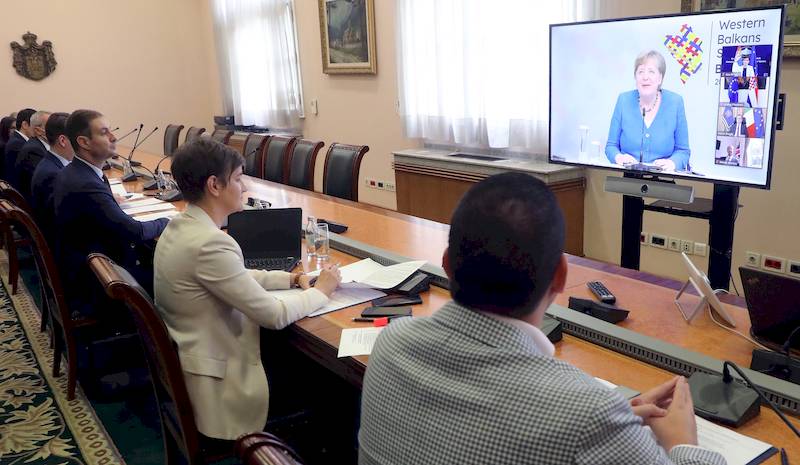
Prime Minister Ana Brnabic participated today in the online Summit of Leaders of the Berlin Process, which discussed the concrete results achieved during its seven-year term, plans for the next period and initiatives aimed at providing support Western Balkans on its way to the European Union.
The focus of the summit was on building a common regional market related to four fundamental freedoms: free movement of people, goods, services and capital, for which the Action Plan was adopted in November last year, and from which the region would have special benefits.
The summit said that the transport and energy infrastructure has been expanded in recent years and connected to the roads of the European Union, and praised the implementation of the agreement on the abolition of roaming fees in the Western Balkans, which began this month.
An important project of the process is the Regional Office for Youth Cooperation (RYCO) in order to connect and build understanding and tolerance in the region.
The activities of the Regional Cooperation Council (RCC) and the Secretariat of the Central European Free Trade Agreement (CEFTA) were also praised for their efforts to implement the Common Regional Market Action Plan.
Assessing that the Berlin Process is firmly based on the fundamental belief that the economy of the Western Balkans is part of Europe, German Chancellor Angela Merkel pointed out that it greatly contributes to stability and connecting the Western Balkans region, which is also in the interest of the European Union.
In her address today, Prime Minister Ana Brnabic thanked German Chancellor Angela Merkel for her strong support and active approach to regional cooperation.
Thanks to the support of Germany and Chancellor Merkel, but also to the internal initiatives of the representatives of Serbia, Albania and North Macedonia, the Prime Minister explained, the implementation of the Action Plan will enable further expansion of economic and trade cooperation in the region, which will make it more attractive for foreign investors.
Brnabic pointed out that Serbia strongly supports the Berlin Process, not only for the purpose of economic development of the region, but also as an idea of connecting and unifying the Western Balkans and its approach to the European Union.
She concluded that support in the region was particularly visible through solidarity with neighbours during the pandemic and assistance with vaccines and medical equipment.
The summit, opened by German Chancellor Angela Merkel, was attended not only by representatives of the region, but also by Slovene Prime Minister Janez Jansa, European Commission President Ursula von der Layen, Austrian Chancellor Sebastian Kurz, French President Emanuel Macron, Italian Prime Minister Mario Draghi and Polish Prime Minister Mateusz Jakub Moravjecki and Secretary General of the Regional Cooperation Council (RCC) Majlinda Bregu.
Source: www.srbija.gov.rs
Photo: www.srbija.gov.rs |
|
|
| Minister Selaković with future defense attachés of the Republic of Serbia |
|
25. June 2021.
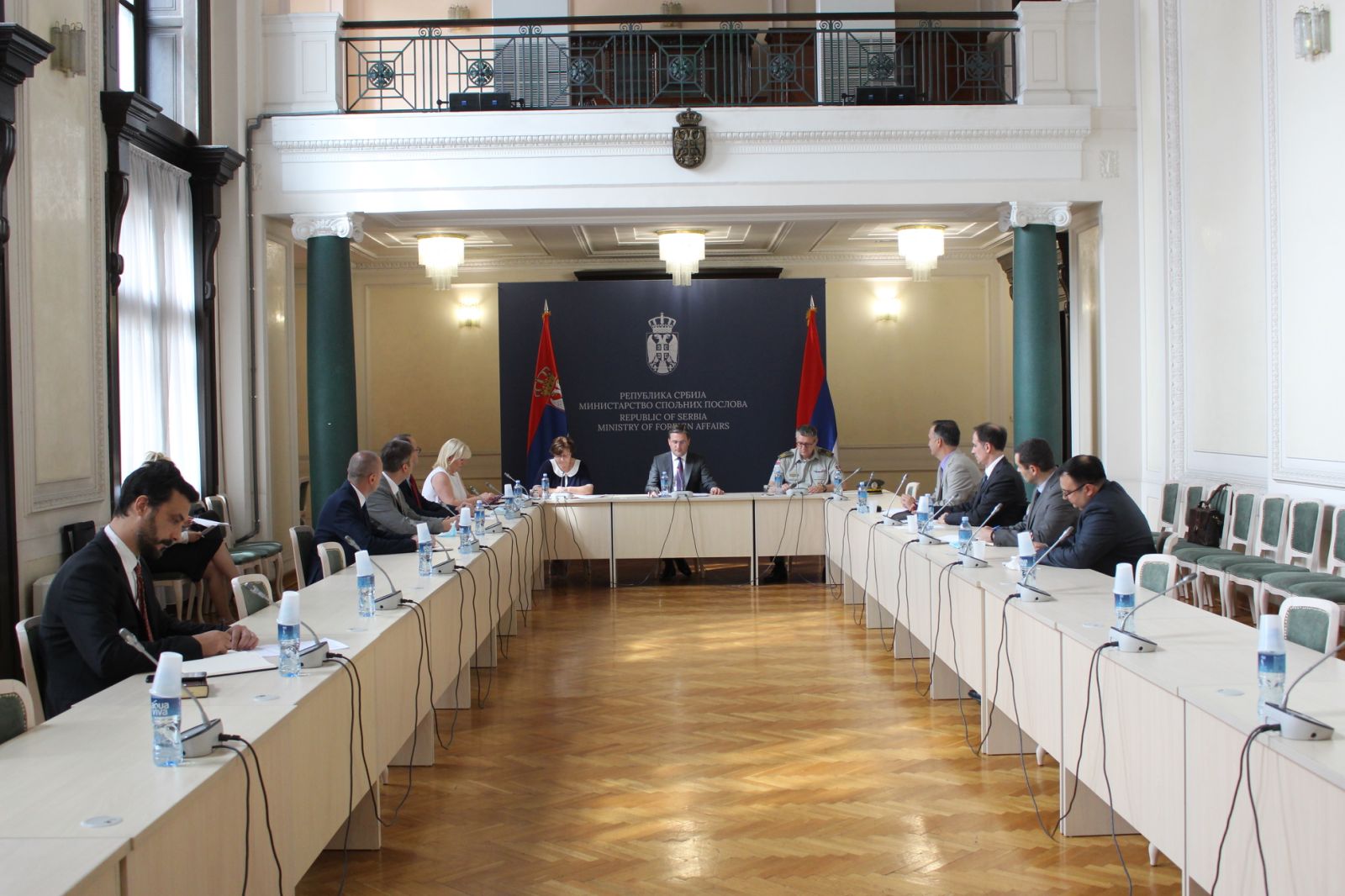
The head of Serbian diplomacy, Nikola Selaković, talked today with future defense attachés at the Serbian Ministry of Foreign Affairs, who are preparing to go abroad.
Minister Selaković wished the future defense attachés of the Republic of Serbia success in their work, emphasizing that they will have the full support of the Ministry of Foreign Affairs and our diplomatic and consular network in the performance of their work.
Selaković briefed a group of future defense attachés, who will serve in Montenegro, the United Kingdom, Germany, Croatia, Belgium, Italy and Romania, on Serbia's foreign policy priorities.
Minister Selaković paid special attention to explaining the directions of our regional policy, emphasizing that preserving regional stability and promoting economic cooperation are priority goals.
|
|
|
| President Vučić participates in the Mini Schengen conference |
|
29th June 2021
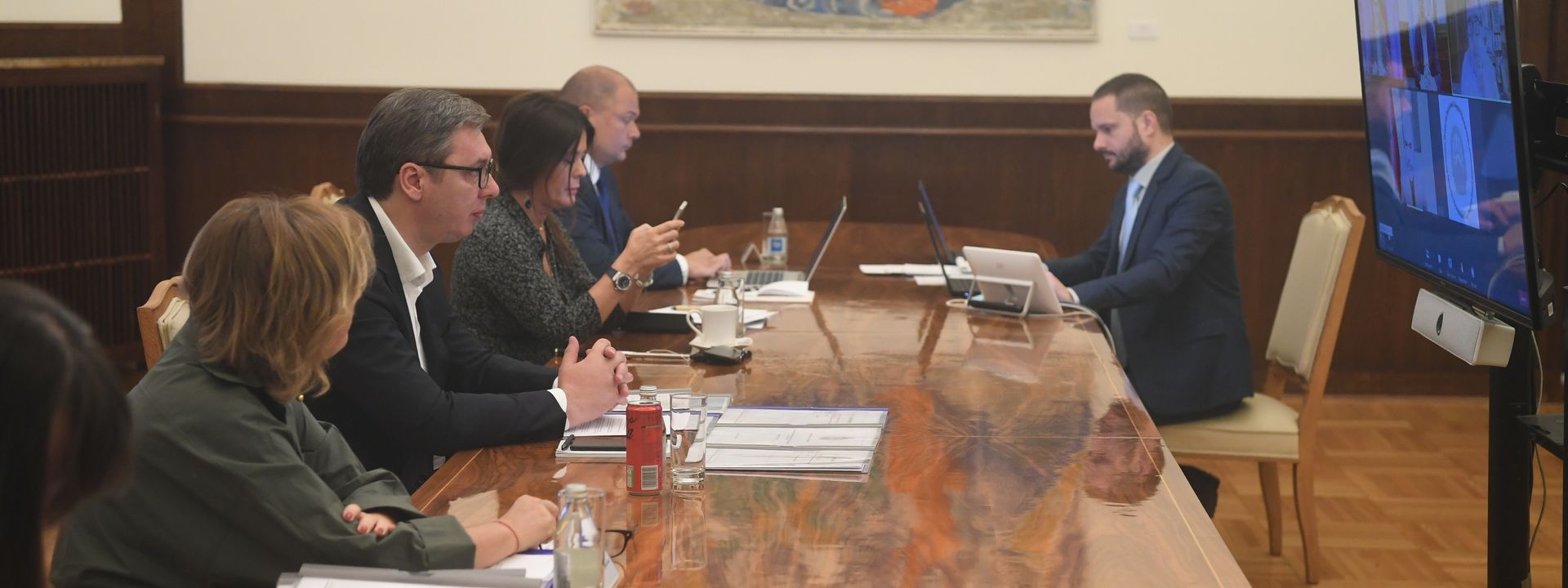
President of the Republic of Serbia Aleksandar Vučić participated today via a video link in the conference "Mini Schengen" with the Prime Minister of the Republic of Albania, Edi Rama, and the Prime Minister of the Republic of North Macedonia, Zoran Zaev. The officials discussed further steps in regional cooperation, as a process vital to the progress of the Western Balkans and the European path as a whole.
The interlocutors agreed that the countries of the Western Balkans need membership in the European Union, but also that the European Union needs the Western Balkans just as much since the region is surrounded by EU borders and the countries aspiring to membership share common European values.
The President of Serbia and the Prime Ministers of Albania and North Macedonia have expressed the wish that the four European freedoms - the movement of people, goods, services and capital, begin to be implemented as soon as possible throughout the region, and that in this context they will provide full support to the regional common market at the Berlin Process Summit to be held on the 5th July.
"We are aware that only by working together and accepting regional cooperation within various regional initiatives such as the common market, regional Schengen, green corridors or the Berlin Process, can we bring our economies closer, increase the well-being of our people and bring in large investments that would otherwise not be possible for any of us individually", is one of the joint conclusions of this video conference.
The interlocutors agreed to meet in Skopje on July 29th to review the progress in the implementation of existing initiatives and projects and to sign additional agreements between the three countries related to the implementation of the Berlin Process commitments, as well as cooperation and assistance in the event of natural disasters and relief measures for trade, export and import.
"We call on and encourage our colleagues from the region to sign and implement similar agreements, so that the vision of a common political and economic space across the Western Balkans would soon, through the single market, become an important part of our citizens' daily lives," said the Serbian President and Prime Ministers of Albania and North Macedonia.
The interlocutors pointed out that despite the delays in the enlargement process, they will continue to try to identify new ways, policy areas and financial instruments for all three countries to increase their contribution to Europe, strengthen ties with the European Union and gradually integrate the region into the single European market.
Speaking on the Green Agenda, the interlocutors issued a joint call to the European Union and the United States to join countries across the region to support the development of projects that could be invested as soon as possible to improve environmental protection and increase the widespread use of renewables as part of the EU Economic and Investment Plan implementation and the Green Agenda for the Western Balkans.
"Our countries have a huge potential for sustainable growth and development of this sector. We will ask for practical support to find out which projects can improve our region in terms of renewable energy sources for our citizens and for the green energy future of the EU ", said the interlocutors during the "Mini Schengen" video conference and concluded that only regional connecting, with the EU support, can contribute to the overall stability and progress of the entire region and Europe.
Source: www.predsednik.rs
Photo: www.predsednik.rs
|
|
|
| Meeting with the Minister of Foreign Affairs of the Republic of Italy |
|
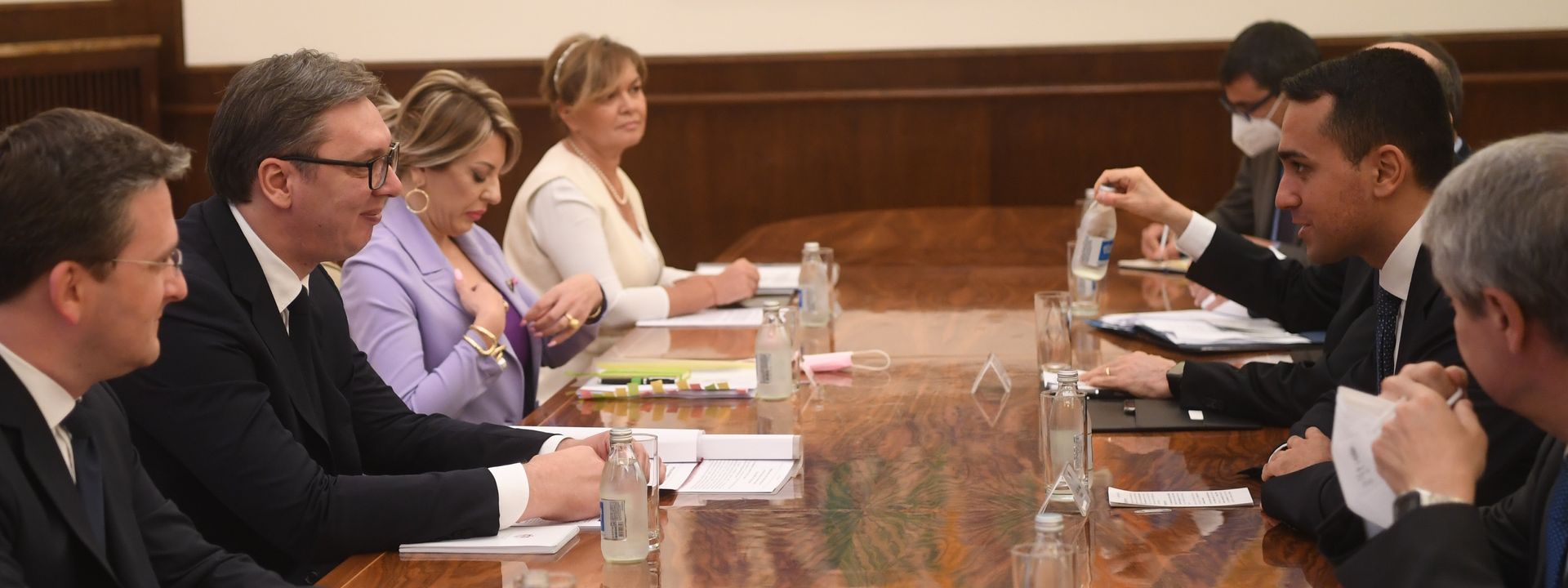
22.06.2021.
President of the Republic of Serbia Aleksandar Vučić met today with the Minister of Foreign Affairs and International Cooperation of the Republic of Italy, Luigi Di Maio, with whom he asserted that the relations between the two countries are featured by a high degree of mutual understanding.
President Vučić and Minister Di Maio expressed hope that the fourth joint session of the governments could be held by the end of the year as it would give a strong impetus to comprehensive cooperation between the two countries, following the Strategic Partnership Agreement.
President Vučić also expressed satisfaction that the Government of Prime Minister Dragi placed our region high on the list of foreign policy priorities because peace, stability and cooperation are of the utmost importance for the future of the Western Balkans. That is why, on this occasion, he informed the head of Italian diplomacy about the course of the dialogue between Belgrade and Priština. President Vučić pointed out that Serbia always strives towards dialogue as a way of resolving open issues and fighting for compromise while protecting its state and national interests.
President Vučić thanked for Italy's open support for Serbia's European integration, and in that regard, Italian Foreign Minister Di Maio confirmed that Italy is an advocate of Serbia's entry into the European Union and is ready to help us in the negotiation process, especially in implementing the necessary reforms.
Minister Di Maio congratulated the Serbian authorities on the excellent results in vaccinating the population and reiterated Italy's gratitude for the medical assistance provided by Serbia in the most difficult moments, emphasising that Serbia is still showing solidarity, by giving vaccines to the countries in need.
The two interlocutors expressed satisfaction with the bilateral economic cooperation because Italy has been among the most important economic partners of Serbia for years, while trade exchange is on the rise again.
www.predsednik.rs
|
|
|
| Support of Italy to Serbia in European integration process at all levels |
|
22.06.2021.
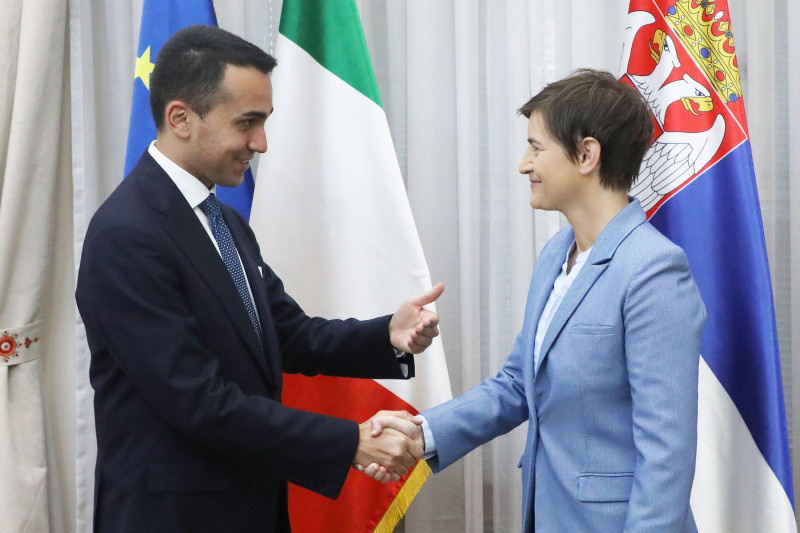
22 June 2021
Support of Italy to Serbia in European integration process at all levels
Prime Minister Ana Brnabic spoke today with Italian Minister of Foreign Affairs Luigi Di Maio about the most important economic and political processes in the country and the region and the support which Rome provides to Serbia in the process of European integration at all levels.
Brnabic said that Serbia is carefully observing Italy’s recovery from the consequences of the coronavirus pandemic, given that this country is one of Serbia’s most important economic partners. She underlined that our country cannot be strong without a strong Italy.
Speaking about the reforms that are being carried out on the path to full membership in the European Union, the Prime Minister emphasised that Serbia is ready to open two clusters, and that Italy has once again proved to be a friendly country in the enlargement process by sincerely advocating their opening.
According to her, the stability of the region is of special importance, both in the economic and political sense, and that is why Belgrade is doing everything to start a dialogue with Pristina, as well as to strengthen regional economic connections.
The Italian Minister of Foreign Affairs praised Serbia's efforts in the fight against the pandemic and the vaccination of the population against coronavirus, noting that other countries, not only the region, but also the EU, will have to recognise Serbia’s achievements too.
When it comes to EU enlargement, Di Maio said that Serbia is a natural part of Europe and that is why Italy provides it with all kinds of support on that path, and that bilateral relations between Italy and Serbia serve as an example to other members of the Union.
He also said that he agrees that the joint session of the two governments will give additional impetus to the high-quality interstate relations.
www.srbija.gov.rs
|
|
|
| Address by the President of the Republic of Serbia at the session of the United Nations Security Council |
|
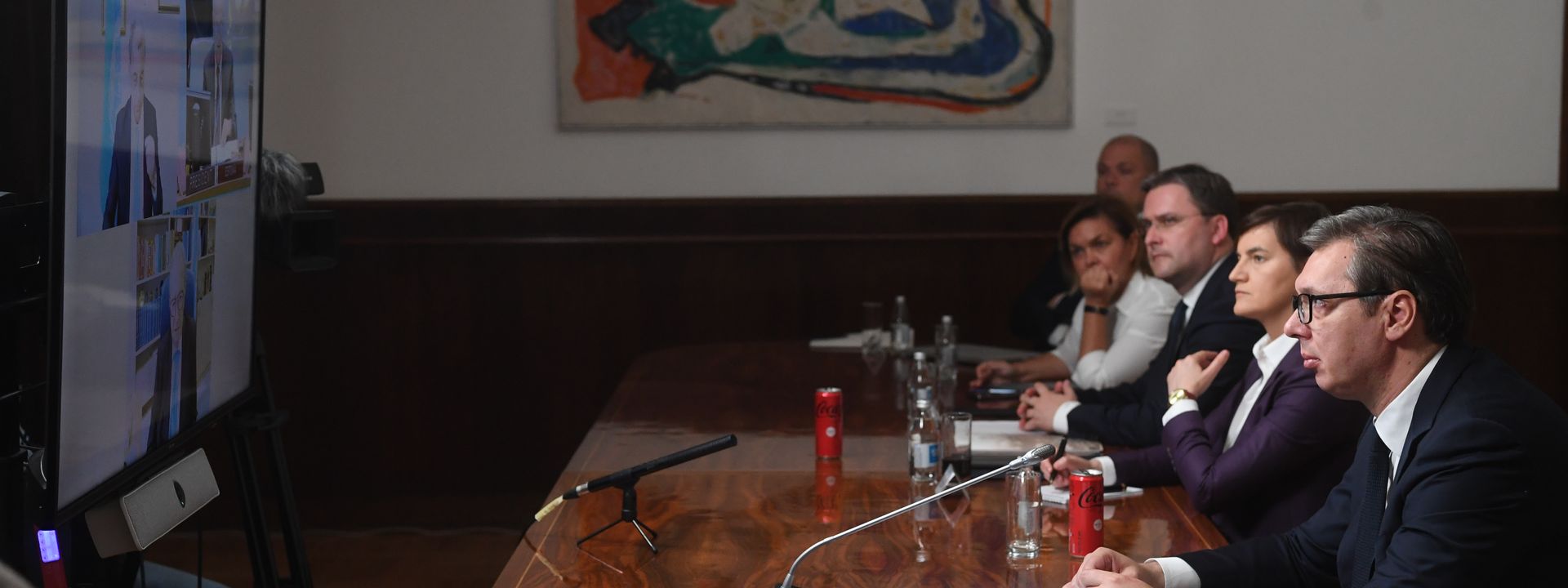
Dear Mr. President, ladies and gentlemen, members of the delegations
I would point to a few ongoing issues in my speech that refer to the competences of the Mechanism, namely, the possibility of serving the sentences passed by the ICTY and Mechanism in the Republic of Serbia, with the current practice of disabling early release of the sentenced persons as well as obligation of the Mechanism regarding protection of sentenced persons.
The second part of the speech will be dedicated to issues that are opened by the six –month Report on the work of the Mechanism by Mechanism President Mr. Agius and Report by the Chief Prosecutor Mr. Serge Brammertz, especially regarding current cooperation of the Republic of Serbia and the Mechanism.
The third part of my speech, and I noticed that in many of your statements even today, is going to be the view of Serbia on everything that took place in The Hague Tribunal and what the Tribunal verdicts brought to people in the region of former Yugoslavia.
The Republic of Serbia has initiated before the Security Council, on several occasions, the issue of possibility of serving sentences passed by the ICTY and Mechanism in the Republic of Serbia. Beside the efforts to move this issue from “square one”, not a single response was obtained from the Security Council. The majority of persons that are serving their prison sentences are citizens of the Republic of Serbia, and it comes naturally that the Republic of Serbia is interested in enabling them to serve their prison sentences in the Republic of Serbia.
ICTY and the Mechanism are making references to the Security Council as an institution in charge of dealing with this issue.
I am ready to reiterate here the readiness of the Republic of Serbia to take over obligations and liability for executing prison sentences that the Tribunal or Mechanism passed on the citizens of the Republic of Serbia, under the monitoring of the Mechanism and full respect for the authority of the Mechanism regarding early release.
Mr. President
A particular problem that we are facing with is disturbance by the judicial institutions established in the territory of Kosovo and Metohija, which is within Serbia and which is under Interim Administration of the UN. We are witnesses of attempts of retrial for two citizens that are serving their prison sentences for which they had already been trialed before the ICTY. More concretely, in previous period there was an attempt for hearing of Nebojša Pavković and for obtaining extradition of Vlastimir Đorđević.
I urge on the Mechanism and Security Council to prevent attempts of violation of the principle ne bis in idem, a civilization principle that was confirmed in Article 7 (1) of the Statute of the Mechanism and to disable retrials for persons already convicted by the ICTY, particularly to make sure that it is not done in the territory which is under interim UN administration.
Mr. President,
President of the Mechanism (Mr. Carmel Agius), apart from the regular Report, delivered also on 11 May 2021 a letter to the President of the Security Council, whose subject is the alleged omission of the Republic of Serbia to apprehend and turn over to the Mechanism Petar Jojić and Vjerica Radeta, indicted of contempt of court, claiming that in this way the Republic of Serbia was acting contrary to its obligations towards the UNSC Resolution 1966 (2010) and asking the Security Council to take measures in order to ensure that Serbia meets the alleged obligations in accordance with the Mechanism Statue and Resolution 1966.
The point of the argumentation of the President of the Mechanism comes to that that the Republic of Serbia has the obligation to deprive of liberty and extradite to the Mechanism its citizens accused of contempt of court, regardless of the nature of accusation, circumstances under which such an order was made and consequences that might result from its implementation.
It is about accusations that do not refer to sever violations of international humanitarian law and that are related to a case before the ICTY, which ended in 2018 (Vojislav Šešelj case), by acquitting the defendant in the first instance, and upon the Prosecutor’s complaint the defendant was declared guilty and sentenced to a 10-year imprisonment, which was covered by the time he spent at the UN Detention Unit.
Judge Agius states that Serbia ignores its obligations in accordance with the Resolution 1966 (2010). Quite the opposite- the Republic of Serbia takes seriously its obligations regarding cooperation with the Mechanism. After the warrant for apprehension and extradition of the two persons accused of contempt of court to the Mechanism had been introduced, the Higher Court in Belgrade established that assumptions for their apprehension and extradition to the Mechanism had not been met. The decision is founded on the rules of international law and domestic law of the Republic of Serbia and it is mandatory for holders of the executive power in the Republic of Serbia.
I would remind here that the first decision of a sole judge (Aydin Sefa Akay, 12 June 2018), that was acting in this case was that the criminal prosecution of V. Radeta and P. Jojić for alleged contempt of court was to be forwarded to the judicial authorities of the Republic of Serbia. In procedures that followed, the argument of the alleged unwillingness of the witnesses to cooperate with the judicial authorities of the Republic of Serbia was stated for the first time, and the decision on deprivation of transferring the case to the jurisdiction of the judicial authorities of the Republic of Serbia was based on the respective argument.
The Republic of Serbia expressed its readiness to take over the court procedure against Petar Jojić and Vjerica Radeta on several occasions and it provided appropriate guarantees. Additionally, the Republic of Serbia fully recognizes and accepts the obligation of the Mechanism to monitor trials that were transferred to national courts with the help of international and regional organizations, as well as to take measures envisaged by Article 6 of the Statute of the Mechanism. |
|
|
| Selakovic: Serbia demonstrated that solidarity does not solely have to be the privilege of the rich |
|
11 May 2021
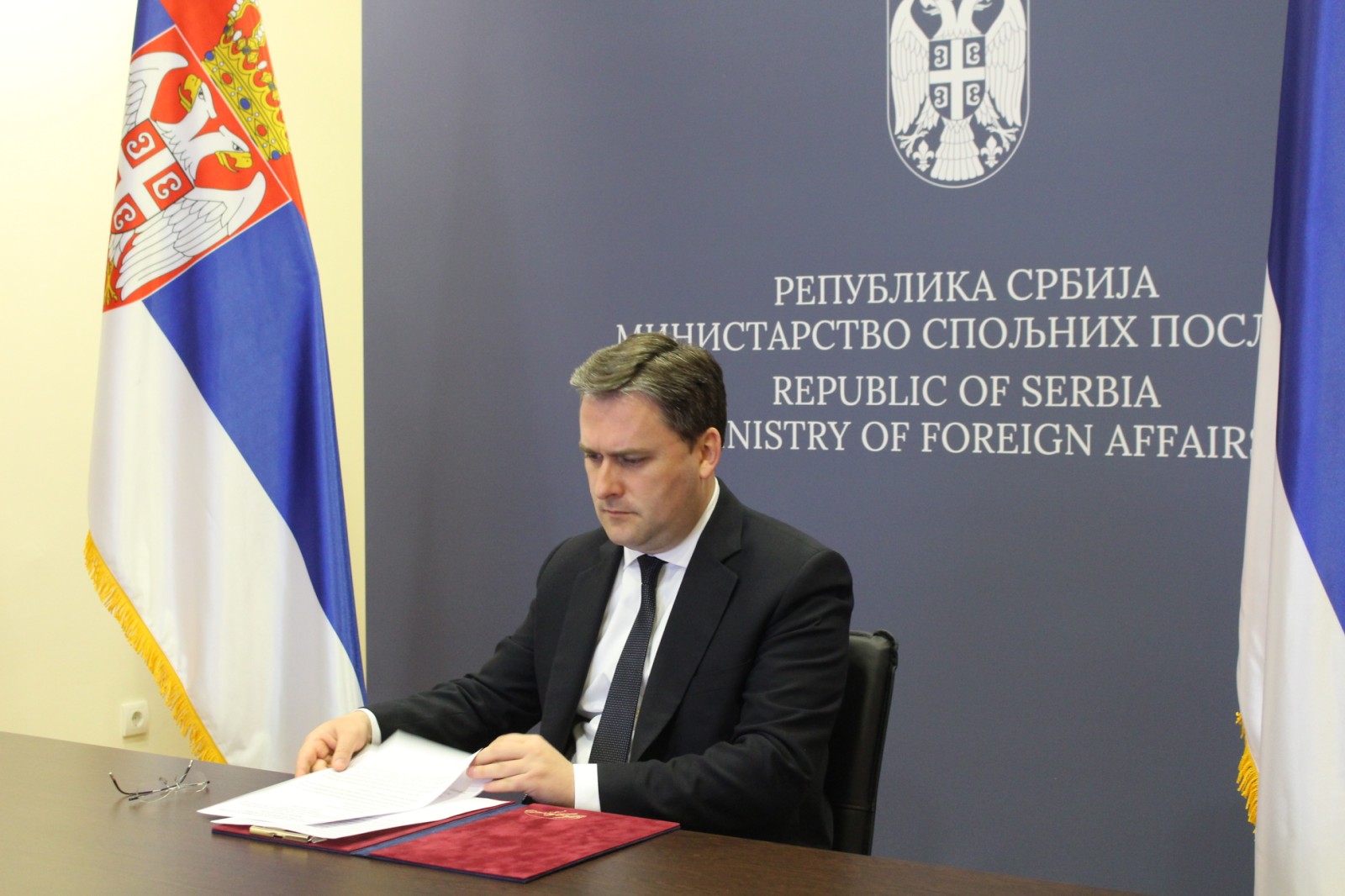
Minister of Foreign Affairs of the Republic of Serbia Nikola Selakovic participated today in the Adriatic and Ionian Council of the Adriatic and Ionian Initiative and the Ministerial Meeting of the EU Strategy for the Adriatic and Ionian Region, stating that it was necessary to include all available resources of this initiative more directly in finding common answers to the challenges posed by the coronavirus pandemic.
The Serbian Foreign Minister pointed out that the pandemic can only be defeated by joint forces, emphasizing that solidarity was the key word in these challenging times.
“Being committed to the principles of solidarity, Serbia vaccinated a large number of foreign nationals, primarily from the region. We have donated a number of vaccine doses to neighbouring countries as well as to the secretariats of regional initiatives in which Serbia participates. In this way, although not one of the economically strongest countries in this initiative, Serbia endeavoured to demonstrate that solidarity does not solely have to be the privilege of the rich”, Minister Selakovic said.
The Minister stressed that Serbia had entered the process of immunization of citizens against Covid-19 at the end of last year, and underlined that Serbia was one of the countries that faced both the epidemic and the vaccination process in the most efficient way.
Selakovic expressed pleasure over the fact that the "Izola Declaration" recognized the importance of a common European response to the pandemic and the need to revise the activity, particularly within the EU Strategy for the Adriatic and Ionian Region, while also being pleased that the Declaration confirmed the European perspective of the Western Balkans.
“Serbia's commitment to building a further European perspective and strengthening regional cooperation has been unequivocal”, Selakovic said adding that Serbia focused special attention on the green and digital transition in line with the European Green Deal, with support from the relevant EU funding programmes.
The meeting was held in video format, within the Slovenian Chairmanship of the initiative.
|
|
|
| Vucic: We consider Europe our home |
|
8 May 2021
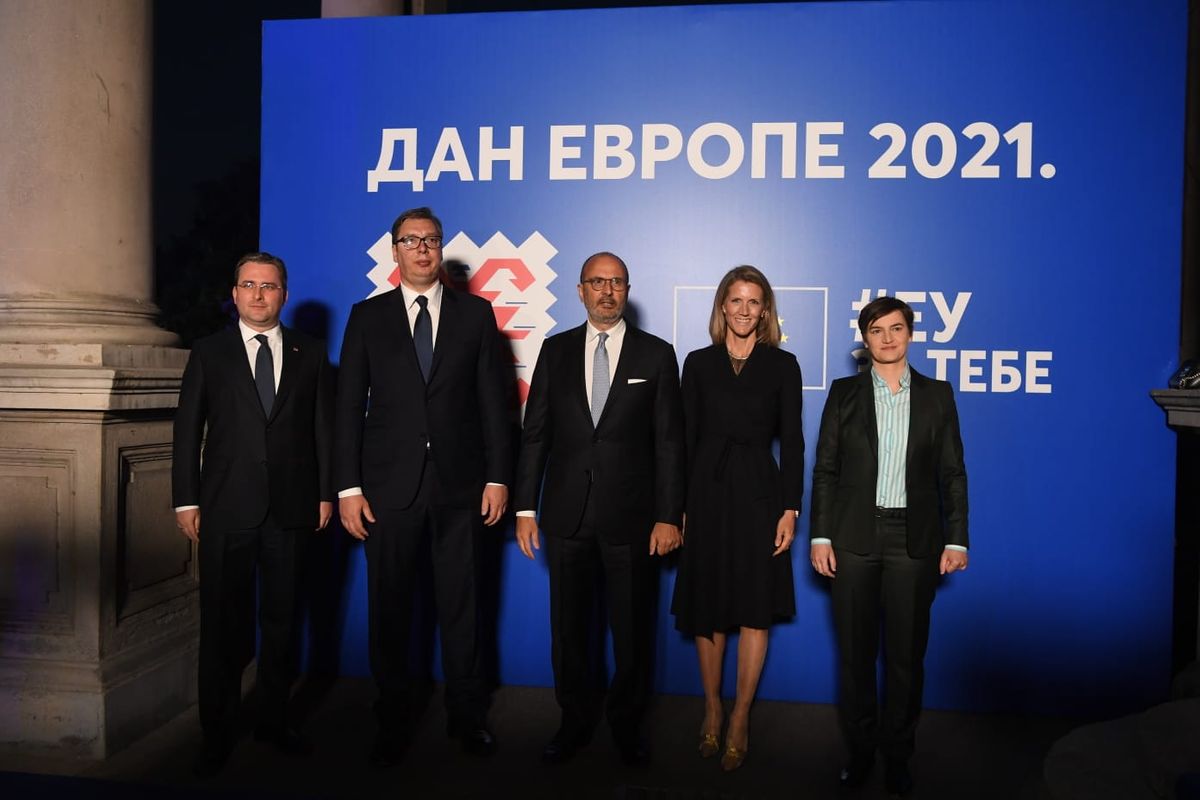
President Vucic said tonight that the visionary idea of Robert Schuman brought a true victory of the new trust after the Second World War and faith in the unification of differences in peace and solidarity, with the message that Serbia has that faith, as well as hope that it will become a country that will be gladly regarded in the European family of nations.
Congratulating everyone in Serbia and the EU on Europe Day, Vucic reminded that 9 May was also the day when the great victory of freedom is celebrated, which was won with huge sacrifices.
"While the horrors of war were still fresh in memory and Europe was healing the wounds of World War II, it also had people like Robert Schuman who understood that future can only be created based on the reconciliation of nations and their unity", Vucic said at the reception on the occasion of Europe Day.
He pointed out that the European peoples dared to see the recent adversaries as future allies.
"Schuman's visionary idea that peace will be preserved, if the creative forces are commensurate with the dangers that threaten, that Europe will emerge from specific achievements, has brought a true victory of newly found trust and faith in uniting differences in peace and solidarity", Vucic said.
He said that Serbia, although it did not always look like that, had that faith, as well as the hope that our concrete achievements, on the long and not easy path to EU membership, would be adequately valued.
“And that with your help, support and criticism, Serbia will become a country that you will be happy to see in the European community of nations. I believe that with our support, help and criticism, we would also contribute to the EU becoming an even better place to live", Vucic said.
Full membership of the EU, with a compromise solution to the issue of Kosovo and Metohija, is a way to achieve the goal and make Serbia orderly and successful, which would mean that we are on a good, European path, the President of Serbia said.
Vucic said that we still had to make a lot of efforts in reforms, not because someone is asking us to do that, but because we know that it brings us and the country a benefit.
He also pointed out that the reforms in the rule of law were exceptionally important, which were now being approached with much more responsibility.
"In our country, there is a race in who will say that they are more in favour of Europe, while saying under the table that they are the least for Europe. Europe does not belong only to those who would like to use European money, it does not belong to those in the government who say that they are on the European path because they believe that they are in that way preventing the opposition from coming to power, nor to those who think that this is the only way to get hold of power. It belongs to all of us, but we cannot take from Europe only what we like without accepting what we do not like", he explained.
I know, he added, how difficult it is to us in Serbia to hear criticism concerning Kosovo as well as in the field of the rule of law.
"I saw for myself that we are the ones who did not pay enough attention and apply a dedicated approach to the burning problems in that area. I believe that with greater zeal we will be able to change the attitude of the citizens of Serbia and gain greater respect from the EU for what we are doing", he pointed out.
President Vucic also pointed out that the EU was undoubtedly the largest donor, investor, and by far the most important trade partner of Serbia, and recalled that about two-thirds of all trade and even more service activities were EU related and that these were facts, whether someone liked it or not.
He pointed out that seven years ago when he became the Prime Minister, three times fewer people were employed in companies that came from EU countries than today.
"Despite all the problems, it shows how much we managed to do together and make good results, to provide people with life, security at work, to show that we can take care of them more", Vucic said, noting the great EU assistance in the field of education.
He said that during the recent visit to the EU, which he assessed as the best one so far, Serbia received additional support for infrastructure projects, primarily for modernization, i.e. essentially the construction of a new Belgrade-Nis-Presevo railway.
He said that this was confirmed in the letter of the President of the European Commission, Ursula von der Leyen, pointing out that this was the best letter he had ever received from Brussels.
"I am grateful to Von der Leyen for pointing out that this is a game-changer in our relations. It is a turning point because that support exceeds everything we have done together when you look at the scale, strength and significance of that project", he said.
He said that Serbia and its citizens considered Europe as their home and that is why we wanted to give our best contribution to peace through regional connectivity, the Berlin Conference and mini-Schengen.
"Encouraged by the message of European officials, I hope that I will be able to host them soon so that we can discuss the further acceleration of our European path", Vucic concluded.
Head of the Delegation of the European Union to Serbia Sem Fabrizi hosted a reception tonight on the occasion of marking 9 May, Europe Day. In addition to Serbian President Aleksandar Vucic, the reception in the Belgrade City Assembly was attended by Serbian Parliament Speaker Ivica Dacic, Serbian Prime Minister Ana Brnabic, Foreign Minister Nikola Selakovic, European Integration Minister Jadranka Joksimovic, representatives of the diplomatic corps and public figures.
Europe Day was established in memory of the beginning of the creation of the European Union (EU) and the Day of Victory over Fascism in the Second World War. The reception is held in memory of 9 May 1950, when the Schuman Declaration was signed, which laid the foundations of the European Union, a project that brought the longest period without war on the Old Continent.
|
|
|
| Selakovic congratulates Josep Borrell on Europe Day |
|
8 May 2021
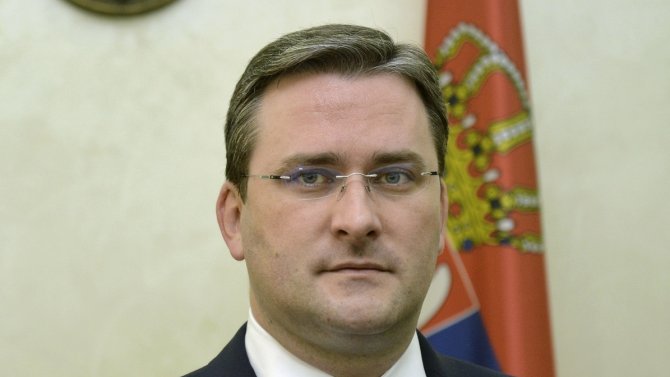
Minister of Foreign Affairs of the Republic of Serbia Nikola Selakovic extended a congratulatory message on the occasion of 9 May, Europe Day, to High Representative of the EU for Foreign Affairs and Security Policy Josep Borrell, expressing confidence that the idea of uniting in diversity, in peace and solidarity, would continue to be the guiding idea of the European Union.
"I am deeply convinced that the Republic of Serbia, through a policy of peace and good-neighbourly cooperation, can contribute to the European Union becoming an even better place to live, with the sincere belief that our achievements on the path to membership in the European family of nations will be adequately valued", reads the congratulatory message by Minister Selakovic, adding that the European perspective gave a strong impetus for our country to comprehensively implement political, economic and social reforms with the aim of becoming a full member of the European Union in the foreseeable future.
The Serbian Foreign Minister underlined that Serbia historically, culturally and in terms of values, belonged to the circle of countries united under the flag of the European Union and expressed hope that not only our country, but also our neighbours in the Western Balkans, would have the opportunity in the near future to become a part of what is without a doubt the most successful peace, democratic and economic project in the history of our common continent.
Selakovic also took the opportunity to extend gratitude on behalf of Serbia to the European Union for its assistance in the fight against the infectious Covid-19, emphasizing that our country highly appreciated the expressed solidarity and support in the difficult times of the pandemic outbreak and expressing confidence that the period ahead would see us contribute by joint forces to identifying solutions for overcoming the economic consequences of the corona virus pandemic.
|
|
|
| President Vučić met via video link with representatives of the IMF delegation |
|
21th April 2021
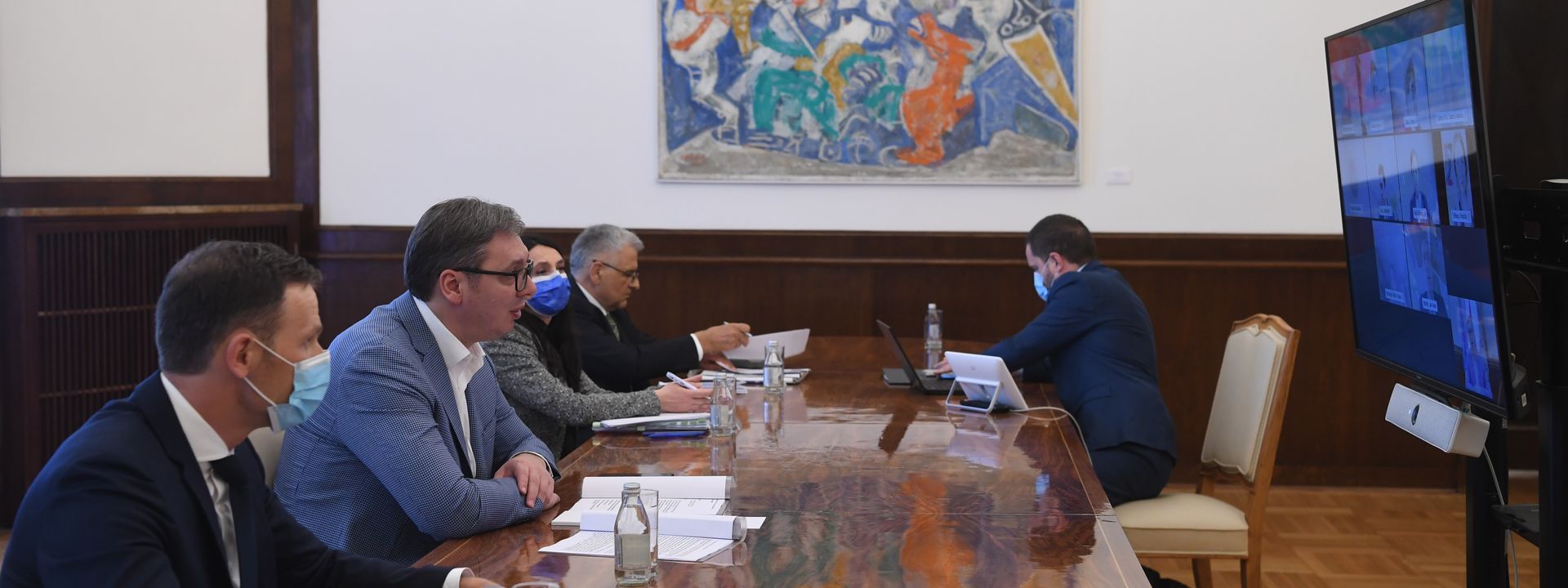
President of the Republic of Serbia Aleksandar Vučić talked today via a video link with the representatives of the delegation of the International Monetary Fund led by the Head of the Mission, Jan Kees Martijn. The interlocutors concluded that Serbia's main goal remains to preserve the hard-earned reputation of a fiscally secure country, as well as to continue with a responsible fiscal policy so that public debt does not exceed 60 per cent of GDP, whereby Serbia continues to work on further economic growth.
During the conversation, President Vučić and Jan Kees Martijn especially referred to the incentive measures and adopted three packages of measures to help the economy and citizens, which preserved macroeconomic stability and even achieved a higher employment rate. Martijn commended the responsible economic policy of Serbia and the successful crisis management during the pandemic.
"Serbia achieved one of the best results last year despite the challenges of the pandemic", Martijn said, noting that Serbia was one of the few countries to which the IMF did not adjust the initial projection of the 5% growth rate it gave last year.
President Vučić added that following the first quarter of 2021, Serbia is well on its way to achieving the planned growth of 6% as planned, since one of the main focuses of the Government is investing in large infrastructure projects and intensifying work on attracting foreign direct investments.
"In 2020, Serbia was at the very top in terms of economic growth in Europe, and I am convinced that this year we can enter the first three or four countries in terms of growth", said President Vučić, adding that he was satisfied that Serbia still, despite the pandemic situation, has an extremely strong inflow of investment.
President Vučić and Jan Kees Martijn also discussed a new advisory arrangement, which is of special importance in light of the improvement of the general investment climate in Serbia, as well as in the context of even greater investor assurance.
"Given Serbia's tremendous progress over the past eight years, the priority goal of this arrangement will be to preserve the results achieved, but also to provide support for further implementation of structural reforms aimed at even faster, stronger and more sustainable growth", said President Vučić and thanked the IMF and the personal engagement of Jan Kees Martijn in the professional and expert support that Serbia is counting on.
President Vučić pointed out that Serbia will pay special attention to reforms in public companies, and that priorities will continue to be investments in infrastructure, creating an even better climate for investments, greater investments in the environment, science and capital projects, which will further contribute to the long term stable financial growth in the coming years.
Source: www.predsednik.rs
Photo: www.predsednik.rs
|
|
|
| Meeting with the World Health Organization Regional Director for Europe |
|
20th April 2021
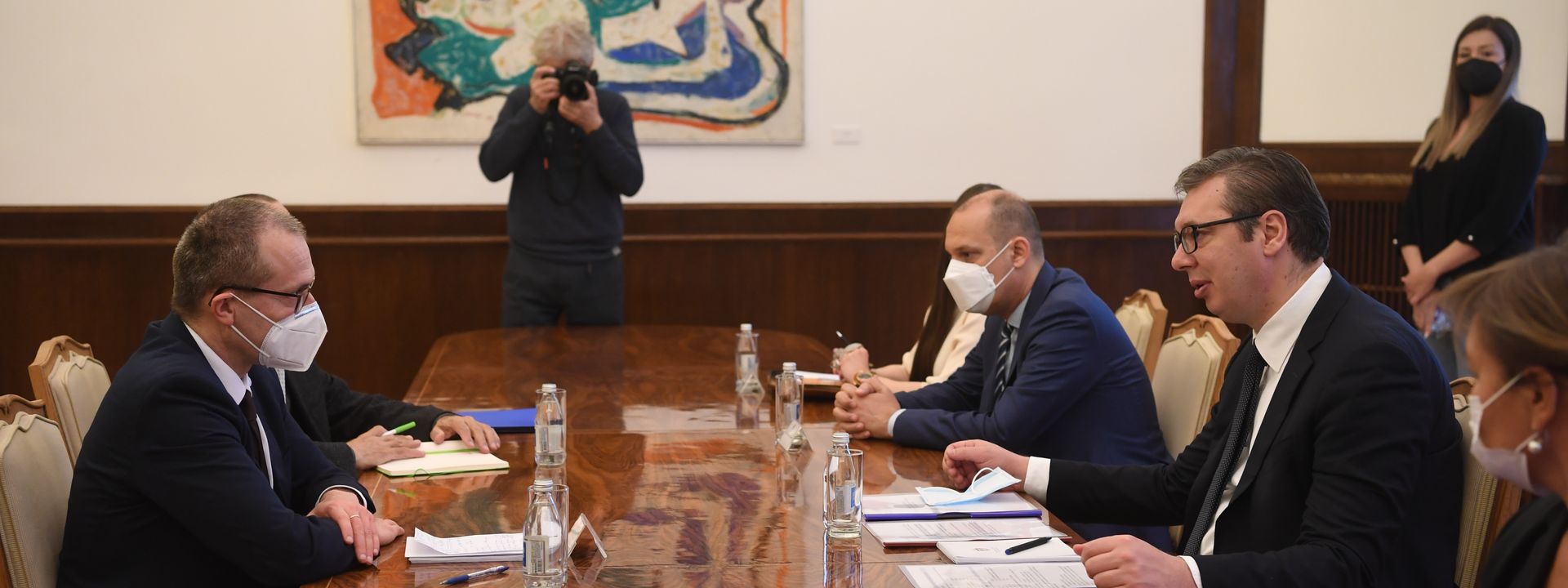
President of the Republic of Serbia Aleksandar Vučić met today with the Regional Director of the World Health Organisation for Europe Hans Kluge, to discuss cooperation in the fight against the COVID-19 pandemic, as well as cooperation in improving health care in our country and other joint activities.
President Vučić thanked Dr Kluge for his personal engagement and support during the current pandemic, especially for technical assistance and expertise. On this occasion, he informed the WHO official about the results of immunisation in Serbia and plans on how to provide the vaccine to all citizens who want to get it.
Dr Kluge congratulated President Vučić on his leadership and personal commitment to provide vaccines. He emphasised that Serbia, with its good immunisation strategy, ranked among the global leaders, thus becoming an example of humanity and solidarity by enabling vaccination of elderly people in rural areas, foreign citizens and donating vaccines to other countries.
"Serbia has accepted the vaccine as a life-saving product and has not looked at it geopolitically", said Dr Kluge.
The two interlocutors agreed that the world should increase production capacities for vaccines, as well as develop new adequate therapies for the fight against COVID-19, and, in this regard, work on increasing the level of citizens' trust in science.
President Vučić informed Dr Kluge about the plans for improving the work of the Institute for Virology, Vaccines and Sera "Torlak".
"We want to make 'Torlak' one of the best vaccine factories in Europe", said President Vučić.
Source: www.predsednik.rs
Photo: www.predsednik.rs
|
|
|
| WHO describes immunisation process in Serbia as impressive |
|
19 April 2021
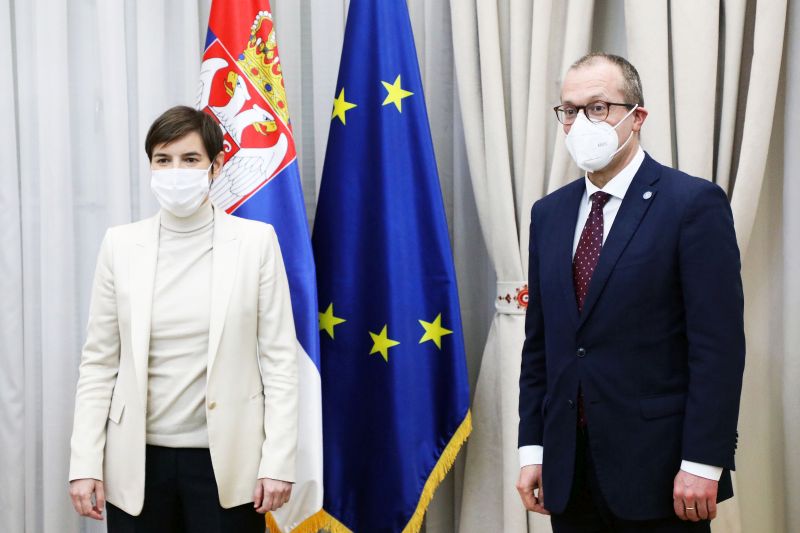
Prime Minister Ana Brnabic talked today with World Health Organisation (WHO) Regional Director for Europe Hans Kluge about the epidemiological situation and the course of immunisation of citizens in Serbia.
Brnabic expressed gratitude for the cooperation in the fight against the pandemic, technical assistance and expertise, emphasising that the support of this organisation is very important for our country.
She informed the WHO Regional Director for Europe about the course of immunisation of citizens in Serbia, expressing her belief that, thanks to the large number of vaccinated people, we will be able to create collective immunity and return to normal life.
Kluge assessed the immunisation process in Serbia as impressive, and added that Serbia has made a good decision to offer citizens all available vaccines used in the fight against coronavirus.
Expressing concern over the emergence of new strains of the virus, he stressed the need to speed up the immunisation process and show mutual solidarity.
The WHO Regional Director for Europe praised Serbia for the humanity it has shown by donating vaccines to the countries of the region and enabling vaccination for those who do not have a sufficient number of vaccines for their citizens.
The Prime Minister said that Serbia will continue to cooperate with the countries of the region and help in accordance with its capabilities.
When it comes to the project "Roadmap for Health in the Western Balkans 2021-2025", it was stated that, if epidemiological conditions allow, a regional meeting will be held in Belgrade at the end of the year, important for future improvement of cooperation between countries in the field of health challenges.
Source: www.srbija.gov.rs
Photo: www.srbija.gov.rs
|
|
|
| Selakovic: L’Estremismo politico degli albanesi in Kosovo e Metohija sempre più forte |
|
13 aprile 2021
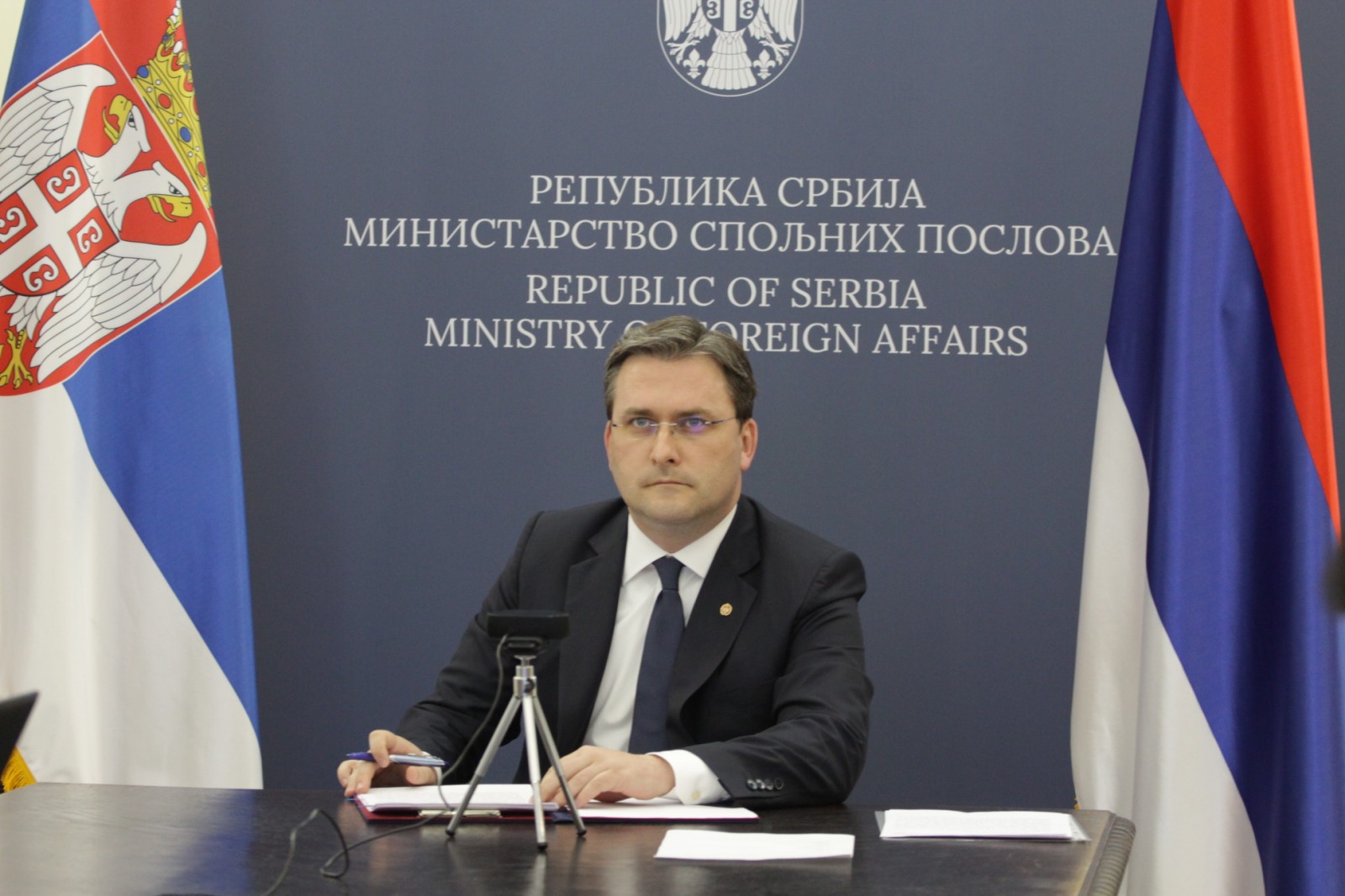
Il Ministro degli Affari Esteri Nikola Selakovic ha avvisato, alla seduta del Consiglio di Sicurezza dell’ONU, che l’estremismo politico tra gli albanesi in Kosovo e Metohija non perde il vigore, ma, anzi, sta diventando sempre più forte.
Selakovic ha ricordato, nella seduta in cui si esaminava la Relazione del Segretario Generale dell’ONU circa l’operato dell’UNMIK, che all’obbligo di costituire l’Unione dei comuni serbi non si è adempiuti da 2.917 giorni e che di fatto, il 19 aprile si compiono esattamente otto anni dal raggiungimento dell’accordo di Bruxelles, e che Pristina rifiuta ancora di adempiere al suo impegno consentendo la costituzione dell’Unione dei comuni serbi.
Il Ministro ha ricordato che l’attuale Presidente del Governo delle provvisorie istituzioni di autogestione di Pristina ha più volte minacciato l’unione dell’autoproclamato Kosovo con l’Albania, e che il dialogo con Belgrado si trova in posizione bassa sulla lista delle priorità.
Come ha indicato, è ora che i leader albanesi di Pristina dimostrino la responsabilità nell’adempimento degli impegni assunti, ma anche una sincera dedizione al raggiungimento di una soluzione di compromesso e alla costruzione di una reciproca fiducia.
“La Serbia è decisa e non rinuncerà al tentativo di trovare una soluzione di compromesso, che sia sostenibile anche per le generazioni future. Il lavoro sulla costruzione della fiducia e l’insistere sulle agende politiche positive è un altro modo per costruire una pace costante e la stabilità nella nostra Regione”, ha concluso Selakovic.
La pace costante e la stabilità, come afferma, possono essere raggiunte solamente a patte che nessuno dei partecipanti al dialogo avanzi delle richieste massimaliste e insista sulla completa umiliazione dell’altro.
Come ha evidenziato, il popolo serbo e quello albanese, come due più numerosi popoli dei Balcani Occidentali, devono trovare il modo di raggiungere la pacificazione e una base per cooperare sia sul piano economico, che sul raggiungimento delle prospettive congiunte volte all’adesione all’Unione Europea.
“Belgrado ha fatto sinceri passi in questa direzione, essendo uno dei promotori dell’idea di alleggerimento dei flussi di persone, merci, capitali e servizi, pubblicamente nota come Mini Schengen”, ha sottolineato il Ministro.
Ribadendo che la Serbia ha dimostrato innumerevoli volte di essere dedicata al dialogo in quanto l’unico mezzo per una soluzione pacifica e politica del problema del Kosovo e Metohija, Selakovic ha ribadito che le recenti elezioni nella Provincia hanno confermato che l’estremismo politico tra gli albanesi non perde il vigore, ma anzi, diventa sempre più forte, il che era possibile vedere durante il recente processo preelettorale.
Il Ministro ha richiamato l’attenzione al fatto che le pressioni politiche sui serbi proseguono anche dopo il processo elettorale, dato che gli è stata tolta una giusta partecipazione alle istituzioni provvisorie con la decisione del nuovo cosiddetto Governo di Pristina di assegnare alla comunità serba solamente un Ministero.
“La categoria particolarmente a rischio sono i serbi che sono ritornati e che vivono quotidianamente con la paura degli attacchi. Vi ricordo che la Provincia meridionale serba è tuttora l’area con il minor tasso di ritorno degli esuli al mondo”, ha detto il Ministro sottolineando che solamente nell’anno scorso nella nostra Provincia meridionale sono avvenuti 80 attacchi e incidenti i cui obiettivi erano serbi, la loro proprietà e i luoghi di culto.
Particolarmente preoccupante per il popolo serbo in Kosovo e Metohija, ha sottolineato Selakovic, è il fatto che nel passato recente, e soprattutto nel marzo di quest’anno, sono avvenuti sempre più frequenti attacchi fisici alle località della Chiesa Ortodossa Serba.
“Un esempio di forte impatto del rapporto di mancato rispetto nei confronti del patrimonio culturale e religioso serbo nella Provincia, il cui estremo valore universale è stato confermato anche dall’Unesco che lo ha collocato sulla Lista del Patrimonio culturale mondiale, è anche il caso del monastero Visoki Decani”, ha sottolineato il Ministro.
Inoltre, il Capo della Diplomazia serba ha valutato come preoccupante anche l’irruzione dell’ispettore e degli agenti di polizia all’ASL di Strbac, nel gennaio scorso e la perquisizione con l’intenzione di trovare i vaccini contro Covid-19 provenienti dalla Serbia Centrale.
“Anche se lo consideriamo come irruzione nelle istituzioni sanitarie, la nostra reazione è stata contenuta anche questa volta. Non volevamo suscitare con le nostre decisioni un inasprimento né politicizzare attività volte esclusivamente alla tutela della salute pubblica. Abbiamo organizzato la vaccinazione dei cittadini del Kosovo e Metohija in tre punti della Serbia Centrale dimostrando in tale maniera che per noi la vita delle persone si trova al primo posto”, ha sottolineato il Ministro.
Il Ministro Selakovic ha detto che la Serbia rispetta altamente le attività della missione dell’UNMIK in Kosovo e Metohija e che si impegna per il suo quanto più efficace operato nel volume non ridotto, con l’obiettivo della costruzione e della preservazione della sicurezza nella Provincia.
Selakovic ha indicato che le missioni internazionali in Kosovo e Metohija, UNMIK, Kfor, Eulex e OMIK, sotto l’egida dell’ONU, e ai sensi della Risoluzione 1244, hanno un ruolo fondamentale nella preservazione della pace e nella tutela della popolazione.
“Appoggiamo e rispettiamo il loro impegno e i loro sforzi che investono all’interno dei loro mandati, per l’obiettivo congiunto della creazione delle condizioni per una convivenza pacifica e sicura degli abitanti del Kosovo e Metohija. La popolazione serba e non albanese in KeM ha massima fiducia nella presenza internazionale e la ritiene garante di sicurezza e diga contro l’arbitrarietà delle istituzioni provvisorie di Pristina”, ha evidenziato il Ministro.
Lo conferma, come indicato dal Ministro, il fatto che le missioni internazionali devono rimanere impegnate nel volume non ridotto affinché possano implementare la Risoluzione del CS dell’ONU 1244.
Selakovic ha menzionato l’importanza delle forze internazionali della Kfor ribadendo che ogni unilaterale tentativo di assegnare ad altri, o ad assumere una parte del mandato e degli impegni della Kfor - rappresenta la violazione della Risoluzione del CS dell’ONU 1244.
Inoltre, il Ministro ha menzionato che non è accettabile l’assunzione delle decisioni unilaterali circa la formazione del “Ministero della Difesa” di Pristina e l’inizio del processo di trasformazione delle cosiddette “Forze di sicurezza kosovare” nelle cosiddette “Forze Armate del Kosovo”.
Il Ministro Selakovic ha presentato, all’inizio del suo intervento, il reclamo per l’abuso del formato video della seduta da parte della rappresentante di Pristina, dietro la quale era esposta la bandiera dell’autoproclamato “Kosovo”, il che ha fatto anche il rappresentante della Russia.
In seguito, la versione integrale del discorso del Ministro degli Affari Esteri Nikola Selakovic:
Distinguished President of the Security Council,
Distinguished Special Representative,
Esteemed members of the Security Council,
At the outset, I have no choice but to lodge a protest against the abuse of the video format of this session on the part of the representatives of Pristina in order to promote the symbols of the so-called statehood of Kosovo. Despite the fact that the representatives of Pristina were warned on several occasions, including by the President of the Security Council at the previous session, that such abuses of Security Council sessions are absolutely unacceptable and constitute a flagrant violation of the Security Council rules on participation of representatives of the provisional institutions of self-government in Pristina, under Rule 39 of the UN Security Council Rules of Procedure, we are again faced with their reckless disregard for the rules of this distinguished body. Let me reiterate our call for the necessary steps to be taken to prevent such abuses.
It is my great pleasure to address this august body at the meeting on the work of the Mission of the United Nations in Kosovo and Metohija. At the outset, I would like to thank Secretary-General of the United Nations Mr. Guterres and Special Representative of the Secretary-General and Head of UNMIK Mr. Tanin for the report submitted and for their efforts made towards the implementation of the UNMIK mandate, and also to the members of the Security Council for the continued attention they have devoted to the issue of Kosovo and Metohija. The Republic of Serbia highly values the activities of the Mission of the United Nations in Kosovo and Metohija and supports it in carrying out its work as efficiently as possible and undiminished in scope, aiming to build and preserve security in the Province.
Mr. President,
In the previous period we have faced political instability in Kosovo and Metohija. We recently had elections in the Province, which unfortunately confirmed that political extremism among Albanians in Kosovo and Metohija is not decreasing, but on the contrary, is becoming stronger. We have witnessed Albanian leaders competing among themselves in efforts to find the best way to provoke an incident in Serb communities, in order to score political points of the Albanian electorate. Under the pretext of amending the voter list, a large number of Serbs in Kosovo and Metohija were deprived of one of their fundamental political rights - the opportunity to elect their political representatives. Out of approximately 140,000 of citizens of Kosovo and Metohija who were removed from the voter list in the latest election process, 85% are Serbs.
Despite numerous challenges and problems, the Serbian people in Kosovo and Metohija have shown, by high turnout and a convincing victory of the Serb List which won all ten seats reserved for Serbian representatives, that nothing can stop them from resolutely defending their position. Political pressures on Serbs continued even after the election process was completed, by denying Serbs fair representation in provisional institutions as the new so-called government in Pristina decided to assign only one ministry to the Serb community.
Distinguished members of the Security Council,
Unfortunately, it was not only during the election activities that we witnessed the unreasonable anti-Serb policy being pursued by the provisional institutions in Pristina. This goes to the length of breaking into the Health Center in Strpce, in the south of Kosovo and Metohija, by police inspectors and officers from Pristina, in January this year, who conducted a search aiming to discover Covid-19 vaccines there, originating from central Serbia, which they did not find. In doing so they demonstrated force and threatened to arrest the director of the Health Center, medical staff and doctors. At a time when the whole world is fighting the pandemic with vaccines being the only way to end this challenge, while Serbia is showing support and solidarity by donating vaccines and medical equipment to all in need in the region, Pristina wants to destroy vaccines only because they originate from central Serbia. As the whole world expresses gratitude to medical doctors, who have made great and heroic sacrifices in combating the virus, the provisional institutions in Pristina are attacking Serbian doctors for doing their job.
Although we believe that intrusions into health care institutions are inadmissible, our reaction was restrained this time as well. We did not want our decisions to cause escalation and politicization of activities that are solely aimed at protecting public health. We organized the vaccination of citizens from Kosovo and Metohija at three locations in central Serbia and thus clearly demonstrated that people's lives are the top priority to us. Serbia continues to be ready to help all in need of assistance, and we call for reason and responsibility, especially in such difficult times.
Mr. President,
Attacks targeting Serbs and their property have been on the rise. In the last year alone, more than 80 attacks and incidents took place in our southern province, targeting Serbs, their property and religious sites. According to the information provided by the OSCE Mission in Kosovo and Metohija, in the second half of last year, the number of incidents increased by more than 30% compared to 2019. Therefore, we cannot agree with the assessment that the "security situation in Kosovo remained stable, with a few incidents reported affecting non-majority communities". Last weekend, for example, an entirely unprovoked physical attack by a group of Albanians on two Serb young men took place in the northern part of Kosovska Mitrovica.
Serb returnees represent a particularly vulnerable category, who spend their every day in fear of being attacked. The fact that one family of returnees was the target of seven attacks clearly indicates the persistence of those who do not want Serbs in Kosovo and Metohija. There is absolutely no trace of political will in Pristina for 212,995 displaced Serbs who have been living outside Kosovo and Metohija for 22 years to return to their homes. Since 1999, the rate of sustainable return of internally displaced persons in Kosovo and Metohija has been only 1.9%, which according to the UN data is officially the lowest percentage of return of expelled population after a conflict anywhere in the world.
At the same time, while arresting internally displaced persons, Pristina authorities are exerting the strongest of pressures on the Specialist Chambers in The Hague. The aim is to completely prevent the further processing of a number of cases against members of the terrorist KLA, on charges of serious crimes committed during the conflict in Kosovo and Metohija against both Serbs and persons belonging to other nationalities. President of the Specialist Chambers Madam Trendafilova recently warned that, should the pressures continue, this would have very dramatic consequences to the trials in progress. President Trendafilova underlined as highly problematic the phenomenon of witness intimidation, who are key for conducting proceedings successfully and rendering a proper verdict.
Although the wait to raise indictments was far too long, we consider it commendable that efforts have finally been made to punish the perpetrators of numerous serious crimes which were committed during the armed conflicts a little over two decades ago, but also upon the arrival of the international forces to Kosovo and Metohija. For example, no one has been held accountable to this day for the killings and abductions of 17 journalists in Kosovo and Metohija, which is currently the largest number of unsolved cases of murdered and kidnapped journalists in Europe. Furthermore, the perpetrators of any of the mass crimes committed against Serb civilians after 1999 have not been brought to justice. I will remind you of only a few of these cases: 14 Serb farmers were killed in the village of Staro Gracko, 12 displaced Serbs were killed and 43 wounded in the attack on the "Niš Express" bus in Livadice near Podujevo, and in Gorazdevac near Pec unknown persons fired automatic weapons on children who were swimming in the Bistrica river. Two Serb children were killed then, and four were seriously injured.
We expect the EULEX Mission to continue to support the Specialist Chambers and the Specialist Prosecutor's Office, as well as its additional engagement in the field of the rule of law. Special attention needs to be devoted to witness protection, and determining the fate of missing persons.
International missions in Kosovo and Metohija - UNMIK, KFOR EULEX and OMIK are an integral part of the international civilian and security presence in our southern province, under the administration of the United Nations and in line with UNSC Resolution 1244 (1999), and play a key role and make an outstanding contribution to the preservation of peace and protection of the population. We support and respect their engagement and efforts made in the framework of their mandates, with the common goal of creating conditions for a peaceful and safe coexistence of the inhabitants of Kosovo and Metohija. The Serb and other non-Albanian population in Kosovo and Metohija have the utmost confidence in the international presence and consider it a guarantor of security and a barrier against the arbitrariness of the provisional institutions in Pristina. This further demonstrates the need that international missions remain engaged in an undiminished scope, in order to consistently implement UNSC Resolution 1244.
I would like to further emphasize the importance of KFOR international forces and point out that any unilateral attempt to assign to someone else or that someone else assumes a part of KFOR's mandate and responsibilities constitutes a violation of the UNSC Resolution 1244, while also being a potential source of instability and tensions. I will remind you that Pristina, contrary to international law and completely ignoring the interests and positions of the Serb community in the Province, would not abandon its plans to install a new security actor in the territory of Kosovo and Metohija. We consider the unilateral decisions on the formation of the "Ministry of Defence" and launching the process of transforming the so-called "Kosovo Security Forces" (KSF) into the so-called "Kosovo Army" to be unacceptable. I would like to reiterate that such unilateral moves on the part of Pristina constitute a gross violation of the UNSC Resolution 1244 and the Military Technical Agreement, according to which only the International Security Forces, that is KFOR, have the mandate for all military aspects of security in the territory of Kosovo and Metohija.
In this context, an additional reason for concern is the announcement of the construction of the largest base of the "Kosovo Security Forces" in the southern part of Kosovska Mitrovica, which Serbs in the north of Kosovo and Metohija perceive as the most open provocation and threat to their physical safety.
Distinguished members of the Security Council,
It is particularly worrying for the Serbian people in Kosovo and Metohija that in the previous period, and especially in March this year, there were frequent physical attacks on the property of the Serbian Orthodox Church. In just two weeks, as many as seven Orthodox landmarks in the province were targeted by vandals, at a time when we all remember the March 2004 pogrom against Serbs and Serbian holy sites in Kosovo and Metohija. The condition of the Serbian cultural and spiritual heritage in Kosovo and Metohija is humiliating, including the four monuments that are inscribed on the UNESCO List of World Heritage in Danger (Visoki Decani, Holy Virgin of Ljevisa, Gracanica and the Patriarchate of Pec). Numerous administrative and technical barriers are imposed on priestly and monastic communities, which makes it more difficult or even impossible for them to survive on church property.
A striking example of the disrespectful attitude towards Serbian cultural and religious monuments in the Province, whose exceptional universal value UNESCO confirmed by inscribing them on the World Heritage List, is the case of the Visoki Decani Monastery.
Distinguished members of the Security Council,
The reason for the nervous behaviour of Pristina is all too obvious, as the project of the so-called independence today fails to be recognized by more than a half of the United Nations Member States, including five members of the European Union. However, it is high time for Albanian leaders in Pristina to show responsibility in fulfilling their commitments, but also a sincere commitment to reaching a compromise solution and building mutual trust.
I will remind you that the current Prime Minister of the provisional institutions of self-government in Pristina has repeatedly threatened to unite the self-proclaimed Kosovo and Albania in the past. A member of his party publicly said last weekend that the self-proclaimed Kosovo and Albania would be united, I quote, "with rifle and gunpowder, or referendum boxes".
I need not explain why such dangerous ideas constitute a direct threat to peace and stability. They violate Resolution 1244, while continuously destabilizing not only our southern province, but the entire region as well, and in no way contribute to the dialogue process, but instead hamper it again.
We have demonstrated time and time again our commitment to dialogue as the only way towards a peaceful, political solution to the problem in Kosovo and Metohija. Even today, after many years of negotiations, but also failure to fulfill what was agreed and constant unilateral moves and provocations on the part of the provisional institutions in Pristina, we are still ready to sit down at the table and talk.
We are ready for dialogue but not to be blackmailed and threatened and especially not for ultimatums recently presented by Prime Minister of the provisional institutions of self-government in Pristina. I will remind you of his statement that the dialogue will be low on the list of priorities of the Pristina authorities. It is bewildering how Pristina refers to ultimatums completely undermining any chance of dialogue, as the European Union also pointed out, as "principles" and how it persistently insists that Belgrade should recognize the unilaterally declared independence of "Kosovo", upon which, they believe, all else would be resolved. What is the purpose of the dialogue then, if Belgrade is only expected to recognize the so-called Kosovo? Does the dialogue imply that one side should give up everything only for the other to win it all? And does the dialogue, in Pristina's opinion, imply that what was agreed should not be fulfilled?
I will remind you that Pristina still refuses to follow up on its obligations arising from the agreements reached so far and does not agree to discuss their implementation within the dialogue. And the situation is quite simple - in April 2013, the first agreement was signed in Brussels, which envisaged four obligations: one for Pristina and three for Belgrade. Belgrade has fulfilled all obligations, while the only obligation that the provisional institutions in Pristina had - to form the Community of Serb Municipalities - has remained unfulfilled for 2,917 days now. In fact, 19 April marks eight full years since the agreement was reached in Brussels, and of Pristina's failure to fulfill the obligation to form the Community of Serb Municipalities.
Distinguished Mr. President,
Regardless of the discouraging messages heard from Pristina and the fact that the dialogue has been in progress for many years, Serbia is determined and will not give up on identifying a compromise solution, which will be sustainable for future generations as well. Lasting peace and stability can only be achieved if none of the participants in the dialogue pursues maximalist demands and insists on the complete humiliation of the other. The Serbian and Albanian peoples, as the two most numerous peoples in the Western Balkans, need to find a way to reach reconciliation and a basis for cooperation, both in terms of the economy and in achieving shared prospects for membership to the European Union.
Belgrade has made sincere steps in that direction, by being one of the initiators of the idea of relaxing the flow of people, goods, capital and services, popularly referred to as "mini-Schengen".
As far as Serbia is concerned, we are convinced that the only way to build lasting peace and stability in our region is by working to build trust and insisting on positive political agendas. The inhabitants of Kosovo and Metohija, of any nationality, whether they are Serbs or Albanians, do not deserve anything less.
Thank you for your attention. |
|
|
| Vaccinazione in Serbia - informazioni importanti! |
|
09.04.2021.
Vaccinazione in Serbia - informazioni importanti!
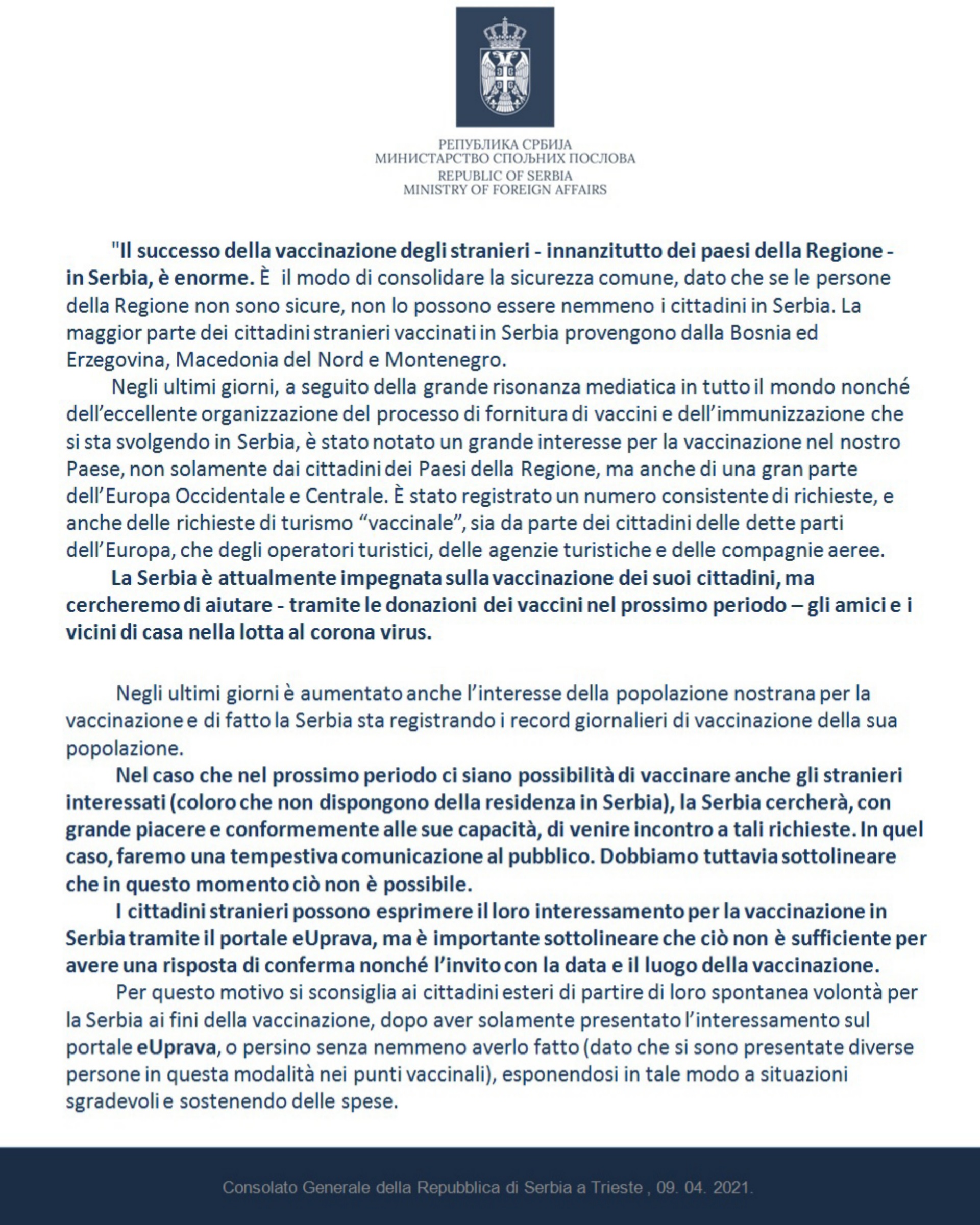 |
|
|
| L’incontro con l’Ambasciatore della Repubblica Italiana |
|
5 aprile 2021
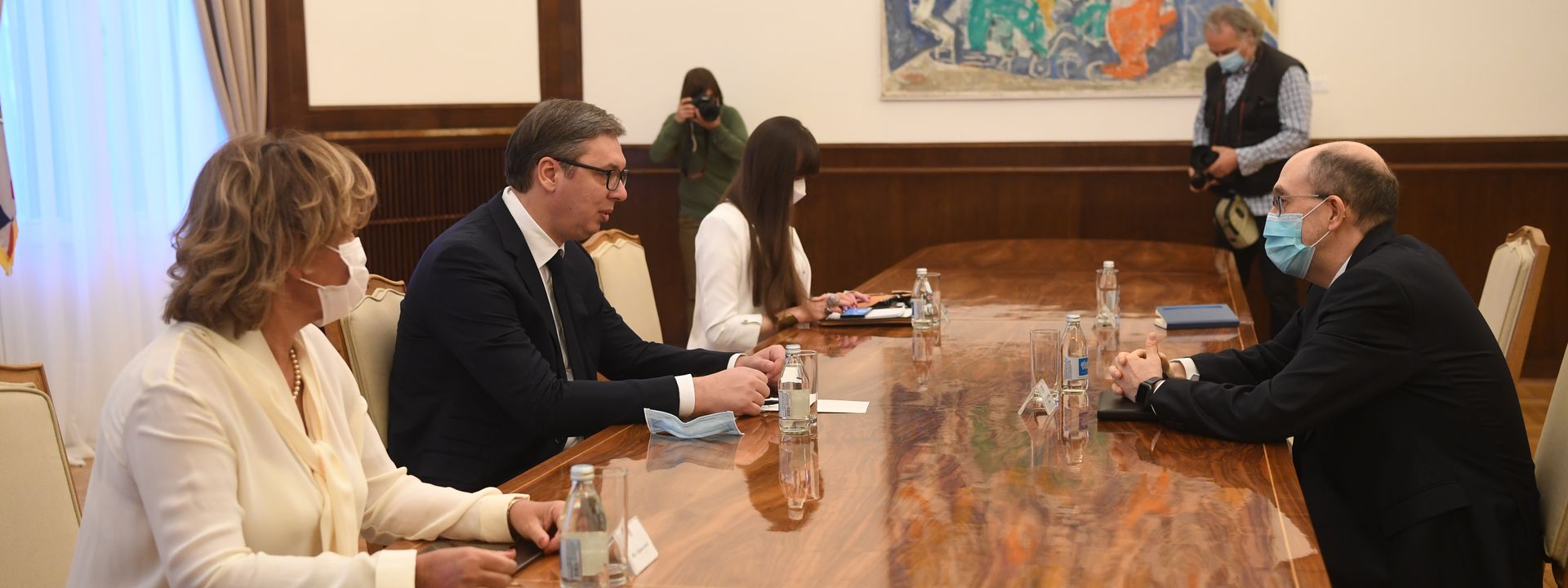
Il Presidente della Repubblica di Serbia Aleksandar Vučić ha ricevuto oggi l’Ambasciatore della Repubblica Italiana Carlo Lo Cascio, con cui ha convenuto che la visita della scorsa settimana del Capo della Diplomazia serba Nikola Selaković a Roma ha confermato la vicinanza tra i due Paesi e l’alto livello di reciproca intesa.
Il Presidente Vučić e l’Ambasciatore Lo Cascio hanno espresso l’auspicio che la situazione epidemiologica consentirà che quest’anno si tenga la quarta congiunta seduta dei due Governi, dato che la medesima darebbe una forte spinta alla cooperazione a tutto spiano tra i due Paesi.
Al riguardo, l’Ambasciatore italiano si è complimentato con le autorità serbe per gli ottimi risultati nella vaccinazione della popolazione, riconosciuti in tutto il mondo. L’Ambasciatore Lo Cascio ha sottolineato la solidarietà del nostro Paese nei confronti della Regione, come esempio di contributo alla stabilità dei Balcani Occidentali ribadendo la gratitudine dell’Italia per gli aiuti sanitari offertile dalla Serbia nei momenti più difficili.
Il Presidente Vučić ha detto che la solidarietà della Serbia nei confronti della Regione è l’espressione del suo senso di responsabilità nonché del desiderio che la cooperazione sia la base della prosperità dei Balcani Occidentali. Ha sottolineato che l’Italia è tra i principali partner della Serbia, sia sul piano bilaterale, che nell’implementazione della politica regionale. Il Presidente Vučić ha espresso la sua gratitudine per l’appoggio dell’Italia al cammino europeo della Serbia.
L’Ambasciatore Lo Cascio ha confermato che l’Italia è sostenitore dell’ingresso della Serbia nell’Unione Europea e che è disposta ad aiutare nell’implementazione delle riforme, che sono il presupposto per l’eurointegrazione. I due interlocutori hanno parlato, al riguardo, della necessità di accelerare le attività sulle riforme nel campo dello stato di diritto e dei media.
Nell’incontro si è parlato anche del dialogo tra Belgrado e Pristina, l’argomento in cui il Presidente Vučić ha evidenziato che la Serbia è disposta al dialogo e al compromesso come modalità per risolvere le questioni aperte.
Fonte: www.predsednik.rs
Foto: www.predsednik.rs
|
|
|
| Selaković: I vaccini non sono una questione di geopolitica ma di umanità |
|
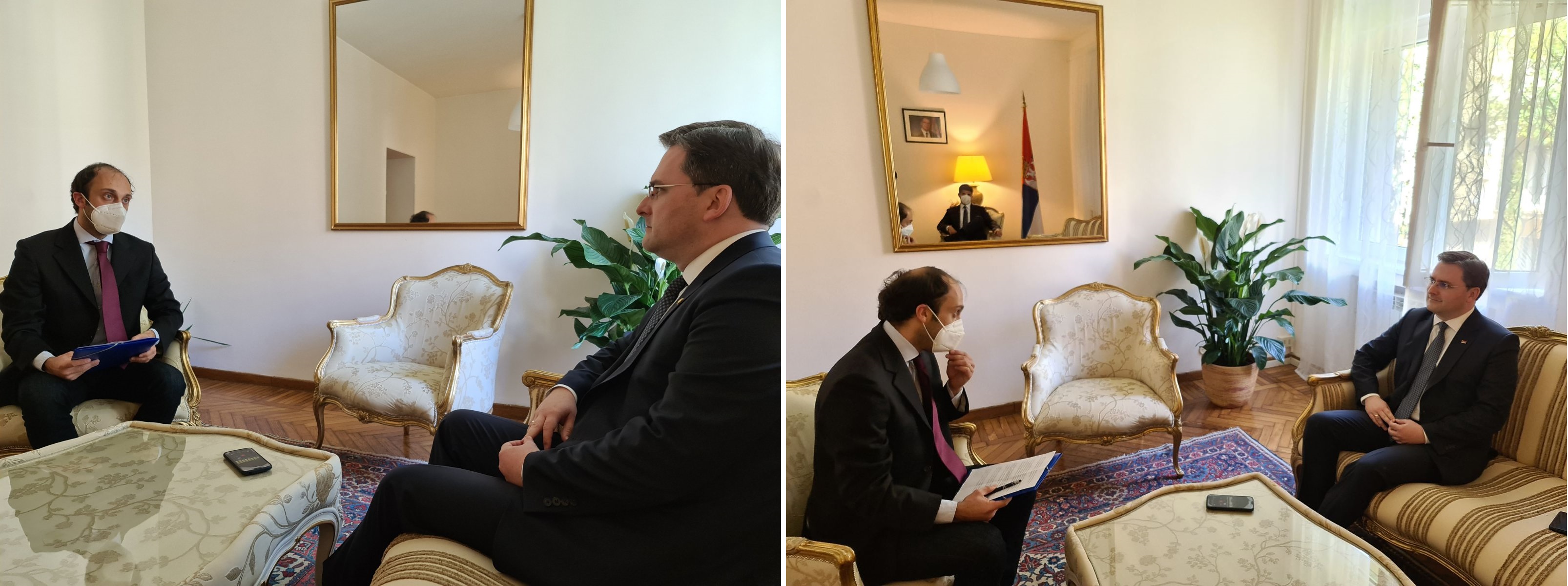
La Serbia prosegue con successo la sua campagna di vaccinazione anti Covid-19 in cui non è stata guidata dalle motivazioni geopolitiche, ma dall’intenzione di salvare le vite umane, ha dichiarato il Ministro degli Affari Esteri della Serbia Nikola Selaković nell’intervista rilasciata all’agenzia italiana „Nova“ durante la visita di due giorni a Roma.
“Non ritengo che si tratti di un mistero geopolitico, ma del frutto di un approccio completamente diverso”, ha dichiarato Selaković commentando il successo della Serbia nelle forniture dei vaccini contro il Covid.
A suo aviso, la corsa ai vaccini anti-covid “non è una questione geopolitica, ma è una questione di salvaguardia della salute della popolazione” e “quando esiste una tale priorità, non si agisce secondo la visione geopolitica ma con umanità”.
Selaković ha dichiarato che un paese piccolo e non così ricco come la Serbia ha contribuito al Fondo per i vaccini Covax versando in anticipo 4,9 milioni di euro, ma ad oggi non ha ricevuto nulla attraverso il detto programma.
„Ciò conferma che eravamo costretti a cercare i vaccini sul piano bilaterale. E abbiamo acquistato diversi vaccini, due occidentali e due orientali, offrendo ai nostri cittadini una totale libertà relativamente alla scelta del vaccino che gli sarà somministrato. Pfeizer-Biontech, Astra Zeneca, Sinopharm o Sputnik V“, ha detto.
Il che, come ha spiegato il Ministro, vale anche per i vertici politici, precisando che la Prima Ministra Ana Brnabić si è vaccinata con il vaccino Pfeizer, il Presidente dell’Assemblea Nazionale Ivica Dačić con il vaccino Sputnik V e il Ministro della Salute Zlatibor Lončar con il vaccino Sinopharm e che tutti sono stati protetti nella stessa maniera.
Chiaramente, ha precisato Selaković, tutto ciò è il risultato del grande impegno del Presidente Aleksandar Vučić il quale, come sottolinea, non si è posto il problema ed ha parlato direttamente con i Presidenti della Russia e della Cina, Vladimir Putin e Xi Jinping, nonché con i vertifici delle case farmaceutiche alfine di trovare la soluzione migliore per ottenere i vaccini.
Il Ministro degli Affari Esteri serbo ha sottolineato successivamente che Belgrado ha persino condiviso i vaccini con i paesi vicini.
“Abbiamo dimostrato che non riteniamo che solamente i cittadini della Serbia debbano usufruire di tali benefici, ma abbiamo condiviso i vaccini e stiamo cercando di condividerli con gli altri paesi dei Balcani Occidentali”, ha ribadito.
La pandemia del Covid-19, come afferma il Ministro degli Affari Esteri serbo, ha confermato gli ottimi rapporti bilaterali tra la Serbia e l’Italia. Durante la visita a Roma, Selaković ha invitato il Capo del Ministero degli Affari Esteri italiano Luigi Di Maio a visitare la Serbia.
“Questi incontri, soprattutto nelle terribili circostanze della pandemia del Covid-19, ci dimostrano chi sono i veri amici”, ha dichiarato, ribadendo che l’Italia è indubbiamente un Paese amico della Serbia e del popolo serbo.
A suo avviso, i rapporti bilaterali tra la Serbia e l’Italia si possono valutare con il massimo dei voti. “Vantiamo molto buoni rapporti, posso anche dire ottimi.”
Selaković ha precisato che per Belgrado l’eurointegrazione rimane priorità strategica.
Rispondendo alla domanda sulla recente relazione del Parlamento Europeo, in cui si raccomanda al gruppo dei cinque paesi membri i quali non riconoscono l’indipendenza del Kosovo di cambiare la propria posizione, Selaković ha notato che „il Parlamento Europeo ha agito completamente contrariamente alla posizione ufficiale delle istituzioni dell’UE, ovvero contrariamente alla neutralità riguardo alla questione del cosiddetto Kosovo, grazie alla quale l’UE può mediare nel dialogo tra Belgrado e Pristina“.
„L’unica cosa che posso dire è che esistono dichiarazioni e documenti da una parte, e, dall’altra parte, esistono chiare posizioni dei rispettivi paesi. Quando parliamo del riconoscimento dell’autoproclamato cosiddetto Kosovo, allora potete vedere che tutti i paesi dell’Unione Europea hanno la stessa posizione, visto che esistono cinque paesi membri (Spagna, Grecia, Slovacchia, Romania e Cipro) che non accettano tale approccio e appoggiano la posizione della Serbia. E proprio tale loro posizione ci consente di gestire il dialogo con la mediazione dell’UE, dialogo che è una delle questioni più complesse e più importanti per la Serbia, non solamente in relazione al suo cammino europeo ma anche per il futuro e per la stabilizzazione dell’intera Regione del Sudest Europeo“, ha dichiarato Selaković.
Lui ha definito la relazione del Parlamento Europeo come “risultato delle posizioni complesse” all’interno dell’organo legislativo dell’UE e ha indicato che “in sostanza si tratta solamente di una raccomandazione e che sono Madrid, Bucarest, Nicosia, Bratislava e Atene a decidere se accoglierla o meno”.
“Siamo sempre pronti e disposti al dialogo con Pristina e appoggiamo il ruolo del Rappresentante Speciale dell’UE Miroslav Lajčak”, ha aggiunto il Ministro Selaković, ribadendo che si tratta tuttavia di un processo molto difficile.
Ha ricordato che nell’aprile del 2013 è stato sottoscritto a Bruxelles il primo accordo sulla normalizzazione dei rapporti, che prevedeva quattro impegni: uno per Pristina e tre per Belgrado.
“La Serbia ha adempiuto a tutti i suoi obblighi, mentre all’unico obbligo che toccava al cosiddetto Kosovo – la costituzione dell’Unione dei comuni serbi – non si è adempiuti in otto anni. Ciò dice molto del loro approccio, ovvero del fatto che non sono disposti ad adempiere agli obblighi internazionali”, ha detto Selaković.
Da quanto afferma il Ministro, il nuovo Governo di Pristina del Primo Ministro Albin Curti non ha rispettato nemmeno la propria Costituzione”, che prevede l’assegnazione dei due Ministeri alla minoranza serba in Kosovo e Metohija.
“E’ la loro posizione, desiderano proseguire in questo senso e ciò dimostra che non sono in grado di rispettare le proprie regole”, ha sottolineato Selaković secondo cui il dialogo „dovrebbe basarsi sulla ricerca del compromesso, il che non vuol dire che una parte debba rinunciare a tutto, a che l’altra debba ottenere tutto: il compromesso significa che entrambe le parti debbano ottenere abbastanza“.
“Non rinunceremo alla ricerca di una soluzione di compromesso, che sarà sostenibile anche per le generazioni future”, ha ribadito.
Selaković ha sottolineato che la Serbia sta cercando, per quanto sia possibile, di continuare a consolidare „l’agenda positiva“ con i paesi dei Balcani Occidentali.
“Questo significa che siamo consapevoli del fatto che la cooperazione economica e il miglioramento dei rapporti economici possono comportare anche il rilassamento dei rapporti politici dimostrando in tale maniera che, nonostante il passato, i Balcani Occidentali possono essere uniti all’interno dell’UE e fare qualcosa di buono per i propri cittadini”, ha dichiarato Selaković riguardo all’iniziativa Mini Schengen.
Se non siamo uniti nei Balcani Occidentali, da quanto afferma il Ministro, “non possiamo contare su nessun tipo di concorrenzialità economica”, viste le dimensioni della Regione rispetto alla totalità dell’UE.
In merito al processo di adesione della Serbia all’UE, il Ministro Selaković ha ricordato che la Serbia è stato il primo paese che ha accettato la nuova metodologia dell’UE, „perché desideriamo accelerare l’intero processo di adesione“.
“Stiamo cercando di implementare le riforme sociali, e lavoriamo inoltre sul dialogo e sulla normalizzazione dei rapporti tra Belgrado e Pristina”, ha confermato il Capo della Diplomazia serba sottolineando che il Governo ha adottato “le riforme strutturali” nel campo dello stato di diritto, prosegue il lavoro sugli emendamenti costituzionali ai fini della modifica della procedura di nomina dei magistrati indicando che una “particolare attenzione” è dedicata al miglioramento della situazione relativamente alla libertà di espressione e dei media.
“Abbiamo cambiato e stiamo tuttora cambiando molti aspetti della nostra società”, ha dichiarato Selaković aggiungendo che la Serbia di oggi è un paese molto diverso.
Come esempio di una ben riuscita trasformazione del paese, il Ministro ha richiamato l’attenzione al fatto che la Serbia è il paese leader dei Balcani Occidentali relativamente agli investimenti esteri diretti.
“Nonostante la situazione di emergenza causata dal Covid-19, nel 2020 siamo riusciti ad attirare tre miliardi di euro di investimenti esteri diretti”, ha detto. Il che, secondo lui, “è il miglior indicatore di qualità delle riforme intraprese dalla Serbia dato che non esiste un’azienda europea che investirebbe in un paese in cui i suoi capitali non fossero sicuri e garantiti”.
Il Ministro ha sottolineato che la Serbia si impegna molto per raggiungere l’obiettivo strategico ovvero di diventare il paese membro dell’UE, ma che cerca di mantenere un buon partenariato con la Russia e la Cina.
“Già da 20 anni, tutti i nostri Governi lavorano su quest’obiettivo, a cui non rinunceremo. Chiaramente, cerchiamo di mantenere un buon partenariato con i nostri amici in Russia e in Cina: noi siamo un paese piccolo e non così ricco e pertanto cerchiamo di preservare la nostra economia per poter dare la possibilità ai cittadini di lavorare, di guadagnare e di vivere in Serbia”, ha chiarito Selaković.
Ha detto che il maggior partner della Serbia è tuttora l’Europa, dato che il 67% dello scambio commerciale della Serbia avviene con i paesi membri dell’UE e che gli investimenti principali provengono dall’UE.
Le società italiane – ha detto – danno il lavoro a più di 26 mila persone in Serbia, e ci sono anche 1.789 società con la partecipazione del capitale italiano operative sul mercato serbo.
Attualmente, la Germania è il primo partner economico della Serbia.
Come afferma Selaković, per questo motivo non ci sono margini per la narrazione secondo la quale la Cina è il principale partner della Serbia.
|
|
|
| Auguri di Buona Pasqua |
|
04. aprile 2021.
Buona Pasqua a tutti gli amici che festeggiano oggi, secondo il calendario gregoriano!
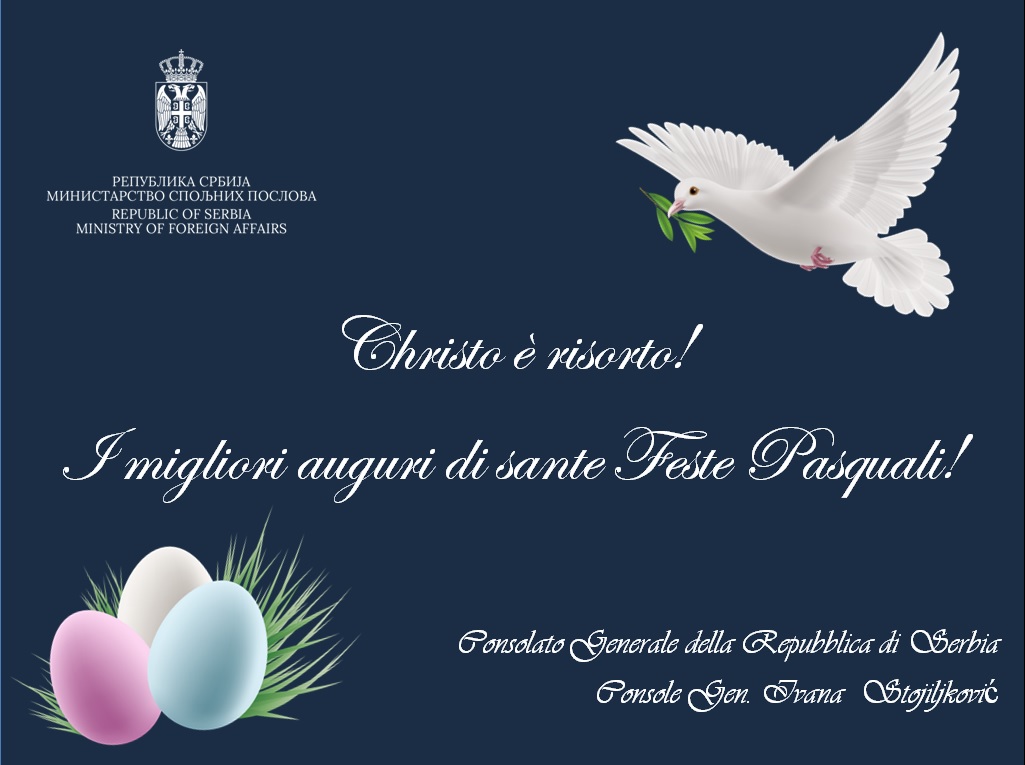 |
|
|
| Selaković: Per l’Italia la Serbia è il paese fondamentale della Regione |
|
1° aprile 2021
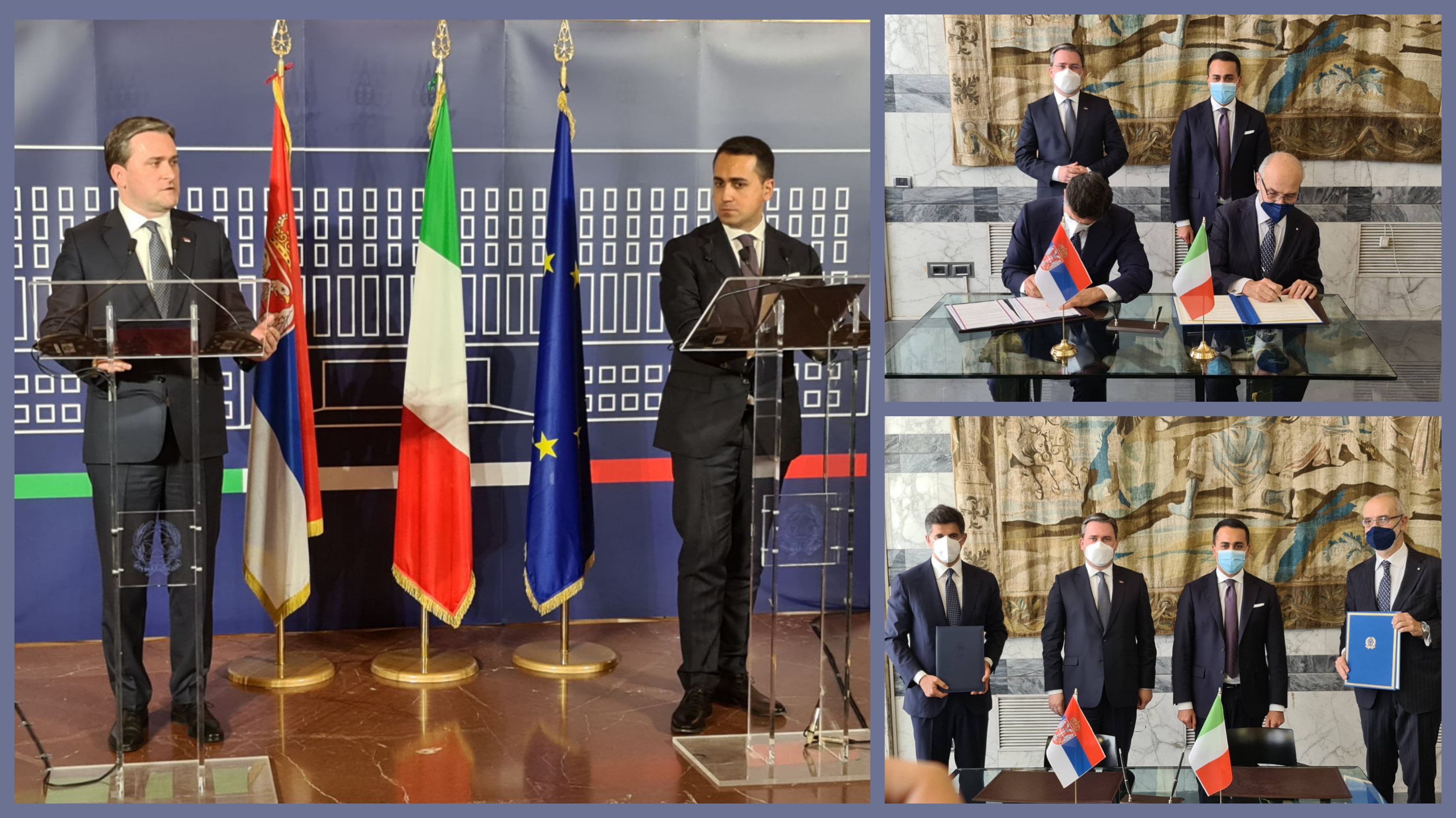
Il Ministro degli Affari Esteri della Repubblica di Serbia Nikola Selaković ha detto oggi che l’Italia considera la Serbia il paese fondamentale della Regione e che il nostro Paese, con il suo sviluppo economico e sociale ha dimostrato che i paesi dei Balcani Occidentali possono davvero svilupparsi e raggiungere gli standard europei.
“Nell’incontro è stato detto senza giri di parole: tutto gli occhi sono puntati addosso alla Serbia. Grazie per il fatto che il vostro Governo e il Primo Ministro (Mario) Draghi collocano la Regione dei Balcani Occidentali altamente sulla lista di priorità della vostra politica estera”, ha detto il Capo della Diplomazia Serba alla conferenza stampa con l’omologo italiano Luigi Di Maio.
Selaković ha detto di aver parlato con Di Maio di diversi argomenti importanti sottolineando che oggi sono stati sottoscritti due accordi importanti, i quali, come evidenziato, sono indicatori di un rapporto dinamico tra i due Paesi e i due Ministeri.
Il Ministro ha spiegato che il primo accordo riguarda la cooperazione tra i due Ministeri degli Affari Esteri e definisce attività da realizzare nel prossimo periodo, mentre l’altro si riferisce ai diplomatici di entrambi i Paesi e dei loro familiari conviventi consentendogli di trovare il lavoro.
Mettendo in rilievo il fatto che l’Italia è il maggior paese dell’UE che ancora oggi, come fin dall’inizio, appoggia fortemente la Serbia sul suo cammino dell’eurointegrazione, Selaković ha ringraziato il Capo della Diplomazia del chiaro - dal punto di vista dei principi – e forte appoggio per l’apertura di tutti i capitoli non aperti per i quali la Serbia è pronta.
Inoltre, Selaković ha ringraziato l’omologo italiano anche del supporto dato alla Serbia, come anche agli altri paesi dei Balcani Occidentali, affinché possano pianificare il loro futuro e vederlo all’interno dell’UE come suoi membri a pieno titolo.
Il Ministro Selaković ha sottolineato che 1789 aziende italiane presenti in Serbia, che danno il lavoro a più di 26.000 lavoratori, nonché quasi 3,5 miliardi di euro di scambio economico nell’anno scorso, sono solo alcuni indicatori delle relazioni tra i due Paesi.
“I nostri rapporti politici bilaterali si sono arricchiti e la loro dinamica aumenta anche con le sedute congiunte dei due Governi. Perciò, abbiamo parlato anche della possibilità di organizzare la quarta seduta dei Governi in Serbia, se lo consentono le circostanze epidemiologiche”, ha detto il Ministro Selaković.
Inoltre, il Capo della Diplomazia Serba ha detto che si era parlato anche della libertà di spostamenti ai tempi della pandemia, ovvero dei cosiddetti certificati digitali verdi per gli spostamenti nonché dell’organizzazione della Conferenza sul futuro dell’Europa, la quale dovrebbe essere una spinta per lo sviluppo e per il proseguimento di sviluppo delle tecnologie moderne, soprattutto del settore delle Tecnologie dell’Informazione, nonché uno dei fattori chiave per evitare la fuga dei giovani dai loro paesi.
“Avevamo poco tempo e tanti argomenti. Sono certo che avrò l’occasione di accogliere il collega Di Maio a Belgrado, mi piacerebbe che ciò avvenisse prima della Seduta congiunta dei due Governi. E abbiamo detto di essere disponibili ad accogliere i colleghi italiani già ai primi di ottobre p.v., se lo consente la situazione epidemiologica”, ha sottolineato il Ministro.
Selaković ha ringraziato l’Italia dell’aiuto offerto durante la pandemia del Covid, quando aveva inviato in Serbia i propri esperti del campo medico e virologico, i quali avevano in precedenza dovuto affrontare la prima durissima ondata nel Nord Italia.
“Grazie per questo, cari amici. Desidero ringraziarvi anche della calorosa accoglienza romana, presso il bellissimo palazzo della Farnesina e cogliere di nuovo l’occasione per invitarvi a Belgrado per poter ricambiare dimostrando la nostra ospitalità serba”, ha detto Selaković.
Il Ministro ha sottolineato che incoraggia la notizia sulla ripresa dei voli tra Belgrado e Roma e che è convinto che ciò contribuirà al proseguimento della buona cooperazione commerciale tra i due Paesi, nonché all’arrivo – notevolmente più agevolato - di altri interessati imprenditori e investitori.
|
|
|
| Le celebrazioni del Giorno della Memoria del 17 marzo 2004 – il pogrom avvenuto in Kosovo e Metohija |
|
17. marzo 2021
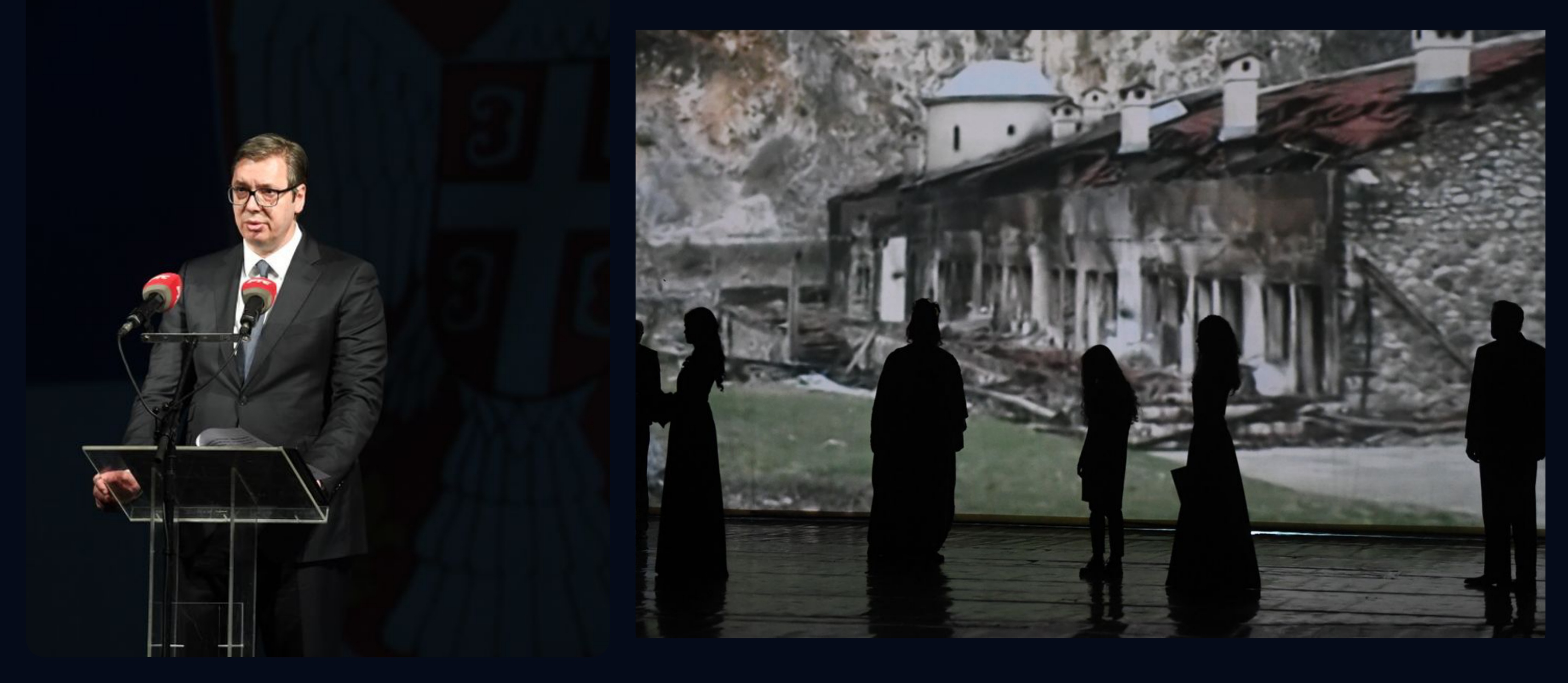
Il Presidente della Repubblica di Serbia Aleksandar Vučić ha assistito oggi alle celebrazioni del Giorno della Memoria del 17 marzo 2004 – il pogrom avvenuto in Kosovo e Metohija. Ha detto che esattamente 17 anni fa in Kosovo e Metohija era avvenuto il pogrom, e che il pogrom è il peggiore di tutti i crimini.
“Forse esiste l’epoca in cui non siamo in grado di impedire l’ingiustizia, ma non deve mai esistere l’epoca in cui non ci ribelliamo contro l’ingiustizia, queste parole di Elie Wiesel, soopravvissuto al campo di sterminio, premio Nobel, ci obbligano per sempre a non tacere contro il crimine, a prescindere da chi l’abbia commesso“, ha detto il Presidente Vučić aggiungendo che serbiamo memoria e che abbiamo imparato ogni lezione che ci ha visti sconfitti, ogni lezione in cui abbiamo taciuto le proprie vittime, ogni lezione in cui eravamo disposti a dimenticare.
“La Serbia oggi non è più debole, né è il paese dei perdenti, non minaccia, ma tanto meno dimentica, è disposta al dialogo, ma non all’umiliazione. La Serbia, proprio come ogni altro paese, ha diritto di prendersi cura del suo popolo, della sua incolumità e del suo benessere. Il diritto alla vita è il fondamentale diritto umano e noi lo difenderemo sempre”, ha detto il Presidente Vučić.
Il Presidente Vučić ha detto che il pogrom è il peggiore di tutti i crimini, dato che esso rappresenta non solamente l’atto, ma l’intenzione, la politica, la premeditazione di pulire in modo violento un’area, un paese, dai rappresentanti di altre nazioni e religioni.
“Non abbiamo diritto di tacere” ha lanciato il messaggio il Presidente della Serbia sottolineando che siamo tenuti ad essere vincitori senza sangue né guerre, i migliori nell’economia, nella sanità, nello sport, nell’istruzione e in tutto ciò che rappresenta lo sviluppo e la prosperità.
“Ci auguriamo le stesse cose per gli altri, ovvero che si occupino di loro stessi e che abbiano successo, poiché siamo consapevoli che il crimine è l’arnese del perdente, e che i vincitori non ne hanno bisogno, essi ricordano, ma perdonano e vanno avanti, mentre i perdenti girovagano all’interno dello stesso circolo vizioso. Noi serbi non vogliamo più esserlo, vogliamo il futuro, in cui ricorderemo sì, ma dal quale non ritorneremo indietro. Sappiamo quanto stava accadendo e lo chiamiamo con il nome giusto”, ha concluso il Presidente Vučić. |
|
|
| Selakovic: Fight against all forms of crime is a priority of the Serbian Government |
|
8 March 2021

Minister of Foreign Affairs of Serbia Nikola Selakovic said today that the fight against all forms of crime was a top priority of the Serbian Government and an integral part of the EU accession process.
"It is also our moral duty, in order to leave a better world for the generations to come", Selakovic said participating via video-link at the 14th UN Congress on Crime Prevention and Criminal Justice, held in Kyoto.
Minister Selakovic emphasized that Serbia, in its Second Serious and Organized Crime Threat Assessment from 2019, identified as its goal to eliminate cybercrime, human trafficking, terrorism and irregular migration.
The Serbian Foreign Minister pointed out that our country had established in a timely manner a normative and institutional framework that regulates prevention of abuse in this area, as well as that the Office of the Special Prosecutor for Cybercrime, a special court department and a special police unit were established.
The Minister underlined that, in the field of the fight against corruption, Serbia was guided by the postulates set out in the UN Convention against Transnational Organized Crime and the UN Convention against Corruption.
Selakovic pointed out the efforts made by the Anti-Corruption Agency, as an independent state body, to protect the public interest, build individual and institutional integrity, strengthen transparency and accountability of the public administration.
"We strongly condemn all forms of terrorism, including extremism and radicalism, and call for them to be fully eradicated, while implementing the relevant UN resolutions and conventions and the UN Global Counter-Terrorism Strategy", the Head of Serbian diplomacy underscored.
In order to combat these complex phenomena efficiently and successfully, Selakovic said, it was of vital importance to build capacities of our societies and states, while exchanging experiences at the regional and global levels.
Minister Selakovic thanked Japanese Ambassador Hikihara for the skill he showed in conducting the talks on harmonizing and adopting the Kyoto Declaration, which, as he stressed, was an important indicator of the commitment to creating and maintaining the institutional framework for crime prevention as one of the main preconditions for promoting sustainable development goals.
"Back in 1970 when Japan hosted this event for the first time, we demonstrated strong political will to draw attention to the problem. Today, it is incumbent upon us to reaffirm this willingness and resolve and translate it into concrete steps", the Serbian Foreign Minister said.
|
|
|
| Vaccinazione contro il coronavirus in Serbia |
|
04.03.2021.
Il governo della Serbia vaccina la sua popolazione nella lotta contro Covid-19 da più di un mese. La vaccinazione di massa è iniziata il 19 gennaio.
I cittadini si registrano tramite eDirezioneo per telefono - tramite il contact center, dopodiché ricevono un messaggio sulla data della vaccinazione.
I cittadini possono scegliere il vaccino che desiderano ricevere e sono disponibili: "Pfizer-BioNTech", cinese "Sinopharm", russo "Sputnik V" e "AstraZeneca".
* 21. Febbraio, 150.000 vaccini AstraZeneca sono arrivati in Serbia e sono disponibili in ogni punto di vaccinazione dal 23 febbraio. (La Serbia è il primo paese dei Balcani ad avere questo vaccino).
La Serbia, insieme agli Emirati Arabi Uniti, è il terzo paese ad avere più di tre vaccini disponibili.
Per numero di vaccinazioni per milione di abitanti la Serbia è la seconda in Europa, dopo la Gran Bretagna, e per numero di rivaccinazioni per milione di abitanti, il nostro Paese è il primo in Europa. Dopo la Serbia ci sono Malta e l'Islanda.
* La Serbia ha 181.000 persone vaccinate per milione di abitanti.
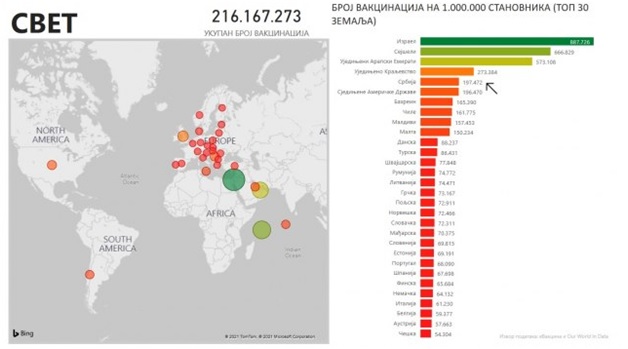
La Serbia è il 5 ° Paese al mondo per numero di cittadini vaccinati ogni 1.000.000 di abitanti, dopo Israele, Seychelles, Emirati Arabi Uniti e Gran Bretagna (la Serbia ha superato gli Stati Uniti il 25 febbraio).
Secondo i numeri della rivaccinazione, la Serbia è la prima in Europa e la quarta al mondo.
In numeri assoluti, la Serbia ha più cittadini rivaccinati di Ungheria, Slovenia, Croazia, Bulgaria, Montenegro, Macedonia settentrionale e Albania complessivamente.
La Serbia è di gran lunga la prima nella regione per numero di vaccinazioni per milione di abitanti, seguita da Romania, Slovenia, Ungheria, Croazia, Bulgaria e Albania.
Secondo il numero totale di vaccinazioni e rivaccinazioni, la Serbia è seconda nella regione, dopo la Romania.
Le prime quantità di vaccino "Pfizer" sono arrivate in Serbia il 22 dicembre.
* 16.gennaio - Sono arrivate un milione di dosi di vaccino cinese "Sinopharm".
* 29. gennaio sono arrivate 40.000 dosi del vaccino russo "Sputnik V".
Altre quantità dovrebbero essere consegnate nei mesi di febbraio e marzo, su un totale di due milioni di dosi del vaccino russo.
* 9.febbraio è arrivato un nuovo contingente di 50.000 vaccini "Sputnik V" dalla Russia.
* 11.febbraio, esperti russi sono arrivati in Serbia per discutere insieme agli esperti serbi su come avviare la produzione di vaccini russi in Serbia il prima possibile. Hanno visitato l'Istituto Torlak per valutare le capacità tecnologiche come quelle del personale dell'Istituto per la produzione del vaccino "Sputnik V".
Il presidente Vučić ha recentemente sottolineato che il nostro paese investirà in nuovi impianti, nuove attrezzature che soddisfino tutti gli standard, con l'obiettivo di produrre il vaccino nel nostro paese. Il vaccino "Sputnik V" del nostro paese verrebbe distribuito nella regione, ma anche nei paesi europei.
* 10.febbraio, un altro contingente di 500.000 di vaccino cinese "Sinopharm" è arrivato in Serbia.
Il presidente della Serbia, AleksandarVučić, ha dichiarato che è stato assicurato l'arrivo di altre 88.000 dosi delvaccino "Pfizer" per il 15 e 22 febbraio.
* 15.febbraio, 40.950 dosi del vaccino contro il virus Covid della società "Pfizer-BioNTech" sono arrivate in Serbia.
* 22.febbraio - altri 46.800 vaccini "Pfizer" sono arrivati in Serbia.
* 22.febbraio - sono stati consegnati altri 50.000 vaccini "Sputnik V".
* Consegna concordata di altri 500.000 vaccini "Sinopharm", che secondo l'accordo tra il presidente AleksandarVučić e XiJinping arriveranno il 5 marzo.
* La Serbia ha firmato dei contratti per l'acquisto di 12.332.200 vaccini - entro la fine di febbraio nel nostro Paese sono arrivati circa due milioni di vaccini e si attende la consegna di altri 10 milioni di dosi.
In Serbia sono state eseguite 1.375.872 vaccinazioni contro il virus corona e più di 500.000 persone hanno ricevuto la seconda dose.
Il primo ad essere vaccinato era il personale medico, poi è iniziata l'immunizzazione degli utenti dei centri gerontologici, per poi proseguire la vaccinazione delle forze dell’ordine, dell’esercito serbo, rappresentanti dei mediaecc…
Vaccinazione di membri del corpo diplomatico
Il governo della Serbia è stato tra i primi al mondo a consentire l'immunizzazione dei membri del corpo diplomatico.
In organizzazione dell’Istituto della salute pubblica Batut di Belgrado e MAE, 114 membri del corpo diplomatico (personale delle ambasciate di BiH, Turchia, Palestina, Montenegro, Angola ecc, nonché diverse organizzazioni internazionali) sono stati vaccinati con il vaccino Sinopharm negli spazi dell’Istituto Batut nei giorni di 13, 18 e 19 febbraio. Queste 114 persone fanno parte di un totale di quasi 1.200 richieste registrate finora, e sono titolari di carte d'identità speciali (diplomatiche, ufficiali, consolari, ecc.). Si è completato così il primo ciclo di vaccinazioni con "Sinopharm", il secondo turno è previsto per l'11 e il 12 marzo.
Il 23 febbraio è iniziata la vaccinazione con il vaccino "Pfizer", secondo la dinamica di 100 persone al giorno durerà dunque prossimi 10 giorni lavorativi (sono state registrate quasi 1.000 richieste). Questo gruppo comprende la maggior parte dei membri del personale e le loro famiglie delle ambasciate dei paesi europei, degli Stati Uniti, del Canada, dell'India, del Brasile, dell'Australia, ecc. nonché degli uffici delle organizzazioni internazionali del sistema delle Nazioni Unite, quindi dell'OSCE, della NATO, Croce Rossa e altri.
Dopo il completamento di questa fase, in accordo con l’Istituto Batut, la vaccinazione dovrebbe proseguire anche con i vaccini "Sputnik" ed "AstraZeneca".
Donazione di vaccini ai paesi della regione
* 14.febbraio - Il presidente Vučić ha consegnato il primo contingente di 4.680 vaccini "Pfizer" al primo ministro della Macedonia del Nord Zoran Zaev, mentre il 24 febbraio il ministro Lončar ha consegnato altre 3.510 dosi di vaccino "Pfizer" al ministro della salute macedone.
* 17.febbraio - La Serbia ha donato 2.000 vaccini "Sputnik V" al Montenegro.
* Finora in Serbia sono stati vaccinati circa 5.000 operatori sanitari della Repubblica Serba di Bosnia ed Erzegovina e il nostro paese fornirà il sistema informativo sulle vaccinazioni alla Repubblica Serba di Bosnia ed Erzegovina, in modo che possa utilizzarlo quando avrà dei vaccini a disposizione.
* 25.febbraio, il governo della Federazione della Bosnia ed Erzegovina ha accettato la donazione di 5.000 vaccini dalla Serbia.
|
|
|
| Ministro Selakovic ha inviato un messaggio di auguri al Ministro Luigi Di Maio |
|
Il Ministro degli Affari Esteri della Repubblica di Serbia Nikola Selakovic ha inviato un messaggio di auguri al Ministro Luigi Di Maio per la conferma dell’incarico di Ministro degli Affari Esteri e della Cooperazione Internazionale della Repubblica italiana.
Augurando al capo della diplomazia italiana ogni successo per il suo futuro operato, Selakovic ha sottolineato l’amicizia tra Serbia e Italia e ha espresso l’auspicio che il partenariato strategico e la cooperazione tra i due Paesi possano ulteriormente rafforzarsi.
“Sono convinto che, su fondamenta solide del partenariato strategico e dei rapporti di amicizia, negli attuali tempi delle grandi sfide globali, continueremo a dare un contributo concreto alla forza e vitalità della cooperazione bilaterale tra Serbia e Italia, per il benessere dei nostri popoli e nostri Paesi”, è riportato nel messaggio augurale del Ministro Selakovic, con l’auspicio che l’incontro con il collega italiano avvenga al più presto.
Belgrado,
19 febbraio 2021
|
|
|
| Metropolitan Porfirije of Zagreb and Ljubljana elected as the new Patriarch of Serbia |
|
18 February 2021
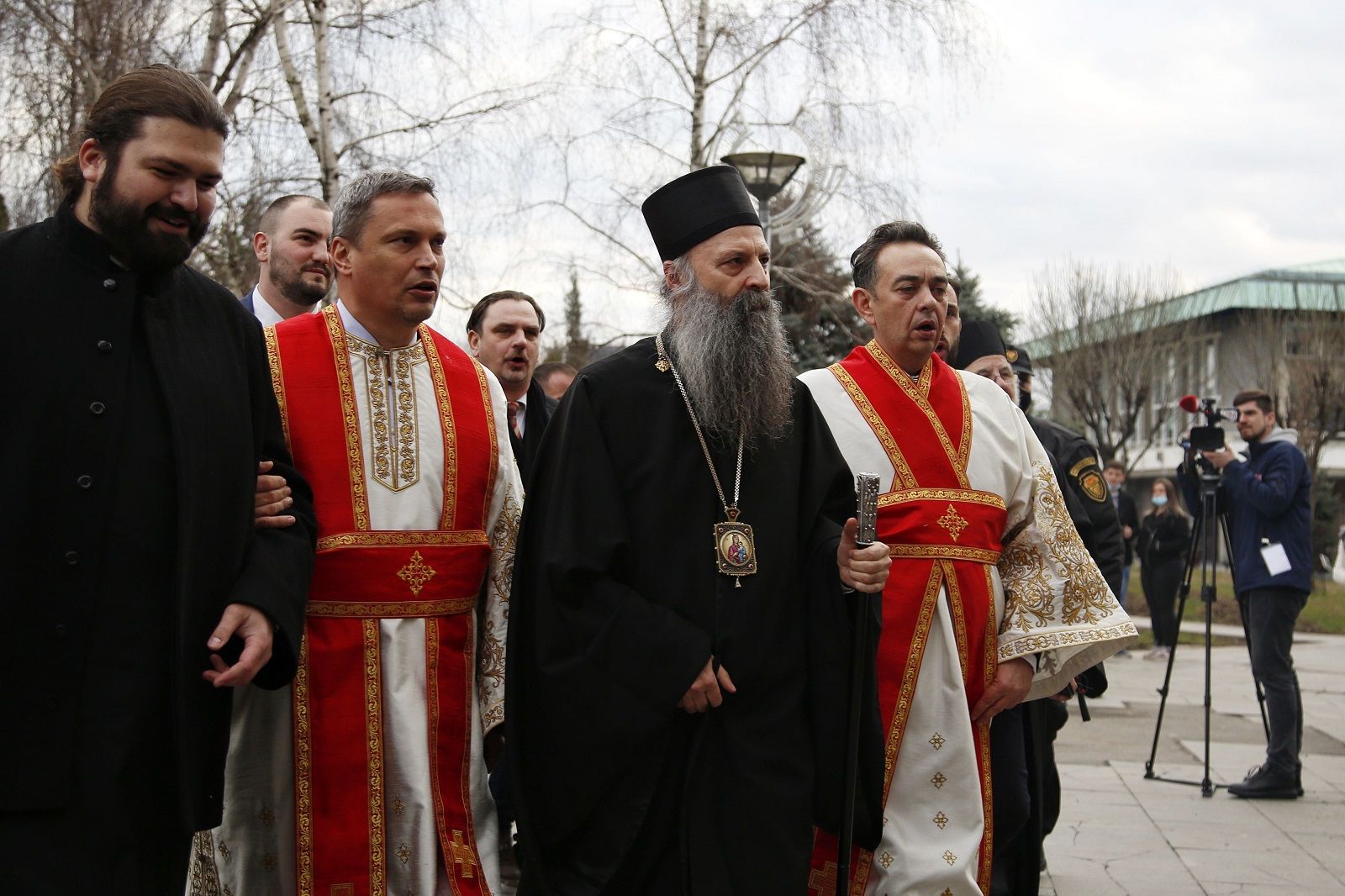
The Holy Assembly of Bishops of the Serbian Orthodox Church elected His Eminence Metropolitan Porfirije of Zagreb-Ljubljana, PhD, as the new Serbian Patriarch, in its convocation in Memorial Cathedral of Saint Sava in Belgrade on 18 February 2021.
Immediately after the election a thanksgiving service was officiated and Many Years was chanted to the Archbishop of Pec, Metropolitan of Belgrade-Karlovci and Serbian Patriarch Porfirije. Bells at Saint Sava Cathedral in the Vracar district of Belgrade rang a few minutes before 4:00 pm indicating that the 46th Patriarch of Serbia was elected.
Newly-elected Archbishop of Pec, Metropolitan of Belgrade-Karlovci and Serbian Patriarch Porfirije (Peric) was born on 22 July 1961 in Becej, to father Radivoje and Mother Radojka. He was baptized as Prvoslav. He finished primary school in Curug, and the “Jovan Jovanovic Zmaj” Grammar School in Novi Sad. He was ordained a monk according to the rite of small schime by his spiritual father, then hieromonk Dr. Irinej (Bulovic), at Decani Monastery on Sunday of St. Thomas in 1985.
He graduated from the Faculty of Orthodox Theology in Belgrade in 1986, when the then Bishop of Raska-Prizren Diocese, future Serbian Patriarch Pavle of blessed memory, ordained him a hierodeacon at the monastery of Holy Trinity in Musutiste.
He attended postgraduate studies in Athens from 1986 until 1990. That year, upon the blessing of Bishop Dr. Irinej of Backa, he joined the monastery of Holy Archangels in Kovilj, where he was ordained as hieromonk and became its abbot.
Many young monks and novices came to the monastery following him. These were the years when the Kovilj Monastery became a spiritual center for many young people: intellectuals, artists, popular actors and rock musicians, especially from Novi Sad and Belgrade. Since then abbot Porfirije has particularly dealt with drug-addicted patients. In 2005, he formed for this purpose a therapeutic community called “The Land of the Living”, which is recognized as the most successful drug-addiction therapy project and, under the leadership of Bishop Porfirije, it has more than a hundred residents in camps throughout Serbia today.
During the ordinary meeting of the Holy Assembly of Bishops of the Serbian Orthodox Church in Belgrade on 14 May 1999 he was elected as Bishop of Jegar, Vicar of the Diocese of Backa.
He defended his PhD thesis Possibility of knowability of God in St. Paul’s understanding according to the interpretation of Saint John Chrysostom at the Faculty of Theology of the University of Athens in 2004.
He became a lecturer at the Faculty of Orthodox Theology - Department of Pastoral Psychology - succeeding famous psychiatrist, academician Dr. Vladeta Jerotic. His lectures have been attended not only by students of the Faculty of Orthodox Theology, but other Belgrade faculties as well.
Together with a group of experts: psychologists, doctors, criminologists, sociologists, Bishop Porfirije founded a civic association that deals with the resocialization of victims of destructive religious sects and cults.
Bishop Porfirije has not been just president of the Steering Board for a decade, but a real spiritus movens of the Humanitarian Fund “Privrednik”, which has provided scholarships for a great number of gifted, but poor pupils and students, regardless of their nationality or religious affiliation.
In 2005, the National Assembly elected him as representative of all Churches and religious communities, to be a member of the Council of the Republic Broadcasting Agency, and in 2008 the RBA elected him its president. As President of the Council of the Republic Broadcasting Agency, Bishop Porfirije supported the long-term interests of society and citizens, unaffected by political influences.
Since then, church radio stations have been heard in the broadcasting spectrum of Serbia. He has made a key contribution to launching of a series of radio and television shows dealing with religious topics.
In 2010, The Holy Assembly of Bishops entrusted him to establish military chaplaincy in the Serbian Armed Forces. The fruits of his labour in that field include not only the suitable legal regulations, but also the selection of military chaplains, the organization and equipping of churches at barracks and performance of the first religious services.
His expert theological works Bishop Porfirije published in magazines both in Serbia and abroad. He participated in a large number of scientific conferences and symposia across the globe.
Bishop Porfirije, as one of the most prominent contemporary Serbian clergymen and intellectuals, has an extremely wide circle of friends, not only in the Homeland, and he fosters personal friendship and close cooperation with priests and representatives of other Churches and religious communities.
He speaks Greek, English, German and uses the Russian language, while his style of communication is always adapted to his interlocutors.
He was enthroned as the Metropolitan of Zagreb and Ljubljana on 13 July 2014 in the Cathedral Church of the Transfiguration of the Lord in Zagreb. The solemn Hierarchal Liturgy was served by Serbian Patriarch Irinej, accompanied by a large number of archbishops of the Serbian Church and other sister Churches, as well as priests and monks, and pious people.
 |
|
|
| Le congratulazioni al nuovo Presidente del Consiglio della Repubblica d’Italia |
|

Le congratulazioni al nuovo Presidente del Consiglio della Repubblica d’Italia
Il Presidente della Repubblica di Serbia, dott. Aleksandar Vučić ha inviato le congratulazioni al nuovo Presidente del Consiglio della Repubblica d’Italia, dott. Mario Draghi, del seguente contenuto:
“Sincere congratulazioni per l’incarico di Presidente del Consiglio della Repubblica d’Italia , con i migliori auguri di buona salute e di successo nel Suo lavoro.
La fiducia che Le è stata conferita, che consiste nella gestione del Governo della Repubblica d’Italia, rappresenta un grande onore ed immensa responsabilità soprattutto in questo momento di crisi globale, senza precedenti nella storia recente, la quale ci ha posto davanti alle sfide mai conosciute prima. Sono convinto che Lei svolgerà l’incarico di Premier con la profonda dedizione ed indubbia professionalità, per il bene della Repubblica d’Italia e dei suoi cittadini.
La Repubblica di Serbia si è dedicata allo sviluppo della partnership strategica con il paese amico, la Repubblica d’Italia. Sono convinto che la vicinanza e la solidarietà, che abbiamo dimostrato anche durante l’attuale pandemia, daranno lo stimolo maggiore ai nostri rapporti e alla collaborazione nei settori di comune interesse, contribuendo al progresso dei nostri Paesi e dei nostri Popoli”
Congratulations to the newly elected Prime Minister of the Republic of Italy
President of the Republic of Serbia Aleksandar Vučić sent congratulation to the newly elected Prime Minister of the Republic of Italy, Mario Draghi, which reads as follows:
"Please accept sincere congratulations on taking office as Prime Minister of the Republic of Italy, with best wishes for good health and much success in your work.
The post entrusted to you to lead the Government of the Republic of Italy is a great honour, and a great responsibility especially now, during the global crisis unprecedented in recent history that has put us all in front of unimaginable challenges. I am convinced that you will perform the duty of Prime Minister with true dedication and undoubted expertise to benefit the Republic of Italy and all its citizens.
The Republic of Serbia is committed to developing a strategic partnership with the friendly Republic of Italy. I am convinced that the closeness and solidarity, which we showed during the current pandemic, will give impetus to our relations and cooperation in areas of common interest, thus contributing to the progress of our states and nations," reads the congratulation of President Vučić.
Belgrade,
13th February 2021
|
|
|
| President Vucic: Serbia is ready for dialogue on Kosovo and Metohija, but will refuse being humiliated |
|
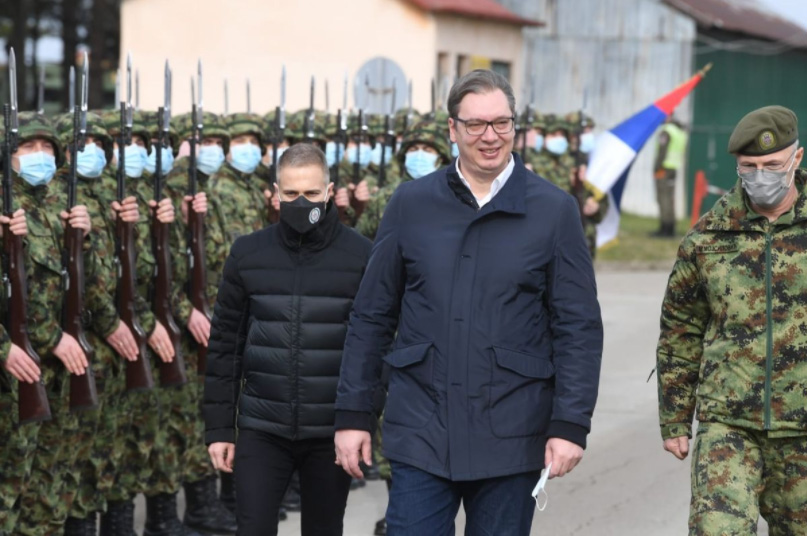
President of the Republic and Supreme Commander of the Serbian Army Aleksandar Vucic attended a demonstration of capabilities of one part of Serbian Army units in the "Rastko Nemanjić" barracks in Pancevo. On this occasion, President Vucic stated that Serbia was ready to continue the EU-facilitated dialogue with Pristina at any point, while respecting also the position of the United States as well as the positions of Russia and China.
The President said that he would rather put his "head on the chopping block" than sign any document with a recognition and reminded that he had already once refused to do so in Washington, where there were two versions of the agreement.
He stated that he immediately had his delegation leave the meeting, that he told the U.S. delegation that Serbia would not sign such an agreement, while conveying that Serbia would always endeavour to hold peaceful talks in order to preserve peace, but that it would not take any humiliation.
The Serbian President thanked the U.S. President Joe Biden for the letter of congratulations on the occasion of the upcoming Statehood Day, in which, in addition to the usual emphasis on commitment to promoting economic cooperation, regional stability and democratic values, he unequivocally called for mutual recognition of Serbia and "Kosovo" as a result.
Mutual recognition between Serbia and "Kosovo" is not part of any act of any world organization, the President pointed out and reiterated that Serbia was ready to continue the EU-facilitated dialogue with Pristina at any point, while respecting also the position of the United States as well as the positions of Russia and China.
According to the president, the situation is difficult and will only be increasingly difficult.
"As I told you three days ago, I can see it and I expect it, I can see the situation slowly tightening, because the conflicts between them at the global level have been increasing and intensifying, and then we have to pay the price", the President said.
President Vucic said that said that it was up to our state to continue strengthening the country in the economic sense.
The President added that the role of the army was very important in the highly complex security and political conditions of the modern world, and that was why Serbia needed to do everything it could to deter any potential aggressor and attacks on citizens and the country.
"The policy of strengthening the armed forces will continue at a faster pace", the President emphasized, adding that the goal was for the Serbian Army to play a stabilizing role with regard to the political developments in the region.
According to him, it should be clear to everyone that Serbia was not a punching bag and that not everyone could attack and threaten it like it was the case in the past.
Vucic said that he was pleased with what he saw and that a lot had been done in the previous period, pointing out that the salaries of military personnel would be significantly increased as of April.
President Vucic also stated that investments in the Serbian Army would continue, whom he told that he expected the Army to continue to be the guardian of our country, its integrity and freedom.
"We expect you to be the guardians of our country, its integrity and freedom, the defenders of our people, the guardians of the homeland, the protectors of the interests of the state of Serbia and to be a deterrent factor for every aggressor and anyone who might consider attacking Serbia", Vucic said.
The military exercise called "Spearhead" demostrated the capabilities of the 72nd Special Operations Brigade, and the event, which the President of Serbia and the Supreme Commander of the Serbian Army assessed as very good, was also attended by Deputy Prime Minister and Minister of Defence Nebojsa Stefanovic and Chief of General Staff of the Serbian Armed Forces, General Milan Mojsilovic.
|
|
|
| Meeting with the Head of the Delegation of the European Union to Serbia |
|
4th February 2021
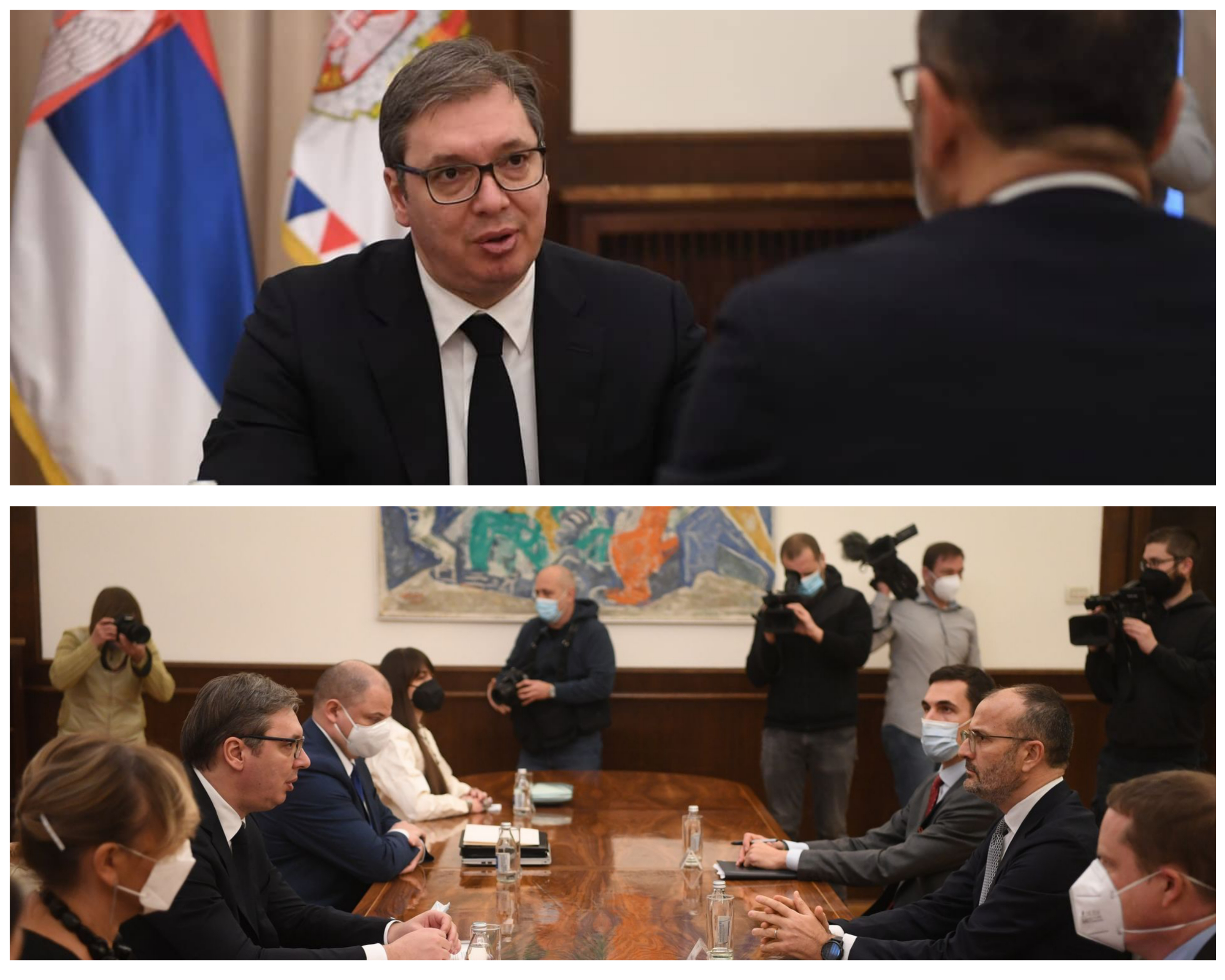
President of the Republic of Serbia Aleksandar Vučić met earlier today with the Head of the Delegation of the European Union to Serbia, Ambassador Sem Fabrizi, to discuss Serbia's European path, continuation fight against the COVID-19 pandemic, implementation of political and economic reforms, with particular emphasis on the rule of law and plans for new EU investments in our country.
President Vučić thanked the EU for its support to Serbia in structural reforms and economic measures and the EU investments in our country. The President especially expressed hope that the first contingents of vaccines from the COVAX programme promoted by the European Union will arrive soon.
"Serbia was among the first to join this programme, thus showing once again that it is a serious and reliable partner of the European Union. I am convinced that together, with solidarity and mutual understanding, we will manage to get out of this crisis and continue working to recover the economy," said President Vučić, adding that the EU is the most important foreign trade and investment partner of our country since two-thirds of our trade and investments are related to EU countries.
The Head of the EU Delegation, Sem Fabrizi, affirmed that the EU will continue with solidarity to the fullest extent and that it will continuously work on ensuring the distribution of vaccines both in Serbia and in the Western Balkans countries. He expressed satisfaction with the Government of Serbia's results, especially emphasising that timely and decisive measures taken in the fight against the coronavirus contributed to maintaining the country's economic stability during the pandemic.
"Thanks to the current structural reforms, Serbia, in line with the accession process, has shown resilience to the crisis and the ability to mitigate the effects on the economy with excellent results in the healthcare area", Sem Fabrizi said, stressing that the pandemic did not affect the undoubted commitment of the Western Balkans to the EU process.
Ambassador Fabrizi also introduced President Vučić to the new head of the EIB's Office for the Western Balkans, Alessandro Bragonzi, who pointed out that it was a great honour for him to take over activities for the region at a time when it is facing such a difficult crisis.
The European Investment Bank invested 873 million euros in the Western Balkans during 2020, which is about 50 per cent more than in the previous year. Most of the assets, i.e. 531 million euros, are in line with the European Union's priorities for increasing connectivity and has been invested in the construction and modernisation of transportation infrastructure in the region.
"Serbia will continue its outstanding cooperation with the EIB, as we are strongly committed to building an economy based on sound and solid foundations, as well as on innovation and all other projects supported by the EIB so far, which have undoubtedly contributed to our good economic results in 2020", said President Vučić and pointed out that further improvement of the health system in Serbia, development of the infrastructure network and implementation of the green and digital agenda remain key priorities of Serbia. The President also expressed hope that with the EIB's support, the planned projects will be successfully completed.
"Following this commitment, Serbia is determined to create an even more favourable business climate with additional packages of subsidies for the investors from the EU who want to invest in our country", said President Vučić.
"The European Union and the European Investment Bank, with the approach of 'Team Europe', support Serbia's strategic goals, including in the field of connectivity, environment and energy and work on priority projects such as reconstruction and construction of an additional building of the Clinical Centre of Serbia, reconstruction of the Clinical Centre Vojvodina, modernisation of railway infrastructure, gas interconnector from Bulgaria, Mir highway and Corridor 10", said Ambassador Fabrizi and expressed the EU's readiness to continue with investments that will encourage further economic growth of Serbia, which are at the heart of the new EU economic and investment plan for the Western Balkans.
He said that Serbia must continue its European path and that further support of the Union in strengthening, adopting and implementing reforms is critical, for the benefit of the citizens.
"We will continue to work intensively on fulfilling the European agenda, aimed at opening new chapters and faster progress on the path to EU membership", concluded President Vučić.
President Vučić and Ambassador Fabrizi discussed the process of harmonising Serbia's legislation with the legislation of the European Union and agreed that more energetic work is needed in the area of the rule of law.
The two interlocutors also discussed judicial reform, the fight against corruption, media freedom and the resumption of inter-party dialogue.
Ambassador Fabrizi and President Vučić confirmed the importance of continuing the EU facilitated dialogue with Priština.
|
|
|
| Minister Selaković: Serbia is committed to the values of the Adriatic and Ionian Initiative |
|
28 January 2021
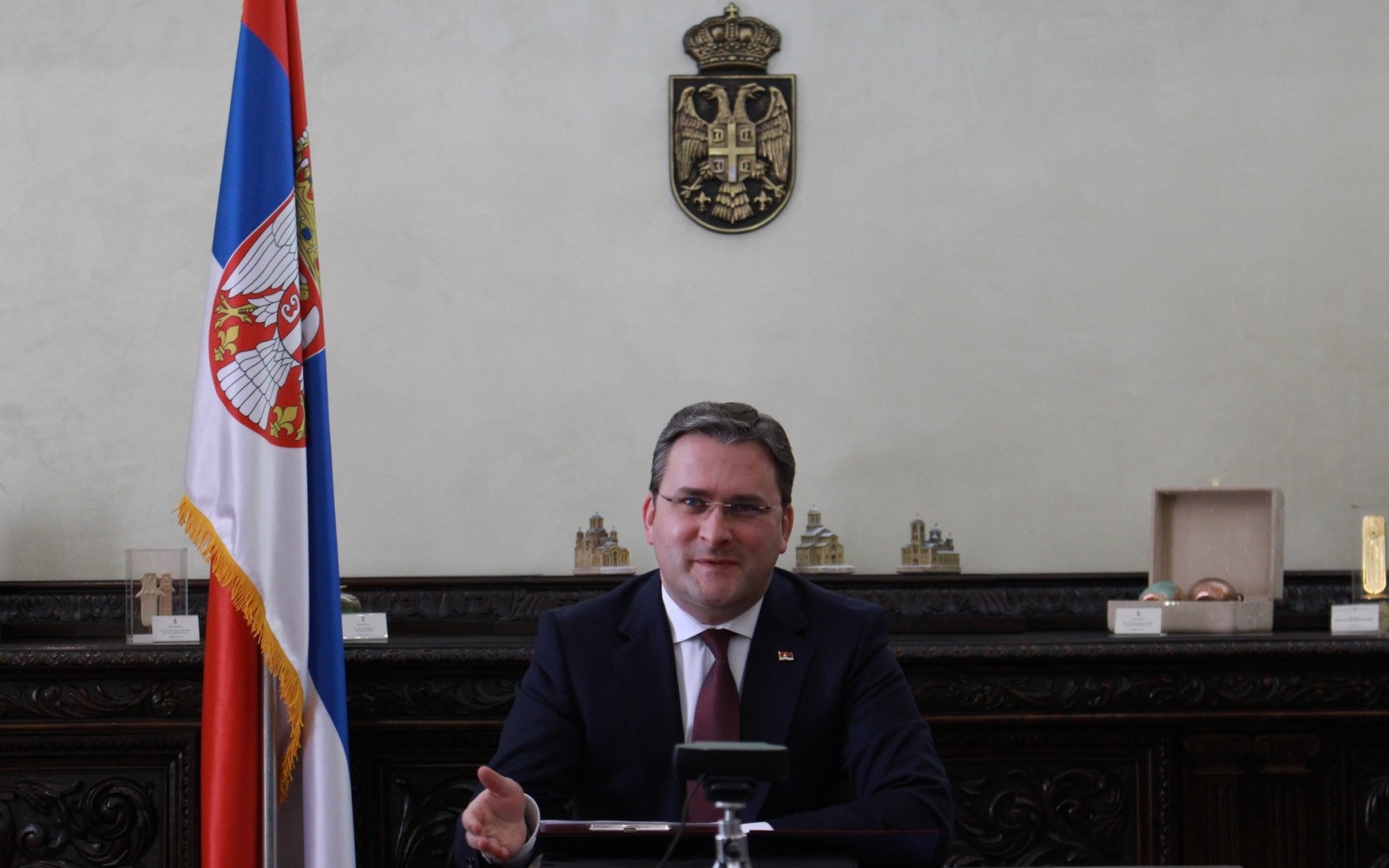
Serbia is committed to the values of the Adriatic and Ionian Initiative and its corresponding Strategy, as a framework within which we conduct activities that strengthen the European path of our country, all the while creating an even better place to live in together with the participating EU Member States, Minister of Foreign Affairs Nikola Selaković said at the video-conference of the Fifth Forum of the EU Strategy for the Adriatic and Ionian Region.
"Despite the difficult challenges faced amid the coronavirus pandemic, during its Chairmanship of the Adriatic and Ionian Initiative, Serbia succeeded in maintaining continuity in the implementation of the fundamental values adopted by signing the Ancona Declaration", Minister Selaković stated today.
The Serbian Foreign Minister said that our country was committed to the values of the Adriatic and Ionian Initiative (AII) and that when its assumed its yearlong Presidency of the Initiative and Chairmanship of the EU Strategy for the Adriatic and Ionian Region, it had ambitious plans - first and foremost, Serbia had planned to continue to deepen cooperation in the framework of the Adriatic and Ionian region
The Minister explained that, through joint efforts, concurrently with the traditional activities, Serbia managed to continue pursuing the so-called new activities launched during the previous chairmanship.
"The process aimed at expanding AII participation demonstrated in last year’s Budva Declaration, and the admission of North Macedonia and of San Marino to membership of the Initiative successfully continued during the chairmanship of the Republic of Serbia too", Selaković said.
Minister Selaković pointed out that, during its AII Presidency, Serbia built on the experiences of previous chairs and that it closely cooperated with the incoming Slovenian Chairmanship, counting on the support and expertise of the Permanent Secretariat of the Adriatic and Ionian Initiative seated in Ancona. The Minister thanked the AII Secretariat, on behalf of our country, for evaluating Serbia’s Chairmanship-in-Office in this report as “successful and dynamic”.
"We planned to bring the Serbian AII Presidency/EUSAIR Chairmanship to an end at the 5th Annual Forum and due to generous support of the European Commission and the extremely constructive approach of the current Chair – Slovenia, we are having the 5th Forum these very days", Selaković said.
The Minister pointed out that the pandemic had grown into an unprecedented threat to all of the participating countries of the Adriatic and Ionian Initiative and to the Adriatic and Ionian region as a whole, which is why they were all forced to impose protective measures, at the time when Serbia, fully supported by the AII Secretariat, had already carried out 17 out of the 35 activities envisaged in the chairmanship Calendar of Events.
"The pandemic happened just as the Chamber of Commerce and Industry of Serbia, having become a regular member of the Forum of the Adriatic and Ionian Chambers of Commerce at the beginning of Serbian chairmanship, was ready to organize a number of events aimed at the solidification of our mutual cooperation", the Serbian Foreign Minister underlined.
Minister Selaković concluded his statement by expressing unequivocal readiness for further cooperation with all participating countries of the Adriatic and Ionian Initiative and wishing the Slovenian colleagues a lot of success in implementing the tasks envisaged during their current Chairmanship.
|
|
|
| Government focuses on reforms in field of rule of law |
|
Belgrade, 21 January 2021
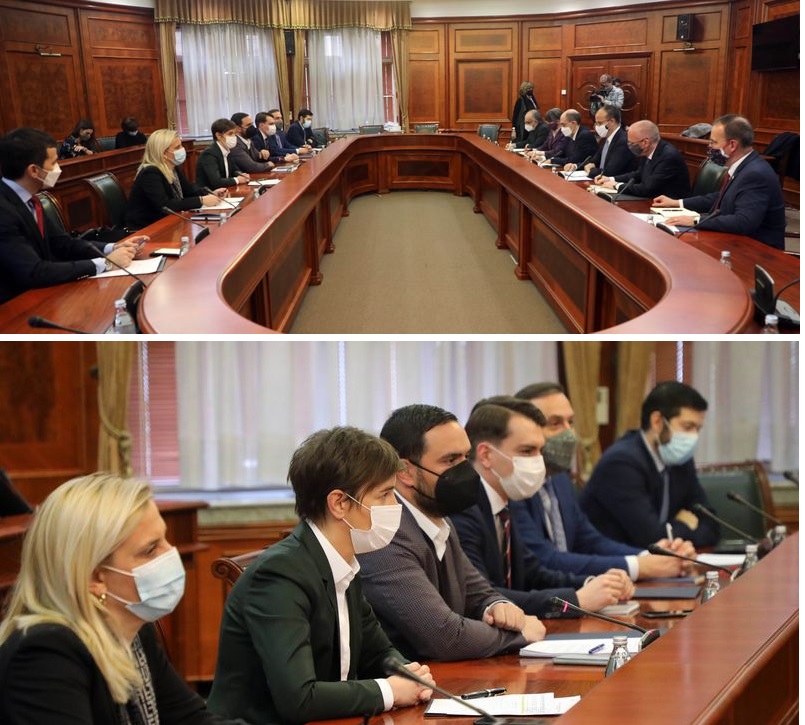
Prime Minister Ana Brnabić talked today with the ambassadors of the Quint countries and the Head of the European Union Delegation about the continuation of reforms on Serbia's path to membership in the European Union.
Brnabić confirmed that full membership in the EU remains a key foreign policy priority of Serbia, emphasizing that reforms in the area of the rule of law are in the focus of the government of Serbia.
She pointed out that Serbia is sincerely committed to the implementation of radical reforms in the field of justice, the fight against corruption, the strengthening of independent institutions and the freedom of the media, and added that much has already been done in practice.
The Prime Minister informed the ambassadors of the Quint countries and the Head of the EU Delegation about the concrete measures that the government of Serbia has taken so far in the area of the rule of law, and pointed to the further fulfilment of the GRECO recommendations.
According to her, the initiative to amend the Constitution was adopted and forwarded to the National Assembly, new members of the State Prosecutors' Council were elected, and work is underway to establish a unified and centralised case management system.
The state is working on further strengthening the cooperation with independent bodies and institutions, as well as on improving election conditions, among other things, by forming a working group for the improvement of election conditions.
She pointed out that, when it comes to media freedom, the government has adopted the Action Plan for the implementation of the Media Strategy and formed the Working Group for the Safety of Journalists.
The ambassadors of the Quint countries welcomed the measures implemented by the government of Serbia, assessing that these are encouraging steps in the right direction and represent the basis for accelerating the accession process.
Brnabić expressed the expectation that the reforms that are being implemented will be recognised and adequately evaluated, and that in 2021, accession negotiations with Serbia will be accelerated. |
|
|
| President Vucic: Serbia is the first in Europe in terms of growth |
|
Belgrade,12 January 2021
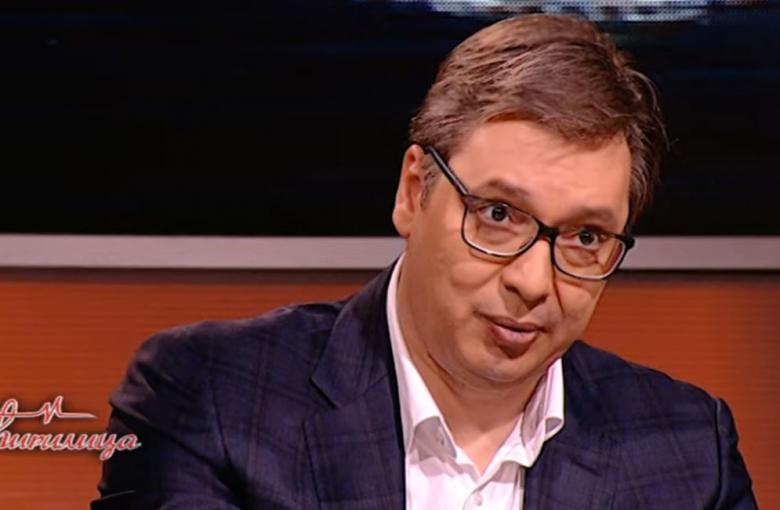
Serbian President Aleksandar Vucic pointed out that Serbia is the first in Europe in terms of economic growth, which will be officially confirmed at the end of March, and that this was possible owing to the reform measures taken since 2014 and the rapid opening of the country after the first wave of corona virus.
The President pointed out that Serbia had a growth of 5.2 percent in the first quarter, while the Eurozone was at minus 3.2 percent, in the second quarter Serbia had a growth of minus 6.3 percent, while the Eurozone was at minus 14.7 percent, and in the third quarter, when the Eurozone was at minus 4.3 percent, Serbia's figure was only minus 1.4 percent.
Vucic stated that Montenegro, for example, recorded as much as 26 percent minus in the third quarter.
Furthermore, the President emphasized that hospitals were built and renovated in our country, and that two hospitals were built from the ground up in just four months.
He said that the state made significant efforts to procure respirators, masks, gloves, protective suits, medicines, everything that was needed, and pointed out that work was being done on 10 general hospitals throughout Serbia, adding that all these were major achievements that were only possible owing to the success of the 2014 reforms, the enactment of the Labor Law, which yielded excellent results, and also through fiscal consolidation measures.
"These are unprecedented results for Serbia. Was Serbia ever before the first in Europe in terms of growth rate? We will get the results on 31 March that will confirm that Serbia is number one in Europe. All that was possible thanks to people who believed in difficult changes", Vucic said.
According to the President, this year, as many as six highways will be built in Serbia at the same time, and in this regard, he noted that Bulgaria has announced that the highway from our border to Sofia will be completed by the end of the year, after which it will be possible to use motorway to travel to Istanbul, which is very important to ensure that our country is on a transport route.
President Vucic emphasized that in 2020, the so-called year of corona, our country had a net inflow of foreign direct investment amounting to EUR 2.9 billion net, and three billion gross, which means that many foreign companies such as Toyota Tires, Boysen, ZTF and Brose have invested in Serbia even in this year of crisis.
The President said that Serbia has the highest average wages in the region, amounting to 511 or 512 euros, and that in February, due to the January increase, the average wage will be 535 or 536 euros, and that only in Belgrade in the last seven years the average wage increased by 180 euros or 40 percent.
That President said that Serbia was fourth in the region in terms of salaries before, and that today we are officially the first, and that the difference in relation to other countries will only increase faster. He also pointed out that the employment rate is growing in Serbia as well as that our public debt increased less than in most European countries. This is illustrated by the data that in Italy the public debt surged to 156 percent, in Germany to 87 percent, in France to 114 percent, in Croatia to 88 percent, while in Serbia it is at 57 percent.
The Serbian President announced that by Sretenje, 15 February, an additional package of assistance to the economy will be earmarked, and as he explained, it will be a new capital injection for companies, the trade, entrepreneurs, small, medium and large enterprises which, as he said, concerns 1,052,000 people within that system.
Vucic specified that it will most likely be help in the form of two or three payments amounting to half a minimum wage each, and that there will also be sectoral aid for tourism, hotel owners, travel agencies, guides, for bus carriers, through another half minimum wage payment.
The President added that efforts will be made to extend the guarantee schemes as well, which proved to be excellent, amounting to 1.5 billion, and this time, through the same system, two more portions amounting to 500 million each could be provided.
Vucic said that the first agreements with DFC worth 300 to 400 million dollars are expected in seven days.
He also stated that the state will endeavour to help pensioners further, in addition to increasing pensions by 5.9 percent in January, which will be reflected in their first checks in February, and added that pensioners should by March receive symbolic aid in the form of packages with vitamin C, D and zinc, which, as the President said, are small things, but they reflect the state's care and efforts made to protect health.
The President announced that negotiations on the procurement of the Chinese vaccine would be completed in the next seven to eight days, after the first quantities of the Pfizer and Sputnik V vaccines have arrived in Serbia, and pointed out that the Chinese vaccine was of exceptional quality, but probably the most expensive, which is why he wrote to the Chinese President and asked for a discount for our country.
Vucic thanked the Americans for deciding to sell the vaccine to our country and noted that no one in the region other than Serbia has received it, except for the small quantity that Albania got.
He pointed out that our state relied on itself and its own capacities, and that our state leadership anticipated that vaccines within the European COVAX plan would arrive late.
The President rejected the claims about bad results of Serbia in the fight against the corona virus and stated that our country has recorded the lowest corona virus mortality rate in the region.
He presented statistical information indicating that Slovenia had 144 deaths per 100,000 inhabitants, North Macedonia 126, Bosnia and Herzegovina 123, Bulgaria 115, Montenegro 115, Hungary 110, Croatia 107, Romania 85, and Serbia 51.
"The mortality rate in the region is as follows: Bulgaria 3.9, Bosnia and Herzegovina 3.7, Hungary 3.11, North Macedonia 3.03, Romania 2.48. Slovenia 2.15, Croatia 1.99, Montenegro 1.4, and Serbia 1.0. This can be seen in the graphs and is no fabrication", the President stressed.
He said that the state will fight for vaccines, and that only Serbia, in the Western Balkans, received significant quantities of vaccines, other than a smaller quantity that Albania received, and added that in one day since the registration for vaccination opened, as many as 63,000 persons have registered.
President Vucic expressed his belief that the year ahead will be better than the previous one as well as that the corona virus will be defeated through vaccination of citizens.
|
|
|
| President Vucic: Serbia to remain on the course of a winning policy of stability |
|
29. december 2020
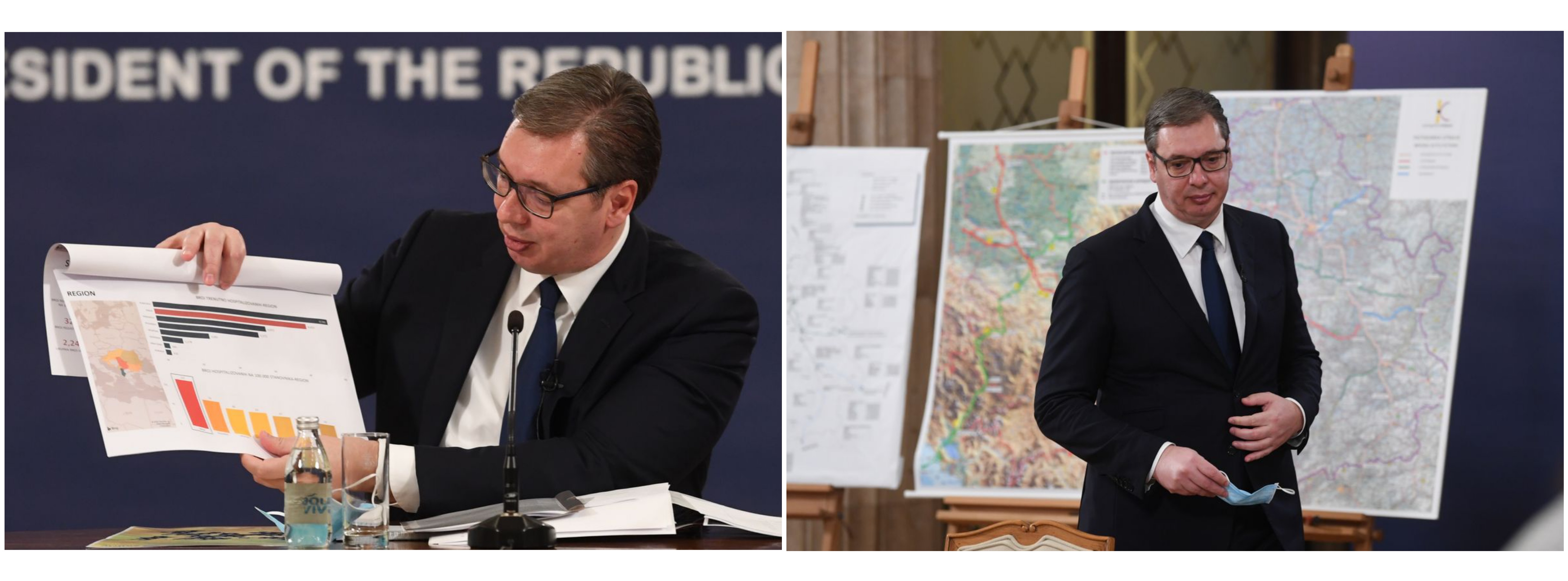
Preservation of peace, taking care of the health and better living standard are key for Serbia in 2021, underlined President of the Republic Aleksandar Vucic, convinced that even though the completion of this ambitious and by no means easy task will be anything but straightforward, best results can be achieved by working in concert with the Government, while ensuring security and a future of certainty for the citizens.
The President said that Serbia has set for itself great and ambitious goals for the next year, notwithstanding the complex international and regional circumstances, and that it will endeavour to fully preserve peace and stability in the region and the country, while safeguarding the vital national and state interests.
"Serbia will remain on the course of a winning policy - the policy of stability", President Vucic said and stressed that our country remains on the European integration path and that it will carefully foster its friendship with Russia and China, while building a friendship with the United States as well.
According to the President, Serbia will continue to pursue a winning policy, with the country itself as a top priority, i.e., a policy that will enable Serbia to continue being one of the top three countries in Europe in terms of growth rate in the next two years.
A precondition for that, the President noted, is to crack down on criminal groups, but also to ensure even bigger investments in the police and army forces.
"Serbia is the country that recorded the highest growth in Europe in 2020", the President pointed out at the annual press conference and added that he expects to conclude a new arrangement with the IMF, as well as that Serbia, by the end of next year or early 2022, will raise its credit rating to an "investment" one, which will put our country's rating on par with the most developed EU countries.
As the greatest success in 2020, Vucic noted that Serbia will end the year with the highest growth rate in Europe, which, as he said, is expected to be from minus 0.75 percent to minus one.
"I am proud to be the President of a country that is the European champion in terms of GDP", Vucic pointed out and added that German Chancellor Angela Merkel was also pleased with Serbia's success.
According to President Vucic, this result will encourage Serbia to accelerate its European path, while continuing friendships with those who did not turn their backs on Serbia when it was at its darkest hour, namely Russia and China.
The President pointed out that the activities to attract foreign investors will continue, then that work will be done on investments in agriculture, primarily the food industry, new machinery, and digitalization of agriculture.
President Vucic also emphasized that the goal is for salaries in the public sector to average between 560 and 570 euros by the end of the year. Only in Belgrade, the average salary would be around 700 euros.
President Vucic reminded that the salaries of health care workers will increase by five percent from January 1, while the salaries of others in the public sector will increase by 3.5 percent and an additional 1.5 percent as of April 1, while corporal, private first class and non-commissioned officer army ranks will get an increase of an additional 10 percent. He noted that the minimum wage will be increased by 6.6 percent and so will pensions from January 1, by 5.9 percent, with the plan that the average pension amounts to 270 euros by the end of 2021. The President especially pointed out investments in health care, reminding that two new covid hospitals have been opened and that the renovation and construction of health facilities continues throughout Serbia, while stressing that Serbia is by far the first in the region in terms of hospitalized persons per 100,000 citizens, which is why it has recorded a low mortality rate , and also that Serbia this year has been among the top three countries in the region according to the number of PCR tests performed.
Speaking about tourism, the President said that, next year, efforts will be made on the development of the Danube basin region, from Apatin to Kladovo, that the Ovcar-Kablar Gorge will be developed, as well as our mountain centers.
Discussing the field of culture and information, President Vucic said that the implementation of the media strategy and the completion of the reconstruction of the National Theater in Subotica are important for next year, and he announced investments in museums, especially emphasizing the relocation of the History Museum to the train station building. He also stated that the floor heating in the Church of Saint Sava will be completed next year.
He pointed out that the state will continue to take care of our citizens in Kosovo and Metohija, that no one can forbid Serbia to help its people, and that Serbia will not give up on helping our people.
As he emphasized, Serbia is ready to send medicines and vaccines to the Albanian population as well, and pointed out that in the upcoming period our country will pursue a policy of peace in the region and will endeavour to cooperate with Zagreb, Sarajevo, Podgorica and others.
|
|
|
| Serbian Prime Minister the first PM in Europe to receive a Covid-19 vaccine |
|
Belgrade,24 December 2020
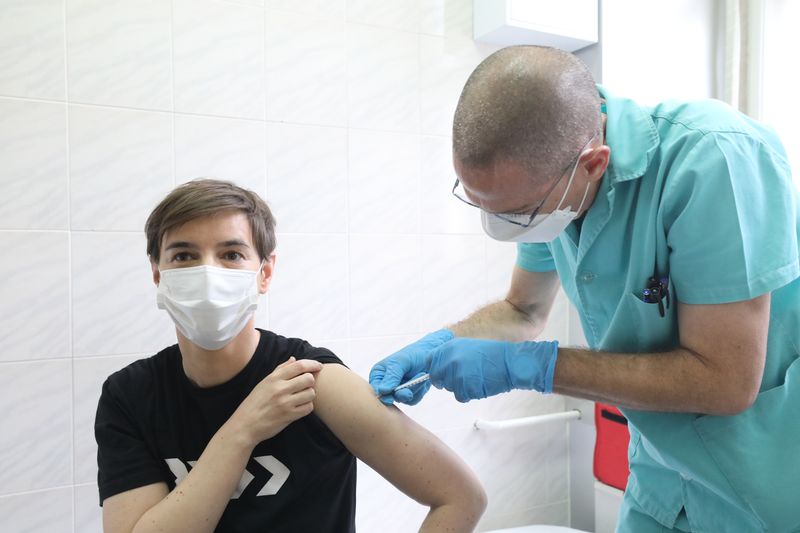
Prime Minister of the Republic of Serbia Ana Brnabic received today the first vaccine against the coronavirus made by Pfizer company, at the Torlak Institute of Virology, Vaccines and Sera.
Brnabic, who is the first European Prime Minister to receive the vaccine, pointed out that this day may be the first since 6 March that we have a reason for a smile on our faces as it marks the beginning of the end of the coronavirus pandemic in Serbia, but also in Europe and the world.
As Prime Minister and as someone who leads the COVID-19 Crisis Response Team, I felt obliged to be the first to receive the vaccine, to show that we believe in it, as well as in our institutions - the Medicines and Medical Devices Agency of Serbia and experts who worked round the clock to test the vaccine, she said.
Underlining that it was an honour to do this for her country and be the first to pave the way for all citizens, the Prime Minister said that she agreed with President of the Republic AleksandarVucic that the two of them receive different vaccines, so he will most likely receive the next one that arrives, most probably the one produced by China.
At the moment we have the Pfizer-BioNTech consortium vaccine, and the vaccines from the Chinese Sinopharm are expected in the near future, as well as certain quantities of the Russian vaccine Sputnik V.
She expressed her belief that at the end of the first quarter or the beginning of the second quarter of next year we will have the vaccine of the company AstraZeneca, and after that the vaccine manufactured by Moderna.
As we promised, all vaccines licensed in their countries and approved by relevant international agencies will be available to our citizens, and of course they will be tested by all of our agencies and institutes as well, the Prime Minister pointed out.
She said that prior to the vaccination of health care workers, Minister of Health ZlatiborLoncar will also receive a vaccine shot as we endeavour to serve as an example and show how confident we are in the vaccines and institutions.
Brnabic pointed out that Serbia, not counting Great Britain, is the first country in Europe to receive the Pfizer-BioNTech vaccine, and the third to start a mass immunization and campaign for giving the vaccine - after Great Britain and Switzerland.
We achieved something very important and we will not stop even for a moment until the immunization of the population is completed, the Prime Minister said.
She specified that our country will receive another 16,000 doses of Pfizer-BioNTech vaccine in January, as well as that together with other vaccines we will have a total of one million doses in January, and a total of approximately two million doses during the first quarter of next year.
There is a dynamic on which Pfizer delivers vaccines and it varies dependingon the production, and this is the case with deliveries to both Serbia and all other countries worldwide. We expected to receive 10,000 doses from Pfizer-BioNTech in December, however 4,807 doses arrived, the Prime Minister explained.
Serbia demonstrated that it is able to fight and succeed if we all work as a team, Brnabic said and called on all not to see the beginning of vaccination as the end of the fight already, but to continue to apply all measures instead.
This is to be certain and to be able to help our health care workers, and once the immunity is acquired we will be able to slowly start taking off the masksin 2021, but until then we should not see this as a victory but as the beginning of the end, the Prime Minister concluded.
After the Prime Minister, vaccine shotswere also administered to the Minister of Labour, Employment, Veteran and Social Affairs and a member of the COVID-19 Crisis Response TeamDarijaKisicTepavcevicand to PredragKon who is also on the COVID-19 Crisis Response Team.
Furthermore, vaccine shotswere also given to Head of the MMA Department for the Prevention and Control of Nosocomial Infections prof. Dr. VesnaSuljagic and academician PredragPesko, professor of Belgrade and Heidelberg universities and full member of the Serbian Academy of Sciences and Arts.
The first quantities of the vaccine arrived in Serbia on 22 December, and today they will be administered to patrons of nursing homes in Belgrade and Novi Sad.
Serbia is the first country in the region to receive a shipment of Pfizer-BioNTech vaccine.
In addition to procuring the vaccine among the first countries in the world, even before EU countries, Serbia is one of the rare countries that managed to build and open two covid hospitals in record time. The hospitals with 930 beds in Batajnica and 500 beds in Krusevac are a major contribution to the expansion of capacities and strengthening the health care system in the fight against coronavirus and, as President Vucic said, represent a monument of the future, that will talk about the accomplishments the state made in a short time.
Also, we recall that investments in health infrastructure have been large in Serbia, and since 2016, 80 health centers and clinics have been renovated, and worksare underway onsix large health centers. This way more than EUR 200 million was invested in the reconstruction,construction and equipping of hospitals and more than 300 million in the renovation of clinics andspecialized hospitals, and many have already been completed, such as the University Children's HospitalTiršova, and KBC Zemunnad KBC "DragišaMišović" hospitals.
The absolute priority of the Serbian Government is the successful completion of health infrastructure projects that are underway, but great attention is also paid to health workers,
whose salaries have, by 2020, been increased by 56.8% for specialist doctors, and 66.9% for
nurses, while significant fundingis invested in the education of health professionals,as well as in equipment and working conditions.
Like other countries, Serbia has faced great challenges this year, most notably health challenges, and all factors in the state were focused on preventing the spread of the virusand safeguarding the lives and health of citizens. Serbia has faced these challenges better thanmany wealthier and more developed countries in Europe and the world.
|
|
|
| Minister Selakovic: Full EU membership remains a priority of the new Government |
|
Belgrade, 16 December 2020
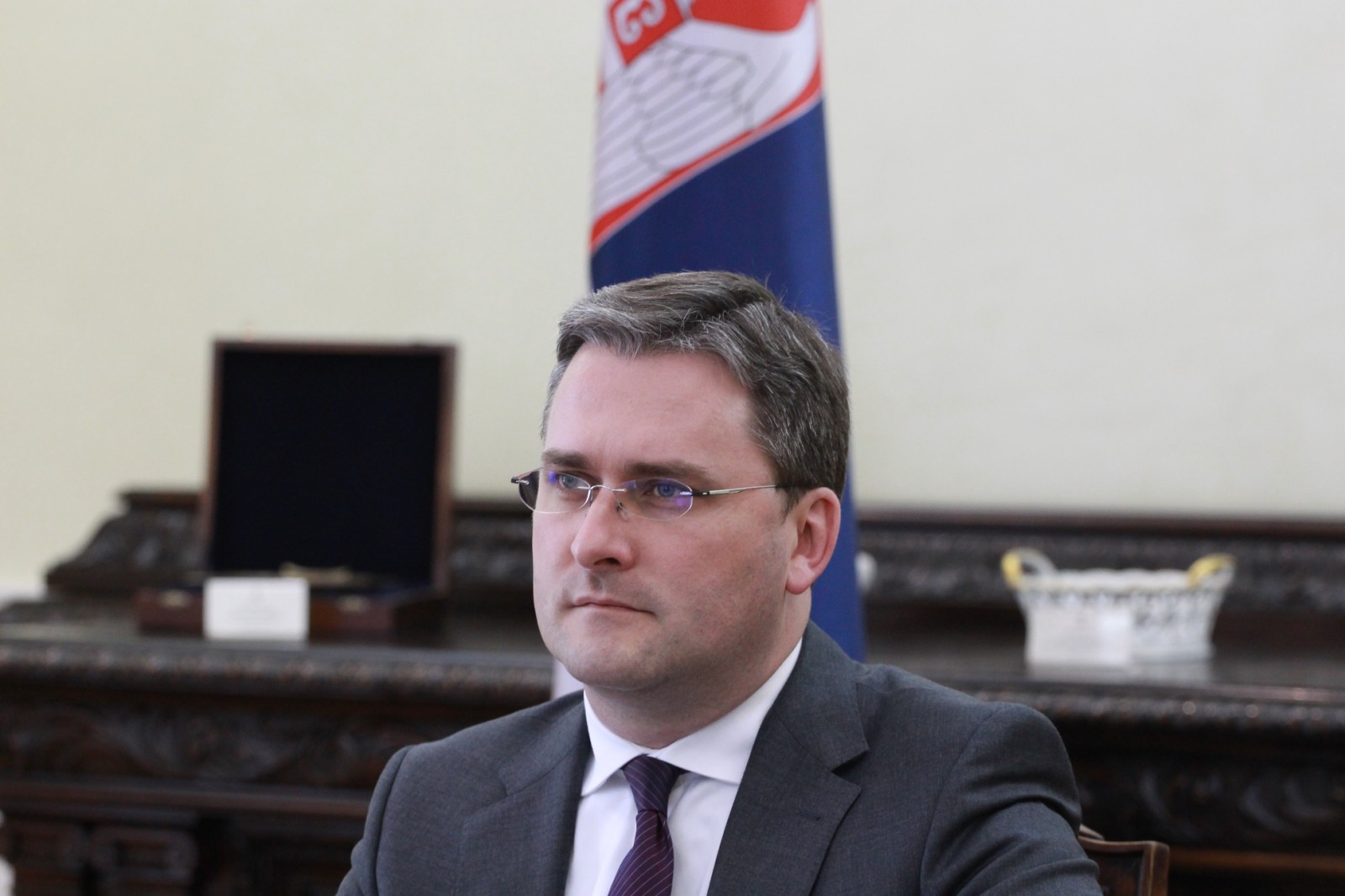
Minister of Foreign Affairs of the Republic of Serbia Nikola Selakovic had talks today via video link with Head of EU Delegation in Serbia Sem Fabrizi and Ambassadors of the EU Member States.
On this occasion, the Serbian Foreign Minister emphasized that full membership of the EU remained one of the key foreign policy priorities of the Serbian Government, and that the European integration process was a strategic goal also aimed at promoting the quality of the society.
Minister Selakovic pointed out that Serbia was ready for an acceleration of the accession process' dynamic which is why it accepted the new methodology in the first place, and that it is now hoping that it will, in the period ahead, receive clearer guidelines on its implementation in the negotiating process.
The Minister said that Serbia has taken a number of important steps forward in the reform process, which were not fully reflected in the European Commission's Annual Progress Report.
The Minister reminded that our country opened 18 out of 35 negotiating chapters with the EU since 2014, provisionally closing two, and that it is at this point ready to open five new chapters.
Discussing the talks between Belgrade and Pristina, Minister Selakovic noted that the only right path towards a sustainable agreement was through dialogue and compromise.
He explained that it was necessary that topics of the talks include the issues being ignored by Pristina for years, despite having committed to them under the Brussels Agreement, such as the establishment of the Community of Serb Municipalities.
The Minister added that Serbia is deeply devoted to regional cooperation and that, as an important country of the region aiming to contribute to overall stability, our side has through its steps, among others, significantly contributed to decreasing the tensions with Montenegro.
Minister Selakovic also said that Serbia was very grateful to the EU and its Member States for the financial assistance, particularly amid the coronavirus pandemic.
|
|
|
| Minister of Defence of the Italian Republic on a visit to Serbia: Strengthening cooperation in all areas on the basis of strategic partnership |
|
Belgrade, 15 December 2020
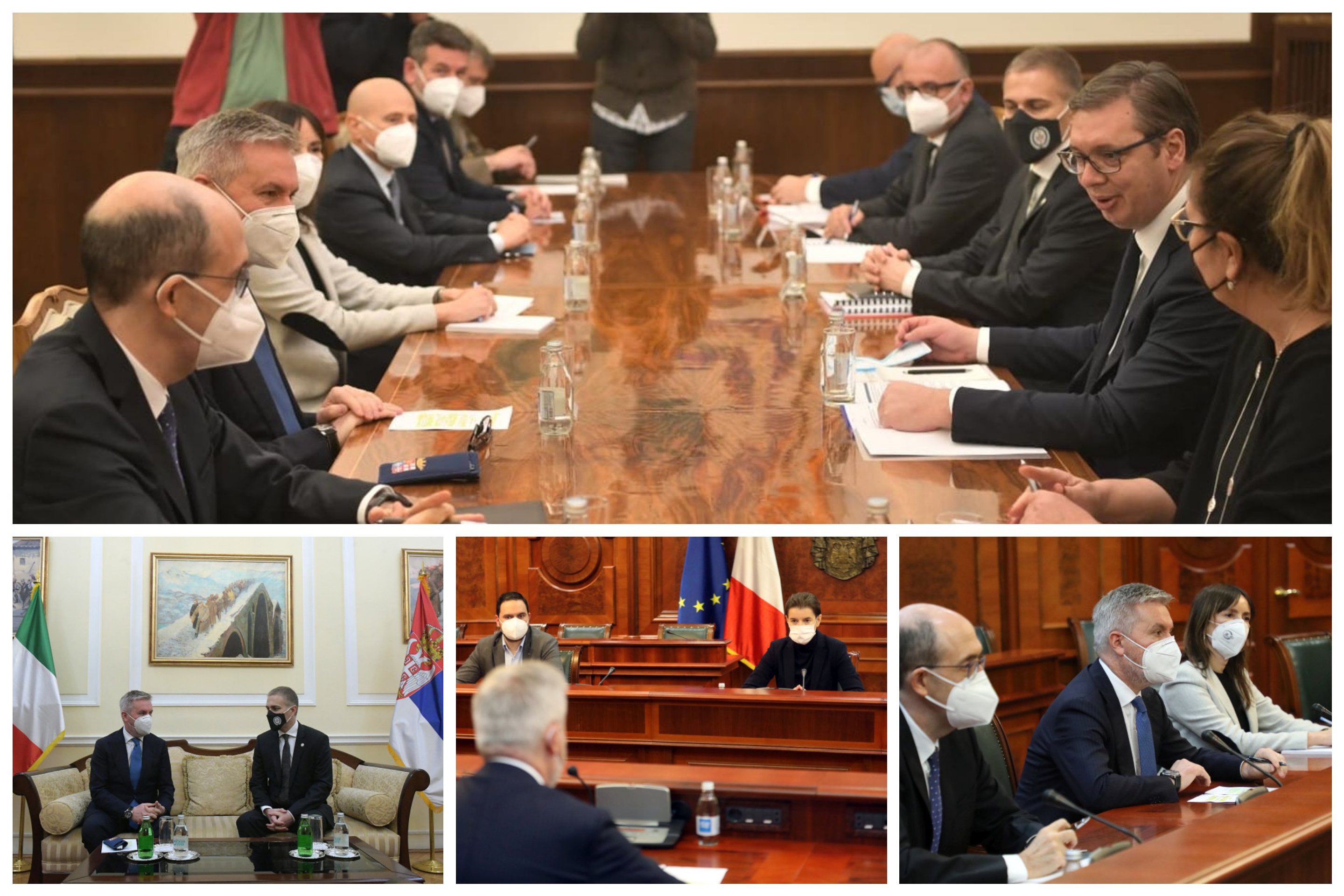
Minister of Defence of the Italian Republic Lorenzo Guerini paid a visit to Serbia, meeting with the country's high officials.
In the meeting between the President of the Republic of Serbia Aleksandar Vucic and Minister Guerini the collocutors noted that the two countries have stable, friendly bilateral relations and intensive cooperation in all crucial areas in line with the strategic partnership established between them. They expressed the expectation that the circumstances will soon allow a new joint session of the two Governments to be held.
President Vucic thanked the Italian soldiers who, within KFOR, have an essential role in maintaining peace and stability, as well as in protecting Serbs and other non-Albanian communities in Kosovo and Metohija. The President emphasized that their behaviour and actions, especially in preserving the Visoki Decani monastery, gained the trust of the Serbian population. He also welcomed the professionalism of the Italian generals, who have been in command of the international security forces since 2013.
President Vucic expressed concern over the existing tensions in the region and said that the most important thing was to preserve peace and stability. Minister Guerini emphasized that Italy considered Serbia an essential country in the Western Balkans and welcomed the leadership of President Vucic and his role in maintaining peace and stability in the region. In this regard, he stressed the importance of the dialogue between Belgrade and Pristina and reaffirmed Italy's commitment to continue to contribute to security by acting impartially within KFOR.
President Vucic assessed that the cooperation in the field of defence remains to be substantial and that Serbia and Italy are carrying out a large number of joint activities, highlighting the participation of Serbian soldiers in the UN Mission in Lebanon within the Italian contingent.
Minister Guerini said that Italy appreciates the participation of the Serbian army personnel in UN- and EU-mandated peacekeeping missions around the world. He also expressed Italy's support for Serbia's European integration process, hoping that it would intensify.
President Vucic expressed gratitude for Italy's support to Serbia's European path, as well as satisfaction with the economic cooperation between the two countries, with the expectation that it could be increased in the coming years.
Minister Guerini conveyed the gratitude of the Government of Italy and Prime Minister Conte for the medical assistance that Serbia sent in the first phase of the fight against COVID-19. President Vucic sent greetings to President Mattarella and Prime Minister Conte and said that we very much appreciate the fact that Minister Guerini came to visit during the pandemic when such visits are rather rare.
In a meeting with Minister Guerini, Prime Minister of the Republic of Serbia Ana Brnabic assessed that the relations between Serbia and Italy are at the best possible level, emphasizing that economic and investment cooperation is of priority importance, because Italy has been one of the most important economic partners of Serbia for several years.
Guerini said that Serbia is key to maintaining peace and stability in the Western Balkans, emphasizing that Italy greatly appreciates Serbia's efforts to strengthen regional cooperation.
The Minister pointed out that Italy also appreciates the constructive approach of our country within the dialogue between Belgrade and Pristina, and added that Italy provides full support to Serbia on its European path.
The Prime Minister also expressed gratitude for the engagement of doctors and medical staff, which Italy sent to Serbia during the pandemic.
Deputy Prime Minister and Minister of Defence of the Republic of Serbia Nebojsa Stefanovic and Italian Minister of Defence Lorenzo Guerini assessed that the cooperation between the two countries had already reached a strategic partnership level.
Cooperation between the two countries in the field of defence is at an extremely high level, and today we talked about the possibilities of its further enhancement, the Deputy Prime Minister said.
Stefanovic also thanked Minister Guerini for years of Italian Armed Forces’ participation in KFOR mission, and especially for their protection of the Serbian population in the territory of Kosovo and Metohija.
Speaking about bilateral cooperation between Serbia and Italy in the field of defence, the Deputy Prime Minister recalled that 57 different activities were realized over the last four years.
|
|
|
| Brnabic and Borrell: Political and economic aspects of negotiations |
|
Belgrade, 17 December 2020
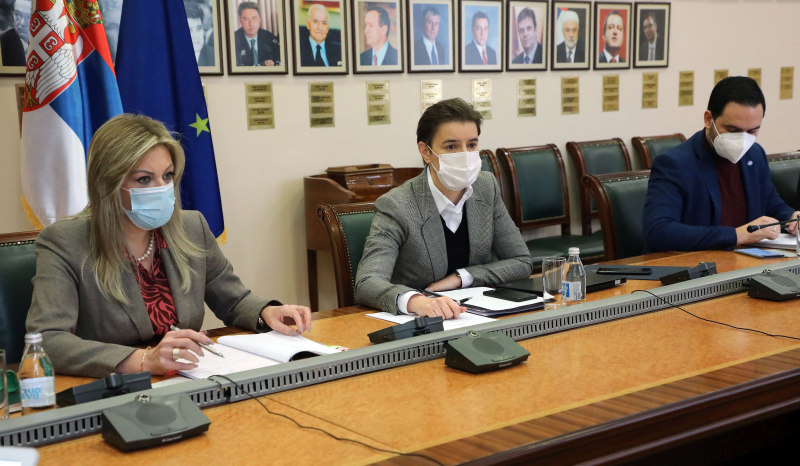
The Serbian government stated that at a meeting of the Stabilisation and Association Council between Serbia and the EU held today, the overall progress achieved in Serbia's accession negotiations so far was commended, as well as the adoption of an improved enlargement methodology that should accelerate Serbia's EU accession process.
The participants in the meeting exchanged opinions on the current political and socio-economic situation in Serbia, and above all on the further dynamics of negotiations on EU accession, cooperation within the Common Foreign and Security Policy, as well as regional cooperation in the Western Balkans.
Accordingly, they welcomed the fact that the new government has placed European integration, preserving public health and economic growth, as well as normalising relations with Pristina at the top of its priority list.
At the meeting held via video link due to the pandemic, the Serbian delegation was led by Prime Minister Ana Brnabic and Minister for European Integration Jadranka Joksimovic.
The EU delegation was headed by High Representative of the EU for Foreign Affairs and Security Policy Josep Borrell and European Commissioner for Enlargement Negotiations Oliver Varhelyi.
Borrell especially expressed gratitude for the participation of Prime Minister Brnabic, which is not the usual format, but which unequivocally shows how much importance the Serbian government attaches to the Stabilisation and Association Agreement and Serbia's European path.
The interlocutors discussed current relations between Serbia and the European Union, primarily the process of Serbia's accession to the EU, as well as political and economic criteria, harmonisation of domestic legislation with the EU acquis, as well as the implementation of the EU pre-accession assistance.
The EU representatives reiterated the EU's commitment to Serbia's European future and called for proactive and strategic communication between Serbia and the EU.
During the meeting, they also talked about the way in which Serbia is facing the consequences of the COVID-19 pandemic, both in terms of resolving the health crisis and in overcoming the consequences for the economy in general and the implementation of reforms.
The participants agreed that good neighbourly relations and regional cooperation are key elements of the enlargement process, and to that end welcomed the continued dialogue between Belgrade and Pristina and Serbia's consistent commitment to the process.
The EU representatives welcomed Serbia's significant contribution to military missions and operations, as well as Serbia's participation in EU battle groups, stressing the importance of further deepening cooperation on foreign policy issues.
The participants in the meeting also supported the Common Regional Market, launched by Western Balkan leaders at a summit in Sofia on 10 November, and recalled that the Western Balkans Economic and Investment Plan, adopted by the European Commission on 6 October 2020, provides a comprehensive framework to support economic convergence of Serbia and the EU region. |
|
|
| Jadranka Joksimović and Roth on Serbia’s negotiations and new methodology |
|
Belgrade, 11.12.2020.
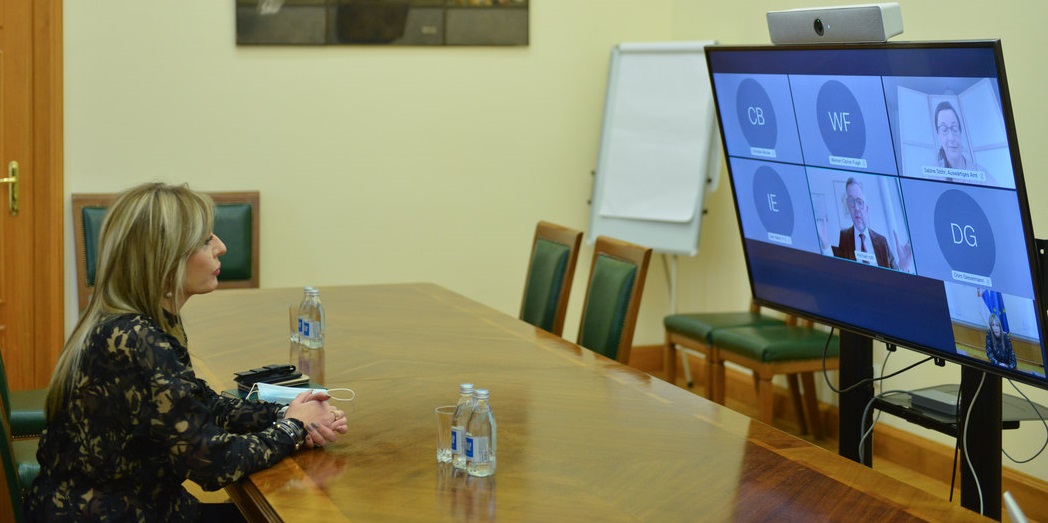
Minister of European Integration JadrankaJoksimović has held a video meeting today with Michael Roth, the Minister of State for Europe at the German Federal Foreign Office. They have discussed the current epidemiological situation in the two countries and the EU, as well as Serbia’s European integration process.
Joksimović and Roth have also talked about the issues related to the EU’s internal situation, particularly regarding the new seven-year budget, the place and the future of the enlargement policy and the Western Balkans, notably about all aspects of Serbia’s accession process, challenges and expectations from the new methodology, which should bring a faster negotiation process that would be better monitored and directed under stronger political steering.
Joksimović has particularly informed Roth about the fact that the Government of Serbia prepared a concrete implementation plan for the first negotiation cluster on the rule of law, which comprises five rule-of-law chapters that have already been opened, adding that the realisation of the plan has already begun.
“This serious implementation plan includes a repeated initiative sent to the National Assembly for the adoption of constitutional amendments, the adoption of the Action Plan for the implementation of the Media Strategy, as well as the Working Group on monitoring the implementation of the Action Plan and the Working Group on journalist safety and protection”, said Joksimović, according to the press release published by the Ministry of European Integration.
She has also stressed that GRECO recommendations for the fight against corruption have been published in a transparent way, and that further actions will be taken in line with them.
|
|
|
| President Aleksandar Vučić meets the ambassadors of the EU member states accredited to Serbia and the head of the European Union Delegation |
|
Belgrade, 8th December 2020
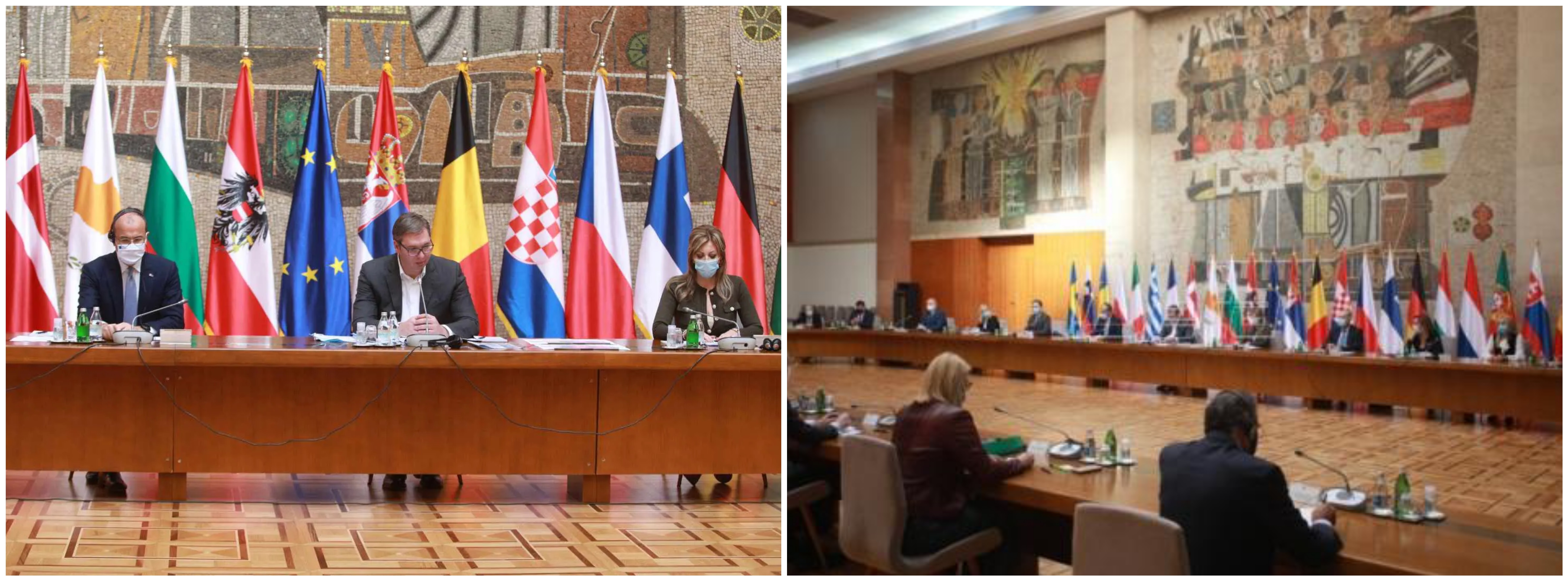
President meets the ambassadors of the EU member states accredited to Serbia and the head of the European Union Delegation
The President of the Republic of Serbia Aleksandar Vučić met today the ambassadors of EU Member States accredited to Serbia and the Head of the EU Delegation SemFabrizi in the Palace of Serbia, to talk to them about topics such as dynamics of the accession negotiations between Serbia and EU, stability in the region, regional projects, as well as the Economic and Investment Plan presented by the European Commission together with the Enlargement package.
President Vučić once again confirmed that cooperation with the European Union and fully-fledged membership of Serbia remain one of the key foreign policy priorities of our country. He particularly emphasised that in this respect Serbia is honestly dedicated to further and deeper reforms, approaching them with responsibility and seriousness, and that it tries to adopt and apply the best practice through cooperation with institutions of the EU and its member states.
"Serbia will continue being dedicated to the promotion of peace and stability in the region, by improving bilateral relations with neighbours, and by strengthening regional cooperation while respecting all concluded agreements", President Vučić stated, adding that the European future of the Western Balkans is of utmost importance for both stability of the entire region and security and further prosperity of the EU.
Ambassadors pointed out that declarations on the common regional market and the Western Balkans green agenda, which were signed by Serbia and all leaders of the region, received a warm welcome in Brussels and EU Member Stated, and that good and solid connectivity and integration of the region largely facilitates the cooperation of the very Union with the Western Balkans in all areas of joint interest.
"As much as 70% of foreign investments come from the countries whose representatives are sitting here today", Head of the EU Delegation to Serbia SemFabrizi said, adding that Serbia can rest assured the EU will continue supporting and investing in the Serbian economy. While Covid-19 has put all economies under stress, Serbian economy has resisted and proved its resilience. With the Economic and Investment Plan for the Western Balkans, the EU will remain Serbia's strongest partner for economic recovery which will support infrastructures, green and digital transition. We welcome the announced reforms in the areas of rule of law, including judiciary reforms and media freedom. This is precisely the base for acceleration of the accession process and we encourage the new government to keep working and implementing in this direction", Fabrizi said.
President Vučić pointed out that Serbia highly appreciates that the EU, despite numerous challenges it is facing has managed to preserve the enlargement issue on its agenda, especially through the recent adoption of a new, changed methodology of the negotiation process.
"In this respect, we expect from the EU that Serbia's accession negotiation dynamics follows and values our reform efforts", President Vučić said pointing out that Serbia is ready to continue working with its European partners on implementation of the reforms and numerous joint projects.
President Vučić particularly noted that Serbia welcomes the Economic and investment plan presented by the EC together with the Enlargement package, and expressed our country's readiness to continue working with the partners in the region on the implementation of this Plan so as to improve the economic potential of the region and achieve better infrastructure connection, which would bring us closer to the single European market.
"In this context, we hope the Multiannual financial framework 2021-2027 will be adopted soon, because that will mean a possibility to use funds designed for reform implementation in Serbia and in the region", President Vučić said, reiterating that Serbia remains on its European path with an honest faith in cooperation with the European partners.
"2020 has been an extremely difficult year for all, especially the impact of COVID–19. When I look at new Government's commitment to implement reforms, the Economic and Investment Plan of the EU, the new methodology and increased cooperation to fight COVID-19, I see 2021 with a much more favourable perspective for progressing the enlargement", Fabrizi concluded.
President Vučić also pointed out that Serbia is prepared to work intensively with the EU Member States on finding an adequate response to the new challenges, such as COVID-19 pandemic.
|
|
|
| Contact |
|
 |
|
|
|
|
|